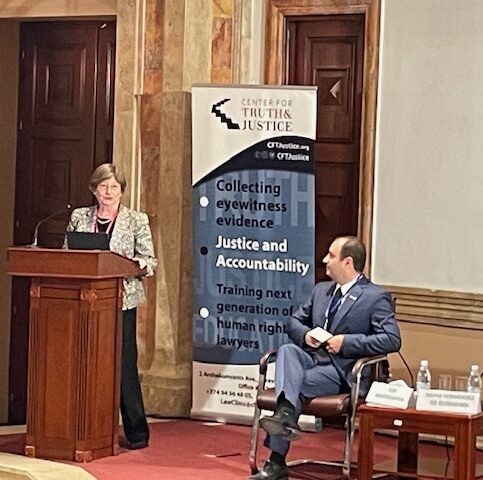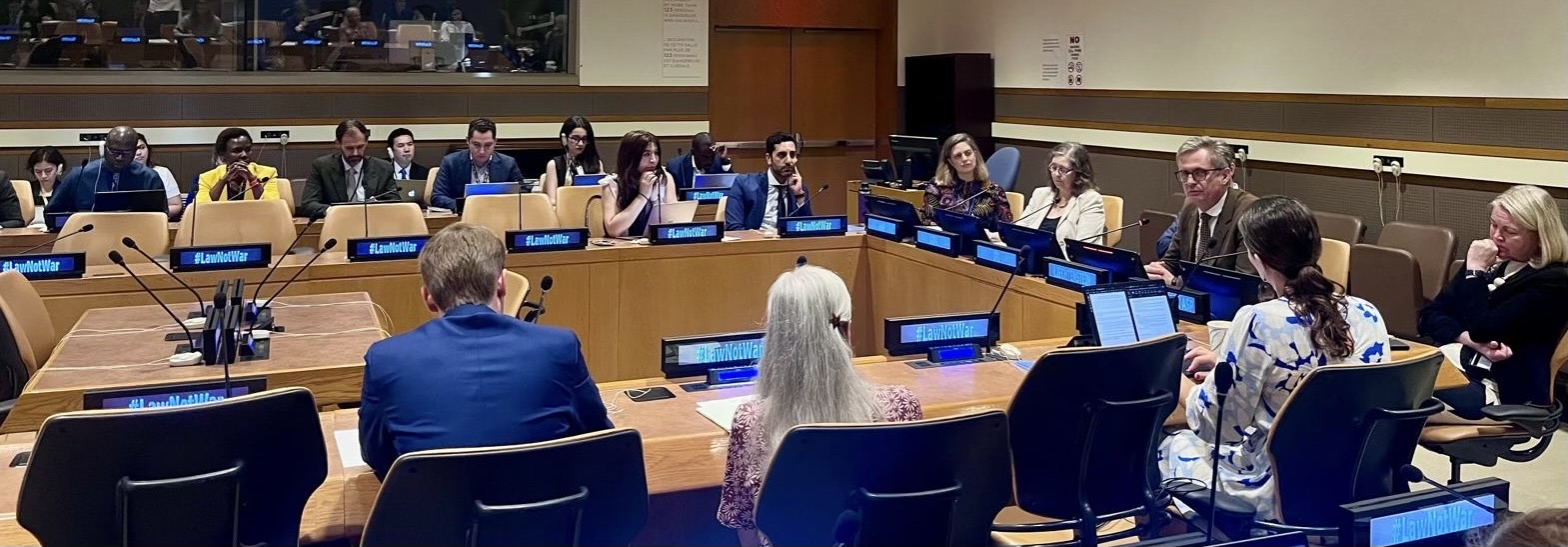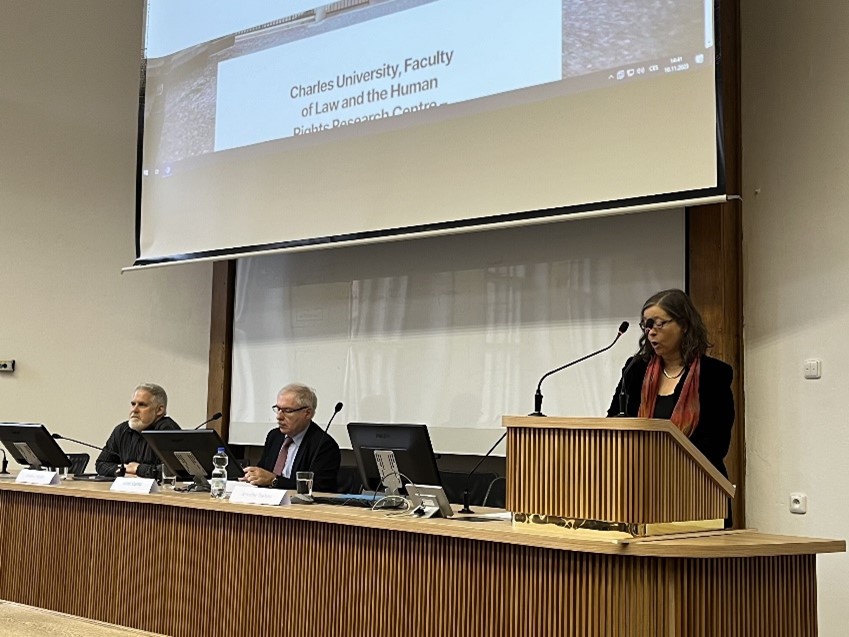Author Archives: Sina
LSE Kreß
LSE event “The crime of war: from the Nuremberg trial to Ukraine”: On 8 October 2025, GIPA member Professor Claus Kreß was invited to speak at the London School of Economics and Political Science about the prospects for international law and the crime of aggression after Ukraine and in the light of the historic first aggression trials at Nuremberg. The event was chaired by Professor Gerry Simpson (LSE), a former legal adviser at the ICC negotiations in Rome and at the UN. A video of this event is available here.
Panel at the United Nations: On 28 October 2025, GIPA Executive Council member Ambassador Christian Wenaweser and GIPA Convenor Professor Jennifer Trahan spoke on a panel entitled: “80 Years After Nuremberg and Tokyo: The Special Tribunal for the Crime of Aggression against Ukraine as a Building Block for a System to Support Peace and End Impunity for Starting Wars”. The panel was moderated by GIPA Council of Adviser member Dr. David Donat Cattin. Other panelists included Dr. Iryna Mudra (Deputy Head of the Office of the President of Ukraine), Lithuanian Ambassador Rytis Paulauskas, James Goldston (Open Society Justice Initiative), Jörg Polakiewicz (Legal Advice and Public International Law, Council of Europe), Lóránt Havas (European External Action Service) and Dr. Viviane Dittrich (International Nuremberg Principles
Academy). 
Symposium Issue Honoring the Life and Work of Benjamin B Ferencz:
Symposium Issue Honoring the Life and Work of Benjamin B Ferencz: The Cardozo International & Comparative Law Review dedicated its latest issue on the work of the co-founder of the Global Institute for the Prevention of Aggression (GIPA) Benjamin B. Ferencz. Five members of the GIPA were among the academics who contributed articles to the issue: Noah Weisbord described Ferencz’s worldview during the Cold War. Jennifer Trahan wrote about the limited jurisdiction of the ICC over the crime of aggression, an issue that Ferencz was deeply distressed by, and offered ways to amend it. David Donat Cattin explained the unique function of the crime against humanity of “other inhumane acts” in the progressive development and codification of ICL. Daniel D. Ntanda Nsereko explored the exceptions to head of state immunity. Gregory S. Gordon revisits the birth of ICL’s victim restoration-reparations regime to conceptualize its modern reform.
Seycelles becomes 49th State to accept Kampala amendments: The GIPA congratulates Seycelles on becoming the 49th State to accept the amendments on the crime of aggression on 1 July 2025.
Outcome of the Special Session
Outcome of the Special Session: The ICC’s Assembly of States Parties has punted on the idea of harmonizing the ICC’s jurisdiction over all four ICC crimes (expanding the jurisdiction over the crime of aggression). With states such as France, the UK, Canada, New Zealand and Japan blocking substantive progress, the meetings have been put off until an intersessional meeting in 2027 to be followed by a Special Session in 2029. The outcome represents a very significant missed opportunity and a huge disappointment to the majority of States Parties present that supported the amendment as well as civil society. For the resolution that passed on 9 July 2025, see here. GIPA members were advocating strongly for a different outcome and hope that States make use of the postponed opportunity for reform in 2029.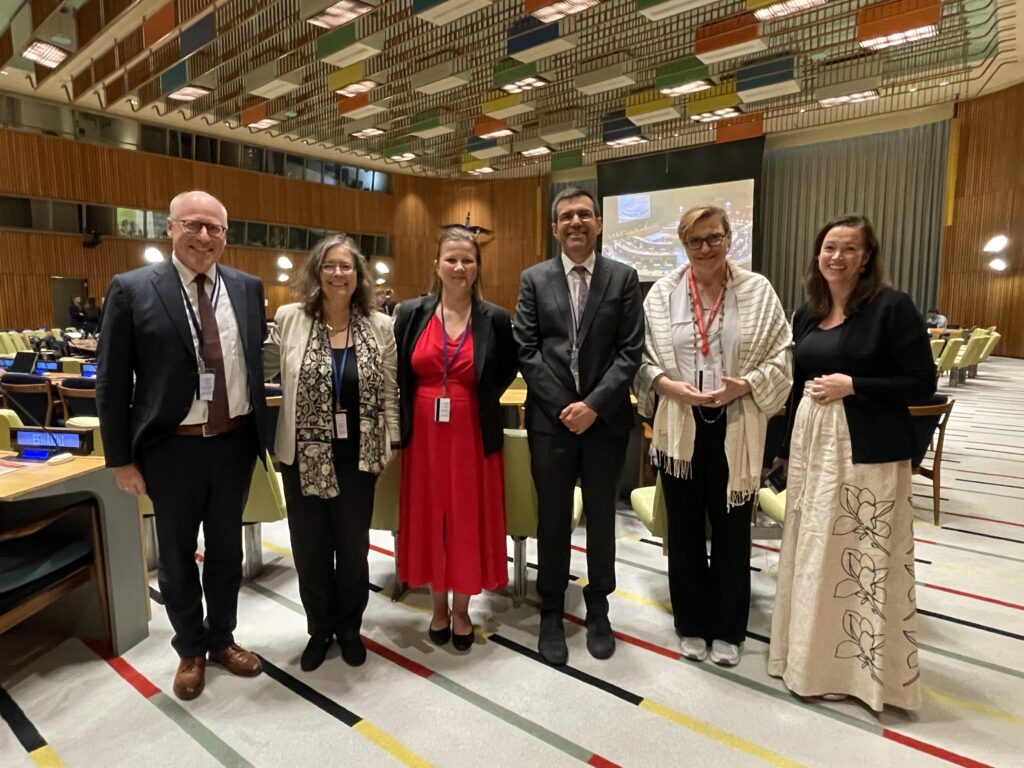
Remarks by the GIPA convenor to the ASP: On 7 July 2025, Prof. Jennifer Trahan delivered remarks on behalf of the GIPA to the Assembly of States Parties (ASP) during the opening plenary session. She called on states to reject selectivity and double-standards by adopting the text proposal restoring the Rome Statute’s article 12 jurisdiction to cover all four Rome Statute crimes. Two days later, States Parties did not manage to agree on substantive reform. They adopted a resolution that only postpones the urgent need for reform to a special session in 2029 in New York.
Side Event “Review of the Amendments on the Crime of Aggression”: On 8 July 2025, Africa Legal Aid (AFLA) hosted a side event on the review of the amendments on the crime of aggression at the headquarters of the United Nations. AFLA’s Executive Director Evelyn A Ankumah moderated the event. Franz Xaver Perrez, Director General, Directorate of International Law, Federal Department of Foreign Affairs of Switzerland, made the opening statement. Presentations were delivered by Samuel Mbemba Kabuya, Interim Minister of Justice and Keeper of the Seals of the DRC, Dr. Dominic Akuritinga-Ayine, Attorney General and Minister of Justice of Ghana, Edrick Noah, Assistant Minister, Administration and Public Safety, Ministry of Justice of Liberia, and Jennifer Trahan, Convenor of the GIPA. 
Seminar of Legal Advisors and International Law Experts on the Crime of Aggression: On 8 July 2025, experts of the Global Institute for the Prevention of Aggression offered a seminar and engaged in discussions with state representatives at the occasion of the Review Conference to explore drafting and technical issues in relation to the proposal to harmonize the jurisdiction of the ICC over all four crimes. Convenor Jennifer Trahan was the moderator of the panel that consisted of Astrid Reisinger Coracini, Patrycja Grzebyk, Claus Kreß and Carrie McDougall. The event was sponsored by the Permanent Missions of Germany, Liechtenstein, Switzerland and Vanuatu. 
Side event on “The Devastating Impact on Victims of Aggression and the Case for Harmonization from a Civil Society Perspective”: On 7 July 2025, the ECCHR, GIPA, PGA and TRIAL International, in partnership with the Victims’ Rights Working Group, co-organized a side event to the Special Session of the ICC Assembly of States Parties. This side event aimed to elevate the voices of victims of the crime of aggression to highlight the human impact of the current limitation of the ICC’s jurisdiction over the crime of aggression. Colombian Ambassador Juan José Quintana, the Chair of the Working Group on Amendments, made the opening remarks. This was followed by a pre-recorded speech by Oleksandra Matviichuk, Chairwoman of Center for Civil Liberties and laureate of the 2022 Nobel Peace Prize (Ukraine). The event was co-sponsored by the Permanent Mission of Switzerland to the UN. 
Preparation for the upcoming Review of the Kampala Amendments: The Global Institute for the Prevention of Aggression offers a short document with the most important questions and answers on the proposed amendment to harmonize jurisdiction over all four Rome Statute crimes. This offers State delegates a perparation for the upcoming review of the Kampala amendments on the crime of aggression that will take place from 7 to 9 July 2025 in NYC. For the document, see here.
The event was supported by the Federal Department of Foreign Affairs of Switzerland and the Global Challenges Foundation (Sweden), and was organized in partnership with the Montreal Institute for Global Security.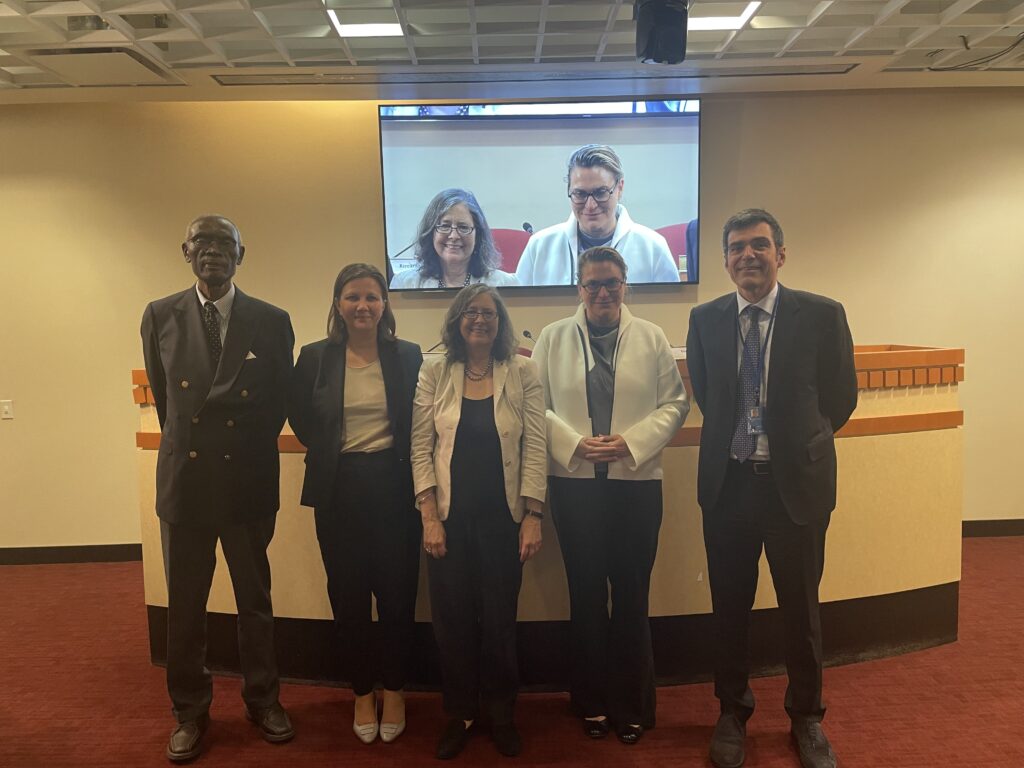
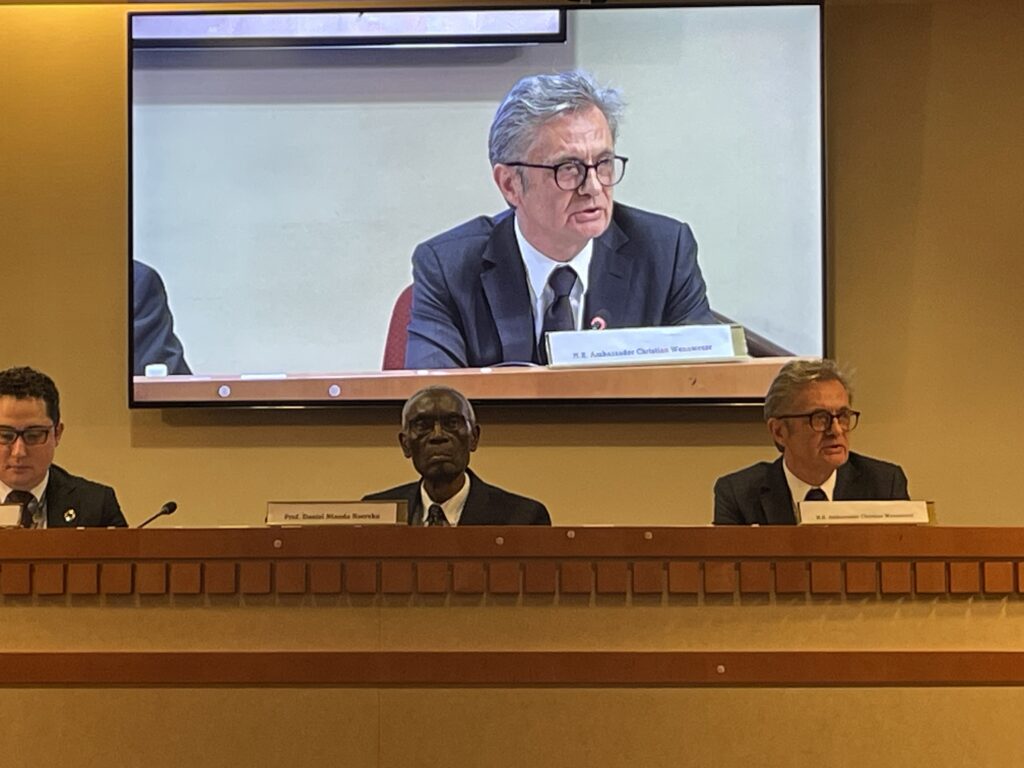
Regional Conferences on Reviewing the Rome Statute: On 6 June 2025, the German Ministry of Foreign Affairs hosted in Berlin its final regional conference of the series entitled “Review of the Rome Statute of the International Criminal Court: Strengthening the Court’s Jurisdiction for the Crime of Aggression.” This last conference was organized to bring together representatives from African States Parties. ICC President Akane gave the keynote address. Three members of the Global Institute for the Prevention of aggression were part of the panels: Prof. Claus Kreß, Prof. Charles Jalloh, Prof. Patrycja Grzebyk and Dr. Annegret Hartig. The series is intended to foster a united approach for the Review Conference in July 2025. 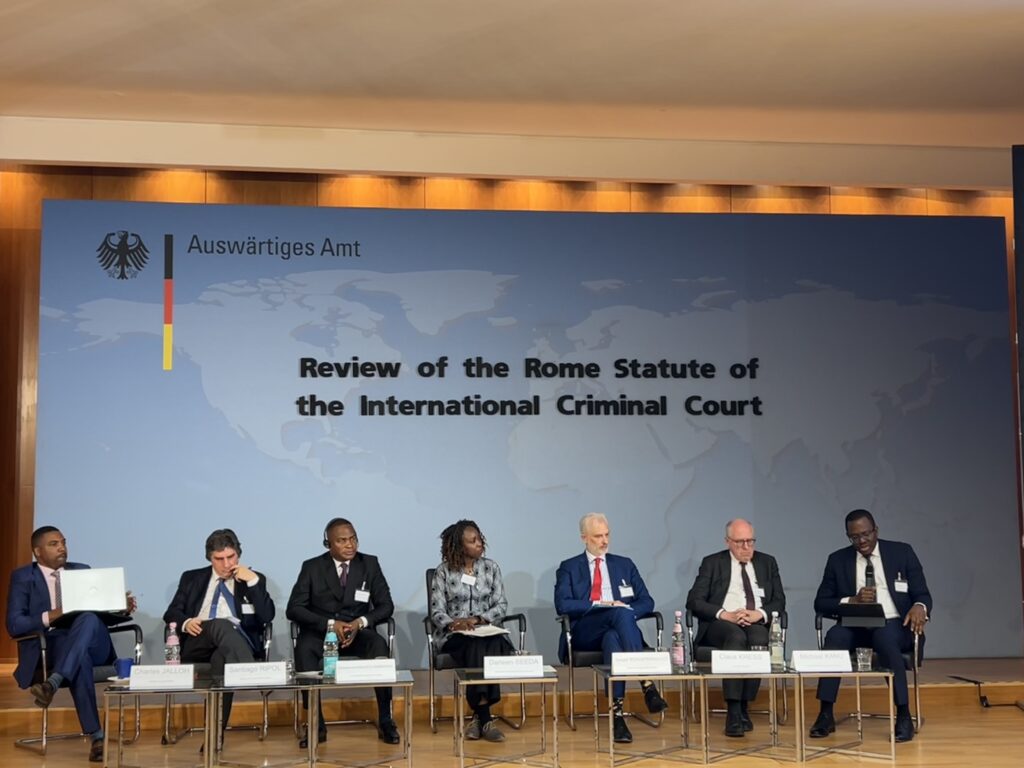
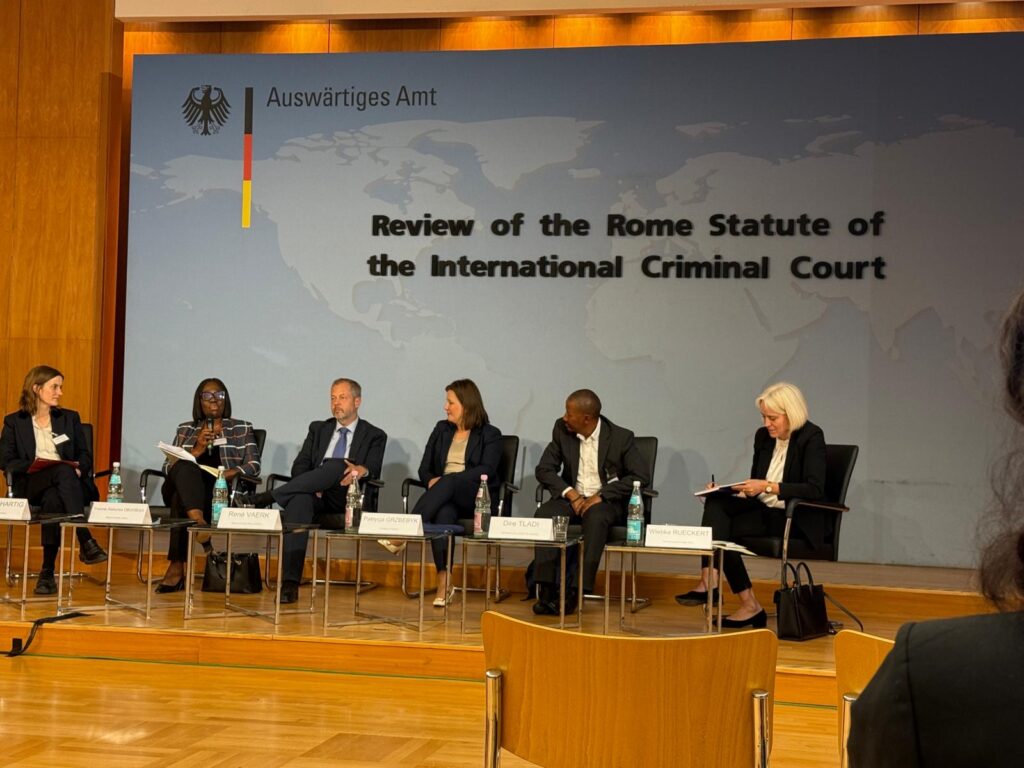
Conference in Armenia on “Crime against Peace: Addressing the Crime of Aggression in a Changing World”:

From 4 to 6 June 2025, the Center for Truth and Justice organized in Yerevan, Armenia, a conference on the crime of aggression to underscore the urgency of renewed dialogue and advocacy in strengthening legal frameworks to combat aggression. Seven members of the Global Institute for the Prevention of Aggression spoke at the conference: former ICC President Silvia Fernández de Gurmendi, Prof. Jennifer Trahan, Prof. Carrie McDougall, Prof. Gregory S. Gordon (in person); Ambassador Christian Wenaweser, Prof. Matthew Gillett and Prof. Claus Kreß (remotely). Ambassadors Fernández de Gurmendi and Wenaweser provided keynote addresses.
Timor-Leste becomes 48th State to ratify Kampala amendments: The GIPA congratulates Timor-Leste on becoming the 48th State to ratify the amendments on the crime of aggression on 30 May 2025.
GIPA letter to the ILC on Draft Article 7: On the occasion of the 76th Session of the International Law Commission (ILC) beginning on 28 April 2025, the Global Initiative for the Prevention of Aggression (GIPA) provided brief comments to the ILC on draft article 7 of the draft articles on immunity of State officials from foreign criminal jurisdiction. GIPA explains in its letter why there is no functional immunity from foreign criminal jurisdiction. Leaving the crime of aggression out of the list of crimes to which functional immunities do not attach would result in inconsistency and a risk of double standards. This could potentially fragment international law. For the full comments, see here.
Official crime of aggression amendment proposal to serve as the basis of upcoming Review negotiations: The governments of Germany, Costa Rica, Sierra Leone, Slovenia and Vanuatu have jointly submitted a proposed amendment to the Rome Statute to the UN Secretary General in his capacity as depositary of the Rome Statute of the International Criminal Court. This text will serve as the basis of negotiations at the upcoming Review to be conducted by the ICC’s Assembly of States Parties.
The Global Institute for the Prevention of Aggression is delighted that the amendment text is essentially what GIPA had proposed to states in the fall of 2023.
Regional Conferences on Reviewing the Rome Statute: On 10 April 2025, GIPA Council of Adviser Professor Patrycja Grzebyk and Professor Claus Kreß were part of panels presenting during the regional conference in Seoul organized by the German Ministry of Foreign Affairs together with Estonia and Poland. The panels explored the case and the legal options for strengthening the ICC’s jurisdictional regime on the crime of aggression at the Review Conference this year. The meeting is part of the series of regional conferences in Africa, Latin America and Asia entitled “Review of the Rome Statute of the International Criminal Court: Strengthening the Court’s Jurisdiction for the Crime of Aggression.” For videos of the conference, see here.
Regional Conferences on Reviewing the Rome Statute: GIPA Executive Council Member Judge Silvia Fernandez de Gurmendi, GIPA Council of Adviser Professor Patrycja Grzebyk and GIPA Convenor Professor Jennifer Trahan joined others in presenting during meetings in Brasilia and Sao Paulo, Brazil on March 25 and 27, 2025. The meetings are part of a series of regional conferences in Africa, Latin America and Asia entitled “Review of the Rome Statute of the International Criminal Court: Strengthening the Court’s Jurisdiction for the Crime of Aggression.” They were organized by the German Ministry of Foreign Affairs with the support of the Estonian Ministry of Foreign Affairs and Polish Ministry of Foreign Affairs.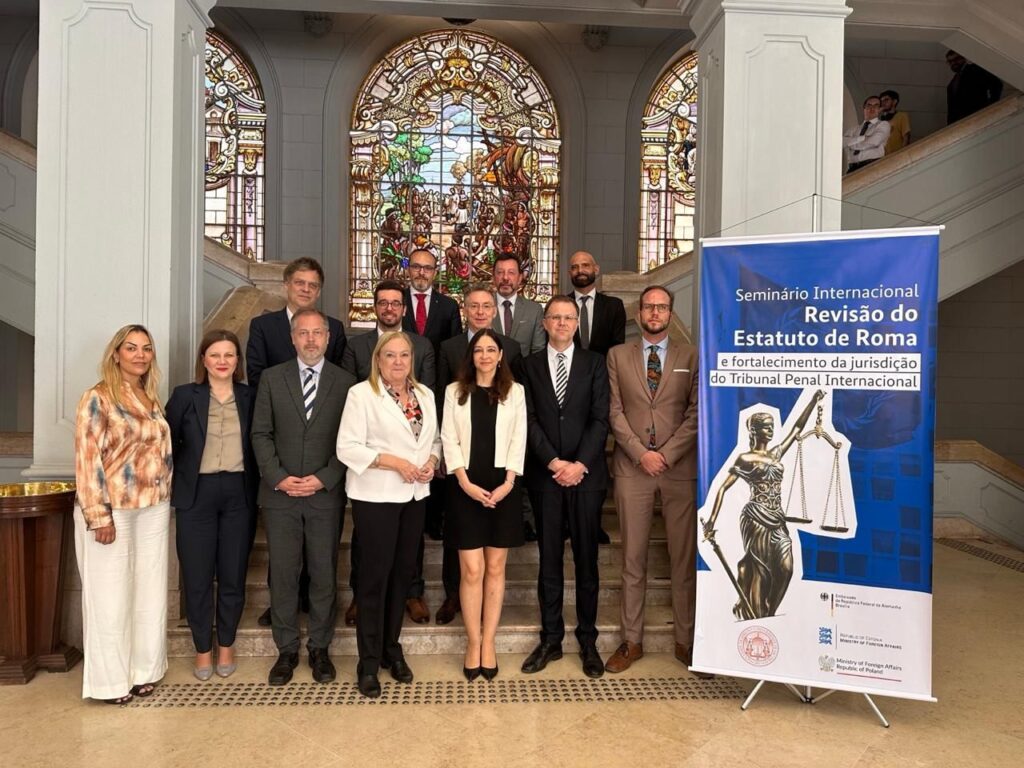
Presidents of the ASP call for aligning the ICC’s jurisdiction: On 27 January 2025, the current and former Presidents of the Assembly of States Parties of the International Criminal Court Päivi Kaukoranta (2024-2026), Silvia Fernández de Gurmendi (2021-2023), O-Gon Kwon (2018-2020), Sidiki Kaba (2015-2017), Tiina Intelman (2012-2014), Christian Wenaweser (2008-2011), Bruno Stagno Ugarte (2005-2007), and Prince Zeid Ra’ad Al Hussein (2002-2004) published a joint statement recalling that this “moment of crisis presents an opportunity to strengthen the ICC”. They underline that a “critical priority is aligning the Court’s jurisdiction over the crime of aggression with its jurisdiction over other core crimes”. They perceive the upcoming ICC States Parties’ meeting in July as “a chance to advance this cause and honor the UN’s founding principles”. For the full statement, see here.
Joint Civil Society Statement
Joint Civil Society Statement: In light of the upcoming review of the aggression amendments in July 2025, over 40 NGOs signed a joint statement calling on all states parties to take the steps required to amend the International Criminal Court’s jurisdiction over the crime of aggression. It states that “the international community needs…a legal framework that can end impunity and effectively deter state leaderships from waging aggressive wars and other acts of aggression.” This is why “the ICC must be able to prosecute the crime of aggression under the same conditions that exist for the other three core international crimes”. The signatories include, inter alia, the European Center for Constitutional and Human Rights, the Global Institute for the Prevention of Aggression, International Federation for Human Rights (FIDH), Open Society Justice Initiative and Parliamentarians for Global Action. For the full statement, see here. For the current version of the sign on statement with 80+ signatures, see here.
Denmark becomes 47th State to ratify Kampala amendments: The GIPA congratulates Denmark on becoming the 47th State to ratify the amendments on the crime of aggression on 1 January 2025.
GIPA Convenor Statement on the Illegal Use of Force by Israel Defense Forces
in the Territory of Syria: In her statement, the Convenor of the Global Institute for the Prevention of Aggression condemns Israel’s December 2024 use of force in the territory of Syria. The uses of force are not lawful acts of self-defense under international law, given there has been no relevant armed attack against Israel. The deployment of the Israeli Defense Forces on the Syrian side constitutes a textbook example of occupation
Side Event at the Assembly of States Parties 2024: During the December 2-6, 2024, meeting of the ICC‘s Assembly of States Parties in The Hague, Netherlands, a side-event panel was held entitled “Reviewing the ICC’s Jurisdiction over the Crime of Aggression: Addressing a Double Standard in International Law.”
It featured government ministers from Slovenia, Costa Rica and Germany, as well as Liechtenstein Ambassador Christian Wenaweser, and Professor Charles Jalloh, Professor Claus Kress, and Professor 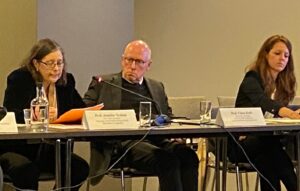 Jennifer Trahan. It was sponsored by Costa Rica, The Gambia, Liechtenstein, Germany, Sierra Leone, Slovenia, Vanuatu, the European Center for Constitutional and Human Rights, and the Global Institute for the Prevention of Aggression. It focussed on the need for the ASP to harmonize the jurisdiction in the ICC’s Rome Statute regarding all four Rome Statute crimes.
Jennifer Trahan. It was sponsored by Costa Rica, The Gambia, Liechtenstein, Germany, Sierra Leone, Slovenia, Vanuatu, the European Center for Constitutional and Human Rights, and the Global Institute for the Prevention of Aggression. It focussed on the need for the ASP to harmonize the jurisdiction in the ICC’s Rome Statute regarding all four Rome Statute crimes.
Discussion Paper for the Mandated Review of the Aggression Amendments: On 8 November 2024, the Permanent Representatives of Costa Rica, Sierra Leone, Vanuatu, Germany and Slovenia sent a discussion paper to all States Parties to the Rome Statute in preparation of the mandated review of the Aggression Amendments in 2025. The discussion paper had previously been elaborated by a cross-regional group of friends and points out two options for how Article 15 bis of the Rome Statute can be revised to bring the Court’s jurisdictional regime over the crime of aggression in line with its jurisdiction over genocide, war crimes and crimes against humanity.
Ukraine will become the 125th State Party to the Rome Statute of the International Criminal Court: On October 25, 2024, Ukraine officially deposited with the United Nations its instrument of ratification of the Rome Statute of the International Criminal Court. Thus, the ratification will take effect on January 1, 2025. This will make Ukraine the 125th State Party to the Rome Statute and the 46th ratifier of the Kampala Amendments on the crime of aggression.
Ukraine and the ratification of the Rome Statute: On the Independence Day of Ukraine on 24 August 2024, Ukrainian President Zelenskyy symbolically signed the law previously adopted by the Ukrainian Parliament to ratify the Rome Statute of the International Criminal Court (ICC) and its Kampala amendments on the crime of aggression. The formal deposit of Ukraine’s instrument of ratification will be made in due course. Once effective, Ukraine’s ratification would give the ICC jurisdiction over the crime of aggression going back to July 17, 2018. However, due to the carve out of nationals of non-State Parties under Article 15bis (5) of the Rome Statute, the ICC would not be able to exercise jurisdiction over Russian nationals for the crime of aggression committed against Ukraine. Additionally, Ukraine has invoked Article 124 of the Rome Statute to exempt its nationals from the ICC’s jurisdiction over war crimes for a period of seven years, while it is unclear whether such a selective use of Article 124 is allowed under the Rome Statute.
Robert Kempner Prize 2024: On 4 May 2024, Annegret Hartig received the Robert Kempner Prize for her monograph “Making Aggression a Crime Under Domestic Law. On the Legislative Implementation of Article 8bis of the ICC Statute.“ The Robert Kempner Prize is awarded by the Association of German Speaking International Criminal Lawyers (Arbeitskreis Völkerstrafrecht) for outstanding monographs in the field of international criminal law with a connection to German speaking legal orders and written by scholars who have not yet reached the age of 35. The jury observed the breadth and depth of Annegret Hartig’s analysis of the crime of aggression and the various techniques of implementing this international crime into domestic law. The jury emphasized that the study also substantially engaged with fundamental concepts of international criminal law, such as personal and functional immunity, universal jurisdiction and the duty of States to enforce international criminal law. The jury concluded that Annegret Hartig’s work qualifies as a basic work of the discipline.
Side-Event on the Occasion of the International Justice Day: On July 18, 2024, the Permanent Missions of Costa Rica, the Gambia, Germany, Liechtenstein, Slovenia and Vanuatu to the United Nations as well as the Global Institute for the Prevention of Aggression, held a side-event at the United Nations. It was entitled “Reviewing the ICC’s Jurisdiction over the Crime of Aggression: Addressing a Double Standard in International Law.” The welcoming remarks were given by the President of the ASP Paivi Kaukoranta. The panelist were Ambassador Christian Wenaweser, Ambassador Zeid Ra’ad Al Hussein and the Convenor of the GIPA Jennifer Trahan. 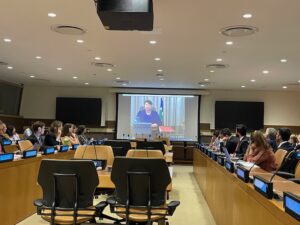 The panel discussed the importance of States using the mandated review of the Kampala amendments on the crime of aggression to harmonize the ICC’s jurisdiction over all four of its core crimes. Former Chief Prosecutor of the ICC Fatou Bensouda gave the closing remarks.
The panel discussed the importance of States using the mandated review of the Kampala amendments on the crime of aggression to harmonize the ICC’s jurisdiction over all four of its core crimes. Former Chief Prosecutor of the ICC Fatou Bensouda gave the closing remarks.
A recording of the event can be found here.
GIPA’s call to all States Parties on the International Justice Day 2024: On 17 June 2024, the Global Institute for the Prevention of Aggression calls on all States Parties to the Rome Statute to “[t]ake action to negotiate and agree on amendments to Article 15 bis of the Rome Statute that align the ICC’s jurisdiction over the crime of aggression with its jurisdiction over the other core international crimes”. These amendments should “reflect the fundamental principles of international criminal law, including the equality of all individuals before the law”. For the full statement, see here.
Meeting of the Global Institute for the Prevention of Aggression: On 2 June 2024, the members of the Global Institute for the Prevention of Aggression (GIPA) met in The Hague to discuss the possibilities of amending the Rome Statute to harmonize the jurisdiction of the ICC over all four core crimes. The Convenor Jennifer Trahan explained why there should be an amendment. Carrie McDougall presented the GIPA proposal, followed by Astrid Reisinger Coracini who explained the two options currently discussed by a group of states convened by Germany. The meeting ended with Ambassador Wenaweser suggesting a strategy for building support for the amendment and a group discussion.

 Memorial of Ben Ferencz and Thomas Buergenthal:
Memorial of Ben Ferencz and Thomas Buergenthal:
On 2 June 2024, Don Ferencz hosted a memorial honoring the legacy of two men with outstanding contributions to international law who died last year: Ben Ferencz, US chief prosecutor in the Einsatzgruppen trial and Professor Emeritus of the Global Institute for the Prevention of Aggression, as well as Thomas Buergenthal, Auschwitz survivor and former judge at the ICJ and the IACtHR. The event took place at the Peace Palace in The Hague and attracted various speakers, from high-level ICL practitioners, such as former ICC Chief Prosecutors Fatou Bensouda and Luis Moreno Ocampo, former ICTY and ICTR prosecutor Richard Goldstone and former US ambassador-at-large for war crimes Stephen Rapp, to ambassadors, such as Christian Wenaweser, and ICL academics, such as David Donat Cattin, Carrie McDougall, Astrid Reisinger Coracini, Leila Sadat, William Schabas, Michael Scharf and Jennifer Trahan.
 Seminar on Strengthening the Court’s Jurisdiction for the Crime of Aggression: On 23 April 2024, a seminar was convened at the German Embassy in The Hague focusing on enhancing the ICC’s jurisdiction over the crime of aggression. Five members of the GIPA were invited to speak, Ambassador Christian Wenaweser, Claus Kreß, Astrid Reisinger Coracini, Matthew Gillett and GIPA’s convenor Jennifer Trahan. The discussions explored various options for amending the Kampala Amendments and strategies for engaging global partners on the issue of the crime of aggression.
Seminar on Strengthening the Court’s Jurisdiction for the Crime of Aggression: On 23 April 2024, a seminar was convened at the German Embassy in The Hague focusing on enhancing the ICC’s jurisdiction over the crime of aggression. Five members of the GIPA were invited to speak, Ambassador Christian Wenaweser, Claus Kreß, Astrid Reisinger Coracini, Matthew Gillett and GIPA’s convenor Jennifer Trahan. The discussions explored various options for amending the Kampala Amendments and strategies for engaging global partners on the issue of the crime of aggression.
Council of Europe Seminar on the Special Tribunal: A seminar on “The Special Tribunal for the Crime of Aggression against Ukraine: What Role for Regional Organisations such as the Council of Europe?” was held on 10 April 2024 in Strasbourg on the margins of the 66th meeting of the Council of Europe’s Committee of Legal Advisers on Public International Law (CAHDI). This reflects the current focus of the discussions on using a regional organisation like the Council of Europe to ensure accountability for the fundamental assault by the Russian leadership in the situation in Ukraine. Three members of GIPA’s Council of Advisers spoke at the meeting: Claus Kreß (keynote), Dapo Akande and Astrid Reisinger Coracini.
In memoriam of Ben Ferencz: Our co-founder and one of the most dedicated advocates of the rule of law, especially the crime of aggression, would have turned 104 years old today. We miss him immensely and we are looking forward to celebrating his legacy in Nuremberg and The Hague this year.
Conference “Addressing cyber-related crimes under the Rome Statute system”: Professor Jennifer Trahan, Convenor of The Global Institute for the Prevention of Aggression, was honored to present the findings of the Council of Advisers’ Report on the Application of the Rome Statute of the International Criminal Court to Cyberwarfare” at the International Criminal Court on January 22, 2024. The conference where she spoke was entitled “Addressing cyber-related crimes under the Rome Statute system” and co-sponsored by the International Criminal Court’s Office of the Prosecutor and Microsoft (See ICC OTP Press release).
The meetings of the Council of Advisers that led into the drafting of the report occurred in 2019-2020, while Don Ferencz was Convenor of GIPA. The meetings on which the report is based were hosted by the Permanent Mission of Liechtenstein to the UN, and co-organized by 10 other UN missions. The full report, drafted under the supervision of Liechtenstein legal adviser Sina Alavi, can be found here.
The report makes the case that each of the Rome Statute’s four crimes can be committed partly or fully through cyber, a position now endorsed by the ICC Prosecutor. The report is anticipated to play a role in the formation of the ICC’s future policy paper on the Rome Statute and cyber.
Aside
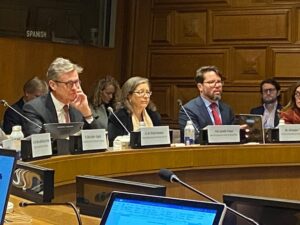
Ukraine’s statement at the Sixth Committee: At the UN General Assembly in October 2023, Ukraine called on the International Law Commission to confirm the inapplicability of functional immunity in proceedings for crimes under international law, without exception and hence encompassing the crime of aggression in order to avoid a serious inconsistency in the treatment of crimes under international law and in order to confirm the principle of accountability for all crimes under international law.
For the full statement, see here.
Conference “Towards accountability for the crime of aggression committed against Ukraine”: organized by Prof. Pavel Šturma and Dr. Milan Lipovský, gathered scholars, practitioners, state representatives and civil society members to discuss the various proposed forms of mechanism to assess individual criminal responsibility for the crime of aggression committed against Ukraine.
The conference took place on 10-11 November 2023 within the premises of the Faculty of Law of the Charles University (Prague, Czech Republic) under the auspices of the Human Rights Research Centre – UNCE and provided grounds among others to debate the interrelated aspects connected to the creation of the mechanism, including the issue of immunities from criminal jurisdiction, competences of intergovernmental organizations and procedural matters.
Liechtenstein’s statement at the Sixth Committee: The GIPA welcomes the clear language of Liechtenstein when commenting on the work of the International Law Commission at the UN General Assembly on 23 October 2023. Liechtenstein does not understand why draft article 7 of the ILC’s work on “Immunity of State officials from foreign criminal jurisdiction” leaves out the crime of aggression. In Liechtenstein’s position, “the crime of aggression should have been included” in the list of crimes in respect of which functional immunity does not apply, “especially given it is a leadership crime which requires us to overcome immunities to ensure meaningful accountability and its future prevention.”
For the full statement, see here.
Conference on Amendments: In commemoration of the 25th anniversary of the Rome Statute, the Vienna Conference on Amendments (6 – 7 October 2023), organized by Dr. Astrid Reisinger Coracini, gathered international scholars, State representatives, and civil society to discuss the harmonization of the ICC’s jurisdiction over all the crimes within its jurisdiction.
Professor Dr. Claus Kreß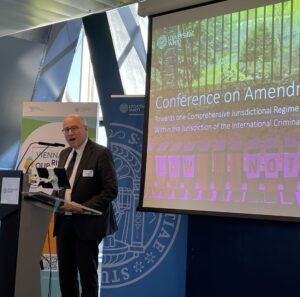 in his keynote address, as well as other speakers, emphasized the new momentum for the international community to close the existing gaps in the prosecution of the crime of aggression.
in his keynote address, as well as other speakers, emphasized the new momentum for the international community to close the existing gaps in the prosecution of the crime of aggression.
This conference, held at the University of Vienna, organized in cooperation with the Austrian Federal Ministry for European and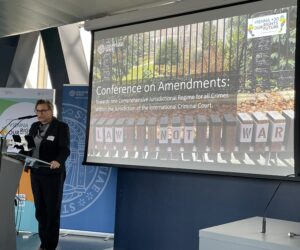 International Affairs, laid the academic groundwork for the discussions that will be needed approaching the mandatory review of the aggression amendments in 2025.
International Affairs, laid the academic groundwork for the discussions that will be needed approaching the mandatory review of the aggression amendments in 2025.
GIPA Proposal to Amend Article 15bis of the Rome Statute: The Global Institute for the Prevention of Aggression believes it is critical to strengthen the ICC’s jurisdiction over the crime of aggression. Reasons for the proposed amendment are summarized here.
GIPA has also published a proposal for the amendment of the conditions under which the ICC can exercise jurisdiction over the crime of aggression. The proposal has been thoroughly discussed among experts on the crime of aggression and has the objective of bringing the ICC’s jurisdiction over the crime of aggression into line with the Court’s jurisdiction over genocide, crimes against humanity and war crimes.
The proposal contains model amendments, as well as a resolution ready to be adopted by the Assembly of States Parties, and an explanation of the proposed amendments.
Conference Room Paper of the Independent International Commission of Inquiry on Ukraine: On 29 August 2023, the Independent International Commission of Inquiry on Ukraine published a report in which it made recommendations on proposed accountability measures and expressed its support for the creation of a tribunal for the crime of aggression as well as efforts to amend the Rome Statute to allow for broader jurisdiction of the crime of aggression (para. 946).
It identified the need for establishing a special tribunal since “there is currently no international court with jurisdiction to undertake this necessary accountability measure” and taking into account evidence relating to acts of aggression in ICC proceedings as context of other ICC Statute crimes or as an aggravating circumstance would “not fully reflect the gravity of the crime of aggression as such, which is a separate crime, different from the three other crimes” (paras 924, 925, 946).
It assessed existing proposals for a special tribunal for the crime of aggression, namely (1) the Chatham House Proposal based on States granting jurisdiction to a dedicated tribunal as well as (2) the Yale Club Proposal and (3) the Proposal by the Ukraine Task Force of the Global Accountability Network, both based on the involvement of the UN General Assembly requesting the establishment of such a tribunal (paras 927-934).
The Commission of Inquiry made recommendations for the on-going reflection process of States, inter alia, that (1) “a certain degree of cooperation and coordination” may be advisable between the ICC and a possible special tribunal, that (2) a revision of Article 15bis of the Rome Statute to cover nationals of Non-States Parties “could limit criticism based on selectivity”, that (3) “a sufficient number of globally dispersed States should support the establishment of a special tribunal” to address legitimacy concerns and that (4) a new tribunal must be “independent, impartial and observe all fair trial rights” (paras 936-945).
Niger becomes 45th State to ratify Kampala amendments: On 14 April 2023, Niger deposited its instrument of ratification of the Kampala amendments, becoming the 45th State to ratify the amendments on the crime of aggression.
On July 17, 2023, the Rome Statute celebrated its 25th anniversary. The same day marked the 5th anniversary of the activation of the International Criminal Court’s jurisdiction over the crime of aggression. The Assembly of States Parties to the ICC led commemorations at UN Headquarters in New York City. The all-day event included a tribute to co-founder of the Global Institute for the Prevention of Aggression and former Nuremberg prosecutor, Benjamin Ferencz, along with others who had played key roles at Rome and have since passed away.
Extensive focus on the crime of aggression occurred both during the plenary celebrations as well as the ministerial level side-event, “The ICC and the Crime of Aggression: In Defense of the UN Charter,” co-organized by the Permanent Missions of Germany and Liechtenstein to the United Nations. Several states, including Austria, Estonia, Germany, Italy, Latvia, Liechtenstein, Luxembourg, Mozambique, the Netherlands, Slovenia and Switzerland, expressed their interest in amending the Rome Statute to bring the ICC’s jurisdiction over the crime of aggression in line with the ICC’s jurisdiction over its other crimes. They also expressed the need for a special tribunal to prosecute the crime of aggression in the situation in Ukraine.
For the recordings of the commemoration, see here and here. For the video of the side event, see here.
For the video see here.
Nuremberg Declaration on the Crime of Aggression of 8 May 2023: The International Nuremberg Principles Academy following on a thorough deliberation on these matters with leading international law experts adopted a declaration in which it:
“Calls upon the international community to support the establishment of a tribunal to
prosecute crimes of aggression as defined under international law committed on the
territory of Ukraine,
Calls upon States Parties to the Rome Statute of the International Criminal Court to amend the jurisdictional provisions governing the crime of aggression to align them with those applicable to the other crimes within the jurisdiction of the International Criminal Court.”
For the full declaration, see here.
Nuremberg Academy Lectures on 4 May 2023: The International Nuremberg Principles Academy hosted a lecture on “The Ukraine War and the Crime of Aggression” and honored Benjamin Ferencz, former President emeritus of the Global Institute for the Prevention of Aggression, at the Nuremberg courtroom. There was also a moment of silence.
Coalition for International Criminal Justice – States Parties Should Strengthen the ICC’s Ability to Prosecute Aggression: Whilst establishing a special tribunal for the crime of aggression may address the current lacuna with respect to Russia’s attack on Ukraine,a sustainable solution appears to include a reversal of the Kampala compromise. For the full statement see here.
Statement Honoring the Legacy of Benjamin B. Ferencz: The Global Institute for the Prevention of Aggression is deeply saddened to report that the Institute’s co-founder and President Emeritus Benjamin B. Ferencz died on April 7, 2023, at the age of 103. He was a tireless advocate for international criminal justice and the last living prosecutor from the Nuremberg war crimes trials. Only recently, he received a US Congressional Gold Medal in recognition of his service to the United States and the international community.
Ferencz: The Global Institute for the Prevention of Aggression is deeply saddened to report that the Institute’s co-founder and President Emeritus Benjamin B. Ferencz died on April 7, 2023, at the age of 103. He was a tireless advocate for international criminal justice and the last living prosecutor from the Nuremberg war crimes trials. Only recently, he received a US Congressional Gold Medal in recognition of his service to the United States and the international community.
Born on March 11, 1920, in Transylvania, now modern day Romania, he soon fled from anti-Semitic persecution together with his parents and emigrated to the United States. Ben grew up in New York City, and in 1940, was awarded a scholarship to Harvard Law School where he graduated with honors.
After the onset of World War II, Ben enlisted in the United States Army in 1943, and joined an anti-aircraft artillery battalion preparing for the liberation of France. He fought in most of the major campaigns in Europe.
As Nazi atrocities were being uncovered, Ben was transferred to a newly created War Crimes Branch of the U.S. Army to gather evidence of war crimes that could be used to prosecute those responsible. Ben documented the horrors perpetrated by Nazi Germany, visiting concentration camps as they were liberated.
After the war, Ben became Chief Prosecutor for the United States in The Einsatzgruppen Case, which the Associated Press called “the biggest murder trial in history.” Twenty-two defendants were charged with murdering over a million people. He was only twenty-seven years old. It was his first case.
All of the defendants were convicted. Thirteen were sentenced to death. The verdict was hailed as a great success for the prosecution. Ben’s primary objective had been to establish a legal precedent that would encourage a more humane and secure world in the future.
Since the 1970s, Ben worked tirelessly to promote the development of international mechanisms to outlaw and punish crimes under international law, with a particular focus on the need to prosecute the crime of aggression (the leaders responsible for aggressive war-making). To this end, he published several books, such as “Defining International Aggression – The Search for World Peace” in 1975, the two-volume documentary history “An International Criminal Court-A Step Toward World Peace” in 1980, and two-volume book Enforcing International Law-A Way to World Peace in 1983.
With the end of the Cold War, the international community started to discuss the possibility of establishing an international criminal court in the 1990s. Active from the beginning, Ben participated in the Preparatory Commission sessions for the International Criminal Court, monitoring and making available his expertise on current efforts to define aggression. His efforts contributed to the establishment of the International Criminal Court and to the recognition of aggression within the ICC’s Rome Statute as an international crime.
Ben continued to mobilize support for the International Criminal Court, working tirelessly as part of the Special Working Group on the Crime of Aggression to conclude the definition of the ICC’s crime of aggression and conditions for the ICC’s exercise of jurisdiction over the crime.
Throughout his work, Ben optimistically championed the goal of replacing the “rule of force with the rule of law.” He truly lived his main message “never give up” and gave speeches throughout the world until his death to promote international justice and the rule of law.
Ben will be sorely missed but his inspiration will live on. The Global Institute for the Prevention of Aggression (co-founded by Ben’s son, Donald M. Ferencz) is deeply indebted to him for leaving behind such a rich legacy, and being such a kind and caring person, as well as an inspirational figure, to so many of its members. Above all, the Global Institute, in his memory, vows to continue to “never give up” until the crime of aggression can be more comprehensively prosecuted and the world can become a safer place.
UN General Assembly calls for immediate end to war in Ukraine: On 23 February 2023, hours before the conflict entered its second year, the UN General Assembly adopted by majority vote a resolution calling for an end to the war. 141 States voted in favor of the resolution. This is the third resolution in response to the war in Ukraine with a similarly strong majority vote.
For details, see here and:
Paragraph 9: “Emphasizes the need to ensure accountability for the most serious crimes under international law committed on the territory of Ukraine through appropriate, fair and independent investigations and prosecutions at the national or international level, and ensure justice for all victims and the prevention of future crimes”
Congressional Gold Medal for Benjamin Ferencz: President Emeritus of the Global Institute for the Prevention of Aggression, Benjamin Ferencz, is to receive a US Congressional Gold Medal in recognition of his service to the United States and the international community during the post-World War II Nuremberg trials and his lifelong advocacy for international criminal justice and the rule of law. The bill to grant him the award enjoyed the support of 296 US House cosponsors and 81 US Senate cosponsors.
The bill states:
(9) Since the 1970s, Ben has worked tirelessly to promote development of international mechanisms to outlaw and punish aggressive war and the crimes of genocide, crimes against humanity and war crimes. His efforts contributed to the establishment of the International Criminal Court and to the recognition of aggression as an international crime.
(10) Ben is a tireless advocate for international criminal justice and the conviction that the rule of law offers the world a sustainable path to stem conflict and reach peaceful conclusions to geopolitical disputes. His unwavering goal has been “to establish a legal precedent that would encourage a more humane and secure world in the future”.
Resolution by the French Assemblée Nationale: On 30 November 2022, the French Parliament adopted a resolution in which it strongly condemns the Russian crime of aggression committed against Ukraine, calls on the EU and its Member States to support the investigations of the ICC and supports the idea of having criminal trials before an ad hoc tribunal if necessary. For the resolution, see here.
Statement by the President of the European Commission: On 30 November 2022, the President of the European Commission von der Leyen proposed to set up a specialised court, backed by the United Nations, to investigate and prosecute Russia’s crime of aggression. For the full statement, see here.
GIPA Statement on Increasing Jurisdiction
Statement of the Global Institute for the Prevention of Aggression: States Parties are called upon to remove the restrictions on the International Criminal Court’s jurisdiction over the crime of aggression.
For the full statement, see here.
Acknowledgment by the UN General Assembly: On 2 November 2022, the UN General Assembly adopted by consensus a resolution which recalls, for the first time, the activated jurisdiction of the ICC over the crime of aggression as well as the competence of the UN Security Council to enable the ICC to exercise jurisdiction over all four crimes under the Rome Statute.
Peru becomes 44th State to ratify Kampala amendments: On 14 October 2022, Peru deposited its instrument of ratification of the Kampala amendments, becoming the 44th State to ratify the amendments on the crime of aggression.
Chautaqua Principles
Chautaqua Principles: The 14th annual International Humanitarian Law Roundtables held August 28-30, 2022, at Lake Chautauqua, New York, culminated in the issuance of the “Chautauqua Principles” (see here). They, inter alia, state:
Proposal to Amend the Jurisdiction of the ICC over the Crime of Aggression: Since March 2022, Parliamentarians for Global Action (PGA) have elaborated a non-paper containing specific amendments to Article 15bis of the Rome Statute that would partially align the ICC jurisdictional regime on the crime of aggression to the one that already exists for the other three core crimes. For a summary of the non-paper, see here
Virtual Roundtable of the Council on Foreign Relations: In Defense of a Democracy: Prosecuting Russian Aggression Against Ukraine: On 25 May 2022, David Scheffer, Oona Hathaway and Claus Kreß discussed the crime of aggression and the need for a special tribunal in the situation in Ukraine. To watch the panel, click here.
James Kingston Obituary: It is with enormous sadness that the Global Institute for the Prevention of Aggression reports the death of James Kingston. As a legal adviser of the Irish Department of Foreign Affairs and President of the Irish Branch of the International Law Association, he was a strong supporter of the International Criminal Court and the prohibition of aggression.
James joine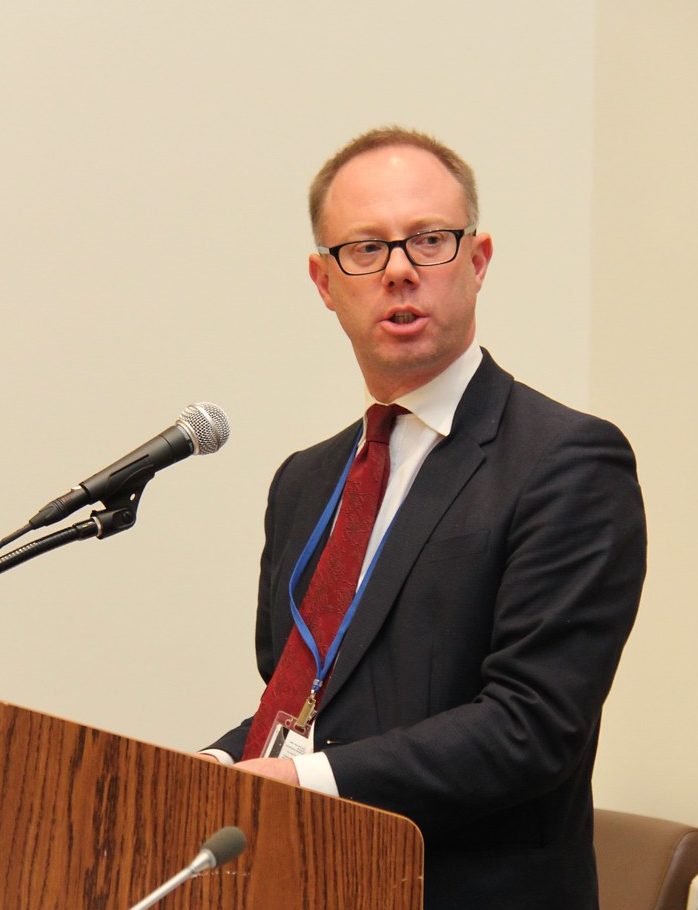 d the Irish Department of Foreign Affairs in 1995 and became legal adviser in 2009. He advised on various matters, including EU law, human rights law and international criminal law and was instrumental in advising on some of the big foreign policy decisions in Ireland. His expertise in international law brought him to his position in the Irish Branch of the International Law Association where he served as President from 2016 to 2020. He lectured in public international law at University College Dublin and Trinity College Dublin.
d the Irish Department of Foreign Affairs in 1995 and became legal adviser in 2009. He advised on various matters, including EU law, human rights law and international criminal law and was instrumental in advising on some of the big foreign policy decisions in Ireland. His expertise in international law brought him to his position in the Irish Branch of the International Law Association where he served as President from 2016 to 2020. He lectured in public international law at University College Dublin and Trinity College Dublin.
James was a brilliant lawyer, an outstanding advocate for the rule of law and a good friend to many of us. His sudden death is a great loss for the international community.
We present our deepest condolences to his family.
Statement of Members of the Council of Advisors on Russia’s Invasion of Ukraine: urging States Parties to the Rome Statute to amend the crime of aggression’s jurisdictional regime.
GIPA Statement_24 March 2022_ENG
GIPA Statement 24 March 2022_UKR
GIPA Statement 24 March 2022_RUS
GIPA Statement 24 March 2022_FR
GIPA Statement 24 March 2022_ESP
GIPA Statement_24 March 2022_ARA
GIPA Statement_24 March 2022_CHI
GIPA Statement_24 March 2022_POR
For a commentary by the Convenor of the Global Institute for the Prevention of Aggression, see The Need to Reexamine the Crime of Aggression’s Jurisdictional Regime (justsecurity.org)
Repository of Documents Relevant to the Situation in Ukraine: The Global Institute for the Prevention of Aggression has created a repository of documents relevant to the situation in Ukraine, such as applicable domestic criminal laws as well as resolutions and statements of international organizations.
Ukrainian Criminal Code
Article 437 Planning, Preparation and Waging of an Aggressive War
(1) Planning, preparation or waging of an aggressive war or armed conflict, or conspiring for any such purposes – shall be punishable by imprisonment for a term of seven to twelve years.
(2) Conducting an aggressive war or aggressive military operations – shall be punishable by imprisonment for a term of ten to fifteen years.
Statement of the Global Institute for the Prevention of Aggression on the Situation in Ukraine: Article 2(4) of the United Nations (“U.N.”) Charter is the cornerstone of the rules-based international order—the prohibition of the threat or use of force against the territorial integrity or political independence of any State, or in any other manner inconsistent with the Purposes of the United Nations.
With the sending of Russian forces into the sovereign territory of Ukraine, the Russian Federation has acted in complete disregard for the prohibition of the use of force under the U.N. Charter and customary international law. Pretextual invocations that purport to suggest a legal basis must be seen for what they are: a perversion of international law. There is no legal justification for any use of force against the sovereignty, territorial integrity, or political independence of Ukraine. The Russian use of force constitutes an act of aggression, and can amount to the crime of aggression, with cyber-attacks potentially forming part of the modality of its commission.
U.N. Member States must stand united in condemning this flagrant and dangerous violation of international law and ensure that the U.N. Charter is enforced, including rallying in support of the laws and norms against the aggressive use of force. Additionally, U.N. Member States must decline to recognize any “new states” purportedly “created” through such illegal acts that violate jus cogens norms.
Our thoughts are with all those impacted by this unlawful act, and especially the people of Ukraine and the soldiers on both sides who should not be forced to fight or die in the service of an illegal war.
– Jennifer Trahan, Convenor
The Council of Advisers’ Report on the Application of the Rome Statute of the International Criminal Court to Cyberwarfare: Based on a series of three convenings involving a group of eminent legal and technical experts across 2019 and 2020, the report discusses the extent to which cyber-attacks could fall within each of the Rome Statute’s four crimes. The meetings were sponsored by Liechtenstein and Argentina, Austria, Belgium, Costa Rica, the Czech Republic, Estonia, Luxembourg, Portugal, Spain and Switzerland, as well as the Global Institute for the Prevention of Aggression.
The New Convenor’s Reminder of the Importance of the Crime of Aggression: Jennifer Trahan’s blog post on the situation of Russia and Ukraine
Italy and Sweden become 42nd and 43rd States to ratify the Kampala amendments: On 26 January 2021, Italy and Sweden deposited their instrument of ratification of the Kampala amendments, bringing the total number of States that have ratified the amendments on the crime of aggression to 43.
GIPA has a new Convenor: Congratulations to Prof. Jennifer Trahan on assuming the role of Convenor of the Global Institute for the Prevention of Aggression.
Mongolia becomes 41st State to ratify Kampala amendments: On 18 January 2021, Mongolia deposited its instrument of ratification of the Kampala amendments, becoming the 41st State to ratify the amendments on the crime of aggression.
40th State Ratifies the Kampala amendments on the Crime of Aggression: On 10 December 2020, Bolivia deposited its instrument of ratification of the Kampala amendments, becoming the 40th State to ratify the amendments.
Launch of new Cyber Project
Launch of new Cyber Project: On 29 and 30 October 2019, Liechtenstein together with Argentina, Belgium, Estonia, Luxembourg, Spain, Switzerland and the Global Institute on the Prevention of Aggression launched a new Council of Advisers on the Application of the Rome Statute to Cyberwarfare. The Council was formed as a time-bound forum for States, Academics and Civil Society Members to discuss how different forms of cyber operations fit into the Rome Statute system and other international legal frameworks.
Ecuador 39th State to ratify Kampala Amendments
Ecuador 39th State to ratify Kampala Amendments: On 25 September 2019, Ecuador deposited its instrument of ratification of the Kampala amendments, becoming the 39th State to ratify the amendments.
Paraguay 38th State to ratify Kampala Amendments:
Paraguay 38th State to ratify Kampala Amendments: On 5 April 2019, Paraguay deposited its instrument of ratification of the Kampala amendments, becoming the 38th State to ratify the amendments.
Guyana 37th State to ratify Kampala Amendments
Guyana 37th State to ratify Kampala Amendments: On 28 September 2018, Guyana deposited its instrument of ratification of the Kampala amendments, becoming the 37th State to ratify the amendments.
Ireland ratifies Kampala Amendments
Ireland 36th State to ratify Kampala Amendments: On 27 September 2018, Ireland deposited its instrument of ratification of the Kampala amendments, becoming the 36th State to ratify the amendments.
ICC jurisdiction over the Crime of Aggression activated
ICC jurisdiction over the Crime of Aggression activated: On this day the International Criminal Court can finally begin exercising jurisdiction over the crime of aggression. We now have, for the first time in history, a permanent international court with jurisdiction over the crime of aggression – the worst form of the illegal use of force. And indeed, the moment could not be more auspicious. The provisions on the legality of the use of force – a centerpiece of the United Nations Charter – are frequently challenged these days and at times openly ignored. The conviction that armed conflict between States was largely a phenomenon of the past has been replaced by concerns that international armed conflicts may be back on the rise. We therefore, more than ever, need a strong, independent, international Court with jurisdiction over the most serious forms of the illegal use of force.
ICC Assembly of States Parties (ASP) decides to activate the Court’s jurisdiction over the crime of aggression: In the early morning hours of 15 December, the 123 States Parties to the Rome Statute made the historic decision to enable the ICC to prosecute the crime of aggression. This marks the first time that humanity has had a permanent international court with the authority to hold individuals accountable for their decisions to commit aggression – the worst form of the illegal use of force. The ICC will be able to exercise its jurisdiction over the crime of aggression as of 17 July 2018, which also marks the 20th anniversary of the Rome Statute. The Court’s jurisdiction will be determined by the Kampala amendments on the crime of aggression, which were adopted in 2010 under the ASP presi dency of Liechtenstein’s UN Ambassador, Christian Wenaweser. Following the activation decision on 15 December, Ambassador Wenaweser recalled that “the Court’s jurisdiction is determined by the Rome Statute and States Parties are not only committed to the independence of the Court, but have an obligation not to infringe upon its mandate. We have expressed repeatedly our view that the Court’s jurisdiction relating to the crime of aggression is founded in articles 15 bis and 15 ter, which were adopted by consensus in Kampala. Article 15 bis paragraph 4 in particular is itself based on article 12 of the Rome Statute in which is enshrined the cardinal principle of the Court’s territorial jurisdiction.” The historic decision to activate the ICC’s jurisdiction over the crime of aggression not only completes the Rome Statute as originally drafted, but also reinforces the Charter of the United Nations and will help to deter aggressive war-making in the future.
dency of Liechtenstein’s UN Ambassador, Christian Wenaweser. Following the activation decision on 15 December, Ambassador Wenaweser recalled that “the Court’s jurisdiction is determined by the Rome Statute and States Parties are not only committed to the independence of the Court, but have an obligation not to infringe upon its mandate. We have expressed repeatedly our view that the Court’s jurisdiction relating to the crime of aggression is founded in articles 15 bis and 15 ter, which were adopted by consensus in Kampala. Article 15 bis paragraph 4 in particular is itself based on article 12 of the Rome Statute in which is enshrined the cardinal principle of the Court’s territorial jurisdiction.” The historic decision to activate the ICC’s jurisdiction over the crime of aggression not only completes the Rome Statute as originally drafted, but also reinforces the Charter of the United Nations and will help to deter aggressive war-making in the future.
Panama 35th State to ratify Kampala Amendments: On 6 December 2017, Panama deposited its instrument of ratification of the Kampala amendments, becoming the 35th State to ratify the amendments.
From Nuremberg to New York: Historic Opportunity to Activate ICC Jurisdiction over Crime of Aggression (VIDEO): In December 2017, the first permanent independent international criminal court in history stands on the brink of having the jurisdiction to hold national leaders accountable for the illegal use of force against other states. The 1998 Rome Statute established the International Criminal Court, an international court that has jurisdiction over genocide, crimes against humanity, and war crimes as well as the crime of aggression. But, the States Parties to the ICC could not agree to the definition of the Crime of Aggression until 2010, when a diplomatic breakthrough in Kampala, Uganda finally produced consensus on the international legal definition of the crime.
From Nuremberg in 1945 through Tokyo, Rome, The Hague and Kampala, this film tracks the legal and moral debate more than seven decades in the making. History can be made in New York in 2017 when the States Parties of the International Criminal Court have the opportunity to activate the court’s jurisdiction over the Crime of Aggression.
Argentina becomes 34th State to ratify Kampala Amendments
Argentina 34th State to ratify Kampala Amendments: On 28 April 2017, Argentina deposited its instrument of ratification of the Kampala amendments, becoming the 34th State to ratify the amendments.
Portugal becomes 33rd State to ratify the Kampala Amendments
Portugal ratifies Kampala Amendments: On 11 April 2017, Portugal deposited its instrument of ratification of the Kampala amendments, becoming the 33rd State to ratify the amendments. Portugal is also the 15th NATO Member State to ratify the Kampala amendments on the crime of aggression, meaning a majority of NATO Member States have now ratified the amendments.
NEWS: Chile becomes 32nd State to ratify the Kampala Amendments
Chile ratifies Kampala Amendments: On 23 September 2016, Chile deposited its instrument of ratification of the Kampala Amendments during the UN Treaty Event, which was held on the margins of this year’s UN General Debate. Chile thus became the 32nd country to ratify the Kampala Amendments, and the 5th country from the Latin American and Caribbean region to do so.
NEWS: The Netherlands 31st to ratify Kampala Amendments on crime of aggression
The Netherlands ratifies Kampala Amendments: On 23 September 2016, The Foreign Minister of The Netherlands, Bert Koenders, deposited his country’s instrument of ratification of the Kampala Amendments during the United Nations Treaty Event, which was held on the margins of the UN General Debate. The ratification of The Netherlands is particularly important, not only because they are the 31st State to do so, but also since The Netherlands is the host State for the International Criminal Court.
NEWS: Kenya lodged declaration of non-acceptance of ICC jurisdiction over the crime of aggression
The Republic of Kenya is first State Party to lodge declaration of non-acceptance of ICC jurisdiction over the crime of aggression: Pursuant to article 15 bis (4) of the Rome Statute, a State Party can declare that it does not accept ICC jurisdiction regarding the crime of aggression by lodging a declaration with the ICC Registrar. On 30 November 2015, Kenya lodged their declaration of non-acceptance with the Registrar: https://www.icc–cpi.int/iccdocs/other/2015_NV_Kenya_Declaration_article15bis-4.pdf
NEWS: Palestine Landmark 30th to Ratify the Kampala Amendments
 The State of Palestine key 30th ICC State Party to ratify Kampala Amendments: On 26 June 2016, the State of Palestine deposited its instrument of ratification of the Kampala Amendments. With 30 ratifications achieved, all that is needed now is for ICC States Parties to take an activation decision on the Court’s jurisdiction over the crime of aggression in 2017. This is a historic day! We are now one step closer to a permanent system of accountability at the international level for this supreme crime.
The State of Palestine key 30th ICC State Party to ratify Kampala Amendments: On 26 June 2016, the State of Palestine deposited its instrument of ratification of the Kampala Amendments. With 30 ratifications achieved, all that is needed now is for ICC States Parties to take an activation decision on the Court’s jurisdiction over the crime of aggression in 2017. This is a historic day! We are now one step closer to a permanent system of accountability at the international level for this supreme crime.
Princeton Seminar for States Parties to the Rome Statute of the ICC on the Activation of the Court’s Jurisdiction over the Crime of Aggression
On 17-18 June 2016: representatives of ICC States Parties, civil society and academia met at Princeton University for a seminar on the activation of the ICC’s jurisdiction over the Kampala amendments on the crime of aggression. 
NEWS: Iceland 29th to ratify the Kampala Amendments on the crime of aggression
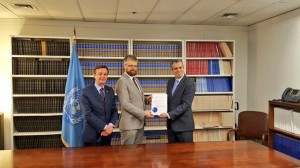 Iceland ratifies Kampala Amendments: On 17 June 2016, Iceland deposited its instrument of ratification of the Kampala Amendments with the Secretary-General of the United Nations. Its parliament had approved the ratification earlier the same month. Iceland is the 29th State Party to the Kampala Amendments. With several other domestic ratification processes complete or nearing completion, we are very close to reaching the milestone of 30 ratifications this year. Mr. Oláfur Ragnar Grímson, President of Iceland: “I am proud of being a part of this important decision for my country, which illustrates its commitment to international justice and the strong role of the Rule of Law. I would like to call on all States that have not yet done so, to continue ratifying the Kampala Amendments in order to not only reach the milestone of 30 ratifications necessary for the activation of the Amendments but also to demonstrate the respect for the territorial integrity of States and peace and security around the world. I firmly believe that my country’s step in this direction will serve as an inspiration to all the States to take the initiative and join the group of countries that are sending a strong message that the illegal use of force has no role in international relations and those who launch aggressive wars shall be held accountable.”
Iceland ratifies Kampala Amendments: On 17 June 2016, Iceland deposited its instrument of ratification of the Kampala Amendments with the Secretary-General of the United Nations. Its parliament had approved the ratification earlier the same month. Iceland is the 29th State Party to the Kampala Amendments. With several other domestic ratification processes complete or nearing completion, we are very close to reaching the milestone of 30 ratifications this year. Mr. Oláfur Ragnar Grímson, President of Iceland: “I am proud of being a part of this important decision for my country, which illustrates its commitment to international justice and the strong role of the Rule of Law. I would like to call on all States that have not yet done so, to continue ratifying the Kampala Amendments in order to not only reach the milestone of 30 ratifications necessary for the activation of the Amendments but also to demonstrate the respect for the territorial integrity of States and peace and security around the world. I firmly believe that my country’s step in this direction will serve as an inspiration to all the States to take the initiative and join the group of countries that are sending a strong message that the illegal use of force has no role in international relations and those who launch aggressive wars shall be held accountable.”
Photo: Ambassador of Italy to the UN, Sebastiano Cardi, Ambassador of Iceland to the UN, Einar Gunnarsson and the Chief of the UN Treaty Section Santiago Villalpando on 17 June 2016.
NEWS: Legal scholars debate crime of aggression amendments
Legal scholars debate crime of aggression amendments: Last week, Professors Claus Kreß and Harold Koh led a spirited discussion on some of the details of the Kampala Amendments in New York. They discussed the activation of the ICC’s jurisdiction over the crime of aggression in 2017, including the precise extent of the Court’s jurisdiction as well as the question of humanitarian intervention. Don’t miss the arguments raised by Stefan Barriga, Liechtenstein’s Deputy Permanent Representative to the UN and co-drafter of the Kampala Amendments, at 1:01:15, as to how some of the concerns raised can be met with pragmatic solutions – especially in light of the fact that the amendments establish a very limited, consent-based jurisdictional regime. Carrie McDougall, Legal Adviser of the Australian Mission to the UN, at 1:10:15, noted that for those States that have ratified the amendments, there are no jurisdictional ambiguities – meaning that ratifying the amendments would help solve any remaining questions in this regard.
The International Criminal Court and the Crime of Aggression from German Center for Research and I on Vimeo.
NEWS: El Salvador ratifies amended version of the Rome Statute
El Salvador ratifies amended version of the Rome Statute: On 3 March 2016, Hugo Roger Martinez Bonilla, Foreign Minister of El Salvador, deposited his country’s instrument of ratification of the amended Rome Statute. El Salvador thus became the first country to ratify the Statute and the Kampala Amendments at the same time – it will be the 124th State Party to the Rome Statute and the 28th State Party to the Kampala Amendments. El Salvador’s ratification once again underscores Latin America’s strong commitment to the International Criminal Court – all but one Central American States have now joined – all of South America is already within the Court’s jurisdiction. The Campaign is hopeful that future States joining the Rome Statute will follow El Salvador’s lead and ratify the amended Statute. With several other domestic ratification processes complete or nearing completion, we remain on track to achieve the milestone of 30 ratifications in the first half of this year.
Photo: Hugo Roger Martinez Bonilla, Foreign Minister of El Salvador deposits his country’s instrument of ratification. Stephen Mathias, Assistant-Secetary-General for Legal Affairs of the United Nations, receives the instrument.
NEWS: Macedonia ratifies Kampala Amendments, adopts implementing legislation
 Macedonia ratifies Kampala Amendments, adopts implementing legislation: On 1 March 2016, Macedonia (FYROM) deposited its instrument of ratification of the Kampala Amendments with the Secretary-General of the United Nations. Its parliament had approved both the ratification and the adoption of implementing legislation in early February. Macedonia is the 27th State Party to the Kampala Amendments. With several other domestic ratification processes complete or nearing completion, we remain on track to achieve the milestone of 30 ratifications in the first half of 2016.
Macedonia ratifies Kampala Amendments, adopts implementing legislation: On 1 March 2016, Macedonia (FYROM) deposited its instrument of ratification of the Kampala Amendments with the Secretary-General of the United Nations. Its parliament had approved both the ratification and the adoption of implementing legislation in early February. Macedonia is the 27th State Party to the Kampala Amendments. With several other domestic ratification processes complete or nearing completion, we remain on track to achieve the milestone of 30 ratifications in the first half of 2016.
NEWS: Proposal presented to implement Kampala Amendments in Panama
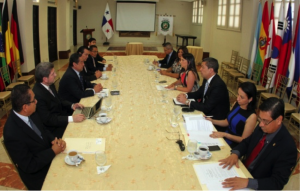 Proposal presented to implement Kampala Amendments in Panama: On 2 February 2016, the Bar Association of Panama presented a Draft Statute implementing the Kampala Amendments into the Panamanian Criminal Code to the Ministry of Foreign Affairs. Inclusion of the crime of aggression in the criminal code would be an important step towards the ratification of the amendments, a process on which Panama has been actively working (see our Status Report).
Proposal presented to implement Kampala Amendments in Panama: On 2 February 2016, the Bar Association of Panama presented a Draft Statute implementing the Kampala Amendments into the Panamanian Criminal Code to the Ministry of Foreign Affairs. Inclusion of the crime of aggression in the criminal code would be an important step towards the ratification of the amendments, a process on which Panama has been actively working (see our Status Report).
For more information, see the Ministry of Foreign Affairs’ press release (Spanish).
Photo: President of the Bar Association of Panama presents draft Statute to for the implementation of the Kampala Amendments to the Vice Minister of Foreign Affairs. Courtesy of the Ministry of Foreign Affairs of Panama.
NEWS: Crime of aggression now outlawed in Austria
 Crime of aggression now outlawed in Austria: On 1 January 2016, Austria’s amended criminal code entered into force, for the first time defining the crime of aggression as an offence (article 321k). The definition of the crime is based in large parts on the definition of Kampala. The crime of aggression is punishable in Austria with a prison term of five to ten years, provided that the crime either originates in Austria or has Austria as its target. The code also allows for the prosecution of crimes of aggression committed without such a link, provided the perpetrator is found on Austrian territory and cannot be extradited for criminal prosecution.
Crime of aggression now outlawed in Austria: On 1 January 2016, Austria’s amended criminal code entered into force, for the first time defining the crime of aggression as an offence (article 321k). The definition of the crime is based in large parts on the definition of Kampala. The crime of aggression is punishable in Austria with a prison term of five to ten years, provided that the crime either originates in Austria or has Austria as its target. The code also allows for the prosecution of crimes of aggression committed without such a link, provided the perpetrator is found on Austrian territory and cannot be extradited for criminal prosecution.
The current version of the Austrian criminal code is available online (German).
NEWS: Finland 26th State to ratify the Kampala Amendments
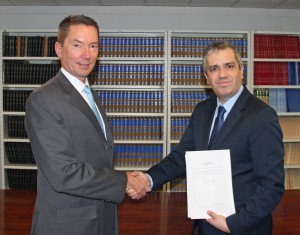 Finland 26th State to ratify the Kampala Amendments: On 31 December 2015, Finland deposited its instrument of ratification of the Kampala Amendments. It is the first Nordic country to ratify the amendments. This means that we need four more ratifications to achieve the milestone of 30 in the course of this year.
Finland 26th State to ratify the Kampala Amendments: On 31 December 2015, Finland deposited its instrument of ratification of the Kampala Amendments. It is the first Nordic country to ratify the amendments. This means that we need four more ratifications to achieve the milestone of 30 in the course of this year.
Photo: United Nations/Win Khine. Deputy Permanent Representative of Finland to the United Nations, Jouni Laaksonen, meeting with the Chief of the UN Treaty Section Santiago Villalpando on 28 January 2016.
NEWS: To close the impunity gap, Benjamin B. Ferencz calls for prosecutions of aggressive war making as crimes against humanity
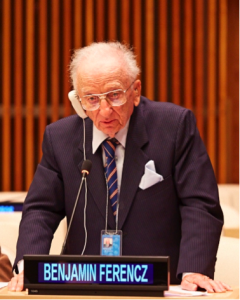 To close the impunity gap, Benjamin B. Ferencz calls for prosecutions of aggressive war making as crimes against humanity: Writing in the Journal on the Use of Force and International Law, former Nuremberg Prosecutor Benjamin B. Ferencz offers a way to close the impunity gap on the illegal use of armed force by prosecuting it domestically as a crime against humanity. In his article entitled “The illegal use of armed force as a crime against humanity,” he encourages all States to ratify the Kampala Amendments to the Rome Statute, but, beyond that, to also, in exercising their domestic jurisdiction over crimes against humanity, to include the illegal use of force as an “other inhumane act.” Especially in today’s interconnected world and what he perceives as the obsolescence of absolute notions of sovereignty, Mr. Ferencz contends that a more law-centric approach is needed to counter the war-centric logic.
To close the impunity gap, Benjamin B. Ferencz calls for prosecutions of aggressive war making as crimes against humanity: Writing in the Journal on the Use of Force and International Law, former Nuremberg Prosecutor Benjamin B. Ferencz offers a way to close the impunity gap on the illegal use of armed force by prosecuting it domestically as a crime against humanity. In his article entitled “The illegal use of armed force as a crime against humanity,” he encourages all States to ratify the Kampala Amendments to the Rome Statute, but, beyond that, to also, in exercising their domestic jurisdiction over crimes against humanity, to include the illegal use of force as an “other inhumane act.” Especially in today’s interconnected world and what he perceives as the obsolescence of absolute notions of sovereignty, Mr. Ferencz contends that a more law-centric approach is needed to counter the war-centric logic.
The complete article is accessible on the website of the Journal on the Use of Force and International Law (subscription). A free-to-access HTML version is also available in English, French and Spanish. You can also find out more about the illegal use of force as crime against humanity on our website.
NEWS: Lithuania 25th State to ratify Kampala Amendments
 Lithuania 25th State to ratify Kampala Amendments: On 7 December 2015, Raimonda Murmokaitė, Permanent Representative of Lithuania to the UN deposited her country’s instrument of ratification of the Kampala Amendments. The date was symbolic, as it was the 74th anniversary of the attack on Pearl Harbor. Sebastiano Cardi, Vice President of the Assembly of States Parties to the Rome Statute witnessed the event. All three Baltic States have now ratified the amendments. The Eastern European region as a whole also continues its leadership role in the ratification of the Kampala Amendments: half of all Eastern European States Parties have now ratified the amendments, with the remainder having pledged to do so soon. With several other domestic ratification processes complete or nearing completion, we remain on track to achieve the milestone of 30 ratifications in 2016.
Lithuania 25th State to ratify Kampala Amendments: On 7 December 2015, Raimonda Murmokaitė, Permanent Representative of Lithuania to the UN deposited her country’s instrument of ratification of the Kampala Amendments. The date was symbolic, as it was the 74th anniversary of the attack on Pearl Harbor. Sebastiano Cardi, Vice President of the Assembly of States Parties to the Rome Statute witnessed the event. All three Baltic States have now ratified the amendments. The Eastern European region as a whole also continues its leadership role in the ratification of the Kampala Amendments: half of all Eastern European States Parties have now ratified the amendments, with the remainder having pledged to do so soon. With several other domestic ratification processes complete or nearing completion, we remain on track to achieve the milestone of 30 ratifications in 2016.
Photo: United Nations/Win Khine
NEWS: Lithuania, Finland close to ratifying Kampala Amendments, many more supportive at Assembly of States Parties
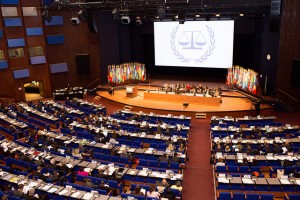 Lithuania, Finland close to ratifying Kampala Amendments, many more supportive at Assembly of States Parties: At a Side Event organized by Liechtenstein and the Global Institute on the Prevention of Aggression, Lithuania announced that its domestic ratification procedures had been completed, and that it would soon deposit its instrument of ratification to the Kampala Amendments with the Secretary-General. The process in Finland was also well advanced, with ratification before the end of the year likely. Many States Parties also used the opportunity of the General Debate to express their support for the amendments. Luxembourg, speaking for the European Union, noted the recent ratifications of the amendments. States including Botswana, Costa Rica and Uruguay called on States to ratify the amendments. Others, including Switzerland and Brazil, urged their early activation.
Lithuania, Finland close to ratifying Kampala Amendments, many more supportive at Assembly of States Parties: At a Side Event organized by Liechtenstein and the Global Institute on the Prevention of Aggression, Lithuania announced that its domestic ratification procedures had been completed, and that it would soon deposit its instrument of ratification to the Kampala Amendments with the Secretary-General. The process in Finland was also well advanced, with ratification before the end of the year likely. Many States Parties also used the opportunity of the General Debate to express their support for the amendments. Luxembourg, speaking for the European Union, noted the recent ratifications of the amendments. States including Botswana, Costa Rica and Uruguay called on States to ratify the amendments. Others, including Switzerland and Brazil, urged their early activation.
Photo courtesy of the Coalition for the ICC
NEWS: All invited to discuss ratification and activation of the Kampala Amendments at Assembly of States Parties
 All invited to discuss ratification and activation of the Kampala Amendments at Assembly of States Parties: The Permanent Mission of Liechtenstein to the United Nations and the Global Institute for the Prevention of Aggression invite all participants in the fourteenth session of the Assembly of States Parties to the Rome Statute to attend a side event entitled “Towards the activation of the Kampala Amendments on the crime of aggression.” The event will take place on Tuesday, 24 November at 9:00 a.m. at the World Forum Conference Centre in Europe 1 & 2. Please have a look at our upcoming events page for further details. We hope to see you there!
All invited to discuss ratification and activation of the Kampala Amendments at Assembly of States Parties: The Permanent Mission of Liechtenstein to the United Nations and the Global Institute for the Prevention of Aggression invite all participants in the fourteenth session of the Assembly of States Parties to the Rome Statute to attend a side event entitled “Towards the activation of the Kampala Amendments on the crime of aggression.” The event will take place on Tuesday, 24 November at 9:00 a.m. at the World Forum Conference Centre in Europe 1 & 2. Please have a look at our upcoming events page for further details. We hope to see you there!
Photo courtesy of the Coalition for the ICC
NEWS: Widespread support for Kampala Amendments at UN debate on ICC:
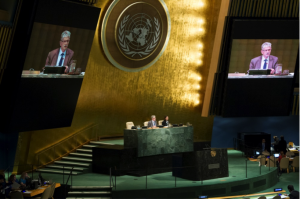 Widespread support for Kampala Amendments at UN debate on ICC: The Kampala Amendments on the crime of aggression were on the minds of many States Parties taking part in the annual debate of the United Nations General Assembly on the International Criminal Court. States, such as the 14 Member States of the Caribbean Community (CARICOM), welcomed the 24 ratifications of the crime of aggression amendments to date. Others, like Madagascar, renewed their commitment to an early ratification of the amendments. The newest State Party to ratify both sets of Kampala Amendments, Switzerland, called on others to follow suit – a call that was echoed by many other speakers including Liechtenstein. There was also a strong urge to activate the amendments as early as possible – a sentiment expressed by Cyprus, Brazil and others. The Kampala Amendments were also taken up by non-States Parties, with the United States and China reiterating their reservations.
Widespread support for Kampala Amendments at UN debate on ICC: The Kampala Amendments on the crime of aggression were on the minds of many States Parties taking part in the annual debate of the United Nations General Assembly on the International Criminal Court. States, such as the 14 Member States of the Caribbean Community (CARICOM), welcomed the 24 ratifications of the crime of aggression amendments to date. Others, like Madagascar, renewed their commitment to an early ratification of the amendments. The newest State Party to ratify both sets of Kampala Amendments, Switzerland, called on others to follow suit – a call that was echoed by many other speakers including Liechtenstein. There was also a strong urge to activate the amendments as early as possible – a sentiment expressed by Cyprus, Brazil and others. The Kampala Amendments were also taken up by non-States Parties, with the United States and China reiterating their reservations.
For more information see:
NEWS: Switzerland ratifies Kampala Amendments as the 24th State
 Switzerland ratifies Kampala Amendments as the 24th State: On 10 September 2015, Jürg Lauber, Permanent Representative of the Switzerland to the UN, deposited his country’s instrument of ratification of the Kampala Amendments. Switzerland was a key player in the negotiations leading up to the Kampala conference in 2010 and at the conference itself. Switzerland helped bridge gaps and thus ensured the successful adoption of the compromise. With 24 ratifications, we are getting closer to achieving the milestone of 30 ratifications in the near future.
Switzerland ratifies Kampala Amendments as the 24th State: On 10 September 2015, Jürg Lauber, Permanent Representative of the Switzerland to the UN, deposited his country’s instrument of ratification of the Kampala Amendments. Switzerland was a key player in the negotiations leading up to the Kampala conference in 2010 and at the conference itself. Switzerland helped bridge gaps and thus ensured the successful adoption of the compromise. With 24 ratifications, we are getting closer to achieving the milestone of 30 ratifications in the near future.
Photo: (from left to right) Christian Wenaweser, Ambassador of Liechtenstein to the UN; Jürg Lauber, Ambassador of Switzerland to the UN; Santiago Villalpando, Chief of the UN’s Treaty Section.
NEWS: Parliamentarians pledge ratification of the Kampala Amendments
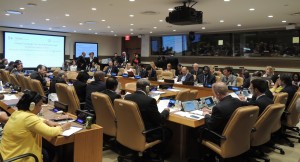 Parliamentarians pledge ratification of the Kampala Amendments: At an event hosted by Liechtenstein, Parliamentarians for Global Action (PGA) and the Global Institute for the Prevention of Aggression, several members of parliament pledged to work to support the ratification of the Kampala Amendments within their own countries. Parliamentarians were able to hear a video message from former Nuremberg Prosecutor Benjamin Ferencz, and listen to remarks by Albert Frick (President, Parliamentarians for Global Action), Felipe Michelini (former Member of Parliament, Uruguay) and Stefan Barriga (Deputy Permanent Representative of Liechtenstein to the UN). Speakers of the Parliaments of Madagascar and Senegal then offered commentaries, in which they underscored the importance of the Kampala Amendments and pledged to facilitate their ratification. After an interesting question-and-answer session, Mark Pritchard (Member of the UK House of Commons, Rapporteur of PGA) and Minou Tavarez Mirabal (Member of the Parliament of the Dominican Republic and President of PGA) gave concluding remarks.
Parliamentarians pledge ratification of the Kampala Amendments: At an event hosted by Liechtenstein, Parliamentarians for Global Action (PGA) and the Global Institute for the Prevention of Aggression, several members of parliament pledged to work to support the ratification of the Kampala Amendments within their own countries. Parliamentarians were able to hear a video message from former Nuremberg Prosecutor Benjamin Ferencz, and listen to remarks by Albert Frick (President, Parliamentarians for Global Action), Felipe Michelini (former Member of Parliament, Uruguay) and Stefan Barriga (Deputy Permanent Representative of Liechtenstein to the UN). Speakers of the Parliaments of Madagascar and Senegal then offered commentaries, in which they underscored the importance of the Kampala Amendments and pledged to facilitate their ratification. After an interesting question-and-answer session, Mark Pritchard (Member of the UK House of Commons, Rapporteur of PGA) and Minou Tavarez Mirabal (Member of the Parliament of the Dominican Republic and President of PGA) gave concluding remarks.
Links to select materials follow below:
In the Nuremberg Spirit, Donald M. Ferencz calls for ratification of the Kampala Amendments
 In the Nuremberg Spirit, Donald M. Ferencz calls for ratification of the Kampala Amendments: Writing on the crime of aggression, deterrence and the International Criminal Court, Donald M. Ferencz, Convenor of the Global Institute for the Prevention of Aggression, called on States to ratify the Kampala Amendments on the crime of aggression. This would serve to build on the historic legal precedent established at Nuremberg and on their pledge to save succeeding generations from the scourge of war.
In the Nuremberg Spirit, Donald M. Ferencz calls for ratification of the Kampala Amendments: Writing on the crime of aggression, deterrence and the International Criminal Court, Donald M. Ferencz, Convenor of the Global Institute for the Prevention of Aggression, called on States to ratify the Kampala Amendments on the crime of aggression. This would serve to build on the historic legal precedent established at Nuremberg and on their pledge to save succeeding generations from the scourge of war.
Read the full article on the Website of the Institute for 21st Century Questions.
NEWS: 70th Anniversary of VE Day, 3rd anniversary of the first ratification of the Kampala Amendments
 70th Anniversary of VE Day, 3rd anniversary of the first ratification of the Kampala Amendments: 70 years ago today, Nazi Germany surrendered unconditionally, marking the end of the Second World War in Europe. The aftermath of this war that caused untold suffering amongst millions saw the creation of the Nuremberg and Tokyo Tribunals – the only international courts so far empowered to try individuals for the crime of aggression. While the following decades saw the prohibition of the illegal use of force cemented into international law in the Charter of the United Nations, no international court has been able to hold transgressors to account. The Kampala Amendments on the crime of aggression present a historic opportunity to change that, to allow the International Criminal Court to adjudge those most responsible for the most serious illegal uses of force. Three years ago, Liechtenstein became the first State to ratify the Kampala Amendments on the crime of aggression. As of today, 23 States have ratified the amendments, paving the way for their activation in 2017. Let us honor all victims of aggressive war by making this a reality.
70th Anniversary of VE Day, 3rd anniversary of the first ratification of the Kampala Amendments: 70 years ago today, Nazi Germany surrendered unconditionally, marking the end of the Second World War in Europe. The aftermath of this war that caused untold suffering amongst millions saw the creation of the Nuremberg and Tokyo Tribunals – the only international courts so far empowered to try individuals for the crime of aggression. While the following decades saw the prohibition of the illegal use of force cemented into international law in the Charter of the United Nations, no international court has been able to hold transgressors to account. The Kampala Amendments on the crime of aggression present a historic opportunity to change that, to allow the International Criminal Court to adjudge those most responsible for the most serious illegal uses of force. Three years ago, Liechtenstein became the first State to ratify the Kampala Amendments on the crime of aggression. As of today, 23 States have ratified the amendments, paving the way for their activation in 2017. Let us honor all victims of aggressive war by making this a reality.
Photo: War devastates the city of Warsaw, World War II
NEWS: Second Benjamin B. Ferencz Essay Competition now accepting entries
 Second Benjamin B. Ferencz Essay Competition now accepting entries: All comers are invited to reflect on the relationship between jus ad bellum and jus in bello in the context of modern war crimes trials. Expressions of intent to participate are invited by 15 May. The winning essay will win $10,000, with $2,500 for the second and third placed entries. The competition is hosted by Prof. Michael Scharf, member of the Global Institute for the Prevention of Aggression’s Council of Advisers. Further details are available on the website of the Frederick K. Cox International Law Center. The inaugural essay competition addressed the question of the illegal use of force as a crime against humanity.
Second Benjamin B. Ferencz Essay Competition now accepting entries: All comers are invited to reflect on the relationship between jus ad bellum and jus in bello in the context of modern war crimes trials. Expressions of intent to participate are invited by 15 May. The winning essay will win $10,000, with $2,500 for the second and third placed entries. The competition is hosted by Prof. Michael Scharf, member of the Global Institute for the Prevention of Aggression’s Council of Advisers. Further details are available on the website of the Frederick K. Cox International Law Center. The inaugural essay competition addressed the question of the illegal use of force as a crime against humanity.
NEWS: Swiss parliament approves ratification of the Kampala Amendments
 Swiss parliament approves ratification of the Kampala Amendments: On 20 March, the Swiss Federal Assembly unanimously approved the ratification of the Kampala Amendments. Ratification had previously been recommended by both the upper and the lower chambers of the Federal Assembly on 27 November 2014 and 9 March 2015, respectively. Switzerland thus remains on track to deposit its instrument of ratification in summer 2015.
Swiss parliament approves ratification of the Kampala Amendments: On 20 March, the Swiss Federal Assembly unanimously approved the ratification of the Kampala Amendments. Ratification had previously been recommended by both the upper and the lower chambers of the Federal Assembly on 27 November 2014 and 9 March 2015, respectively. Switzerland thus remains on track to deposit its instrument of ratification in summer 2015.
You can track the Kampala Amendments’ progress through the Federal Assembly in German and French.
NEWS: Czech Republic 23rd State to ratify Kampala Amendments
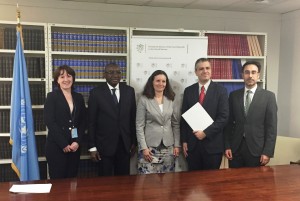 Czech Republic 23rd State to ratify Kampala Amendments: On 12 March 2015, Edita Hrdá, Permanent Representative of the Czech Republic deposited her country’s instrument of ratification of the Kampala Amendments. Sidiki Kaba, President of the Assembly of States Parties to the Rome Statute witnessed the event. The Eastern European region continues its leadership role in the ratification of the Kampala Amendments: 8 of the 18 Eastern European States Parties have now ratified the amendments, with the remainder having pledged to do so soon. With several domestic ratification processes nearing completion, we remain on track to achieve the milestone of 30 ratifications in the first half of 2015.
Czech Republic 23rd State to ratify Kampala Amendments: On 12 March 2015, Edita Hrdá, Permanent Representative of the Czech Republic deposited her country’s instrument of ratification of the Kampala Amendments. Sidiki Kaba, President of the Assembly of States Parties to the Rome Statute witnessed the event. The Eastern European region continues its leadership role in the ratification of the Kampala Amendments: 8 of the 18 Eastern European States Parties have now ratified the amendments, with the remainder having pledged to do so soon. With several domestic ratification processes nearing completion, we remain on track to achieve the milestone of 30 ratifications in the first half of 2015.
- You can read ASP President Kaba’s statement here.
Photo (from left to right): Petra Benešová (Mission of the Czech Republic to the UN), Sidiki Kaba (President of the ICC Assembly of States Parties), Edita Hrdá (Permanent Representative of the Czech Republic to the UN), Santiago Villalpando (Head, UN Treaty Section) and Stefan Barriga (Deputy Permanent Representative of Liechtenstein to the UN).
NEWS: Wave of ratifications continues as Costa Rica becomes 22nd State Party to Kampala Amendments
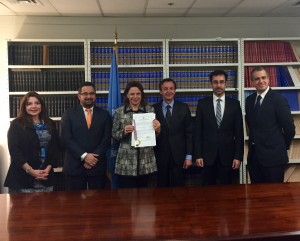 Wave of ratifications continues as Costa Rica becomes 22nd State Party to Kampala Amendments: On 5 February 2015, the Vice President of Costa Rica, Ms. Ana Helena Chacón Echeverría, deposited her country’s instrument of ratification of the Kampala Amendments. Costa Rica became the 22nd State Party to ratify the amendments overall and the second in as many weeks. The Latin American region played a crucial role in negotiation of the crime of aggression amendments; many States Parties from the region are expected to ratify the amendments in the near future. We remain confident that the threshold of 30 ratifications needed for the activation of the amendments on the crime of aggression will be reached well before the end of 2015.
Wave of ratifications continues as Costa Rica becomes 22nd State Party to Kampala Amendments: On 5 February 2015, the Vice President of Costa Rica, Ms. Ana Helena Chacón Echeverría, deposited her country’s instrument of ratification of the Kampala Amendments. Costa Rica became the 22nd State Party to ratify the amendments overall and the second in as many weeks. The Latin American region played a crucial role in negotiation of the crime of aggression amendments; many States Parties from the region are expected to ratify the amendments in the near future. We remain confident that the threshold of 30 ratifications needed for the activation of the amendments on the crime of aggression will be reached well before the end of 2015.
Photo: (from left to right) Gina Guillen, Mission of Costa Rica; Amb. Juan Carlos Mendoza-Garcia, Ambassador of Costa Rica to the United Nations; Vice President Ana Helena Chacón Echeverría; Amb. Sebastiano Cardi, Vice President of the ICC’s Assembly of States Parties; Stefan Barriga, Deputy Permanent Representative of Liechtenstein to the UN; Santiago Villalpando, Head of the UN Treaty Section.
NEWS: First Kampala Amendment Ratification of 2015: Malta!
 First Kampala Amendment Ratification of 2015: Malta! On 29 January 2015, Malta deposited its instrument of ratification of the Kampala Amendments, becoming the 21st State Party to do so. Malta becomes the 13th Member State of the European Union to have ratified the amendments, with further EU Member States expected to ratify soon. Indeed, we remain confident that the threshold of 30 ratifications needed for the activation of the amendments on the crime of aggression will be reached well before the end of 2015. At least two more ratifications are expected during the next few weeks – stay tuned!
First Kampala Amendment Ratification of 2015: Malta! On 29 January 2015, Malta deposited its instrument of ratification of the Kampala Amendments, becoming the 21st State Party to do so. Malta becomes the 13th Member State of the European Union to have ratified the amendments, with further EU Member States expected to ratify soon. Indeed, we remain confident that the threshold of 30 ratifications needed for the activation of the amendments on the crime of aggression will be reached well before the end of 2015. At least two more ratifications are expected during the next few weeks – stay tuned!
Photo: Ambassador Grima depositing the instrument of ratification. Courtesy of UN
NEWS: Georgia 20th State to ratify Kampala Amendments
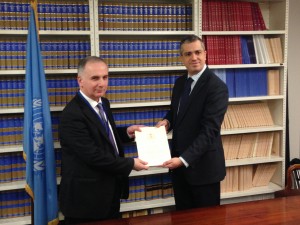 Georgia 20th State to ratify Kampala Amendments: On 5 December 2014, Gocha Lordkipanidze, Deputy Minister of Justice of Georgia deposited his country’s instrument of ratification of the Kampala Amendments. The Eastern European region continues its leadership role in the ratification of the Kampala Amendments: 7 of the 18 Eastern European States Parties have now ratified the amendments, with the remainder having pledged to do so soon. With this 20th ratification, our campaign has reached the two-thirds point towards the goal of achieving 30 ratifications by the end of 2015, and thus allowing for the activation of the amendments in early 2017.
Georgia 20th State to ratify Kampala Amendments: On 5 December 2014, Gocha Lordkipanidze, Deputy Minister of Justice of Georgia deposited his country’s instrument of ratification of the Kampala Amendments. The Eastern European region continues its leadership role in the ratification of the Kampala Amendments: 7 of the 18 Eastern European States Parties have now ratified the amendments, with the remainder having pledged to do so soon. With this 20th ratification, our campaign has reached the two-thirds point towards the goal of achieving 30 ratifications by the end of 2015, and thus allowing for the activation of the amendments in early 2017.
Speaking at the ratification ceremony, Deputy Minister of Justice of Lordkipanidze said, “depositing the instrument of ratification is our contribution to setting stage for what the UN Secretary-General called ‘paradigm shift in international law and international relations.’ It constitutes a major effort by Georgia to build a global culture of individual criminal accountability for the commission of the crime of aggression through strengthening the ICC’s jurisdiction and facilitating the timely activation of the Kampala Amendments.”
At least one further ratification is expected during the course of the Assembly of States Parties, which starts on Monday, 8 December 2014. Follow our twitter feed @CrimeAggression for the latest updates.
NEWS: Swiss upper house votes for ratification of the Kampala Amendments
 Swiss upper house votes for ratification of the Kampala Amendments: On 27 November, the Council of States, upper chamber of the Federal Assembly of Switzerland, approved ratification of the Kampala Amendments. Its Legal Committee had previously recommended ratification by unanimous vote. The National Council, lower chamber of the Swiss parliament, is scheduled to take up the matter in spring 2015. Switzerland thus remains on track to deposit its instrument of ratification in 2015.
Swiss upper house votes for ratification of the Kampala Amendments: On 27 November, the Council of States, upper chamber of the Federal Assembly of Switzerland, approved ratification of the Kampala Amendments. Its Legal Committee had previously recommended ratification by unanimous vote. The National Council, lower chamber of the Swiss parliament, is scheduled to take up the matter in spring 2015. Switzerland thus remains on track to deposit its instrument of ratification in 2015.
The Council of States’ press release is available in French and German.
The minutes of the Council of States’ debate on the amendments is also available online (in French and German).
NEWS: San Marino ratifies Crime of Aggression Amendments
 San Marino ratifies Crime of Aggression Amendments: On 14 November, San Marino became the 19th State to ratify the Kampala Amendments on the crime of aggression. San Marino had previously ratified those related to war crimes on 21 September 2011. Our campaign remains on track to achieve 30 ratifications by the end of 2015, and thus allowing for the activation of the amendments in early 2017.
San Marino ratifies Crime of Aggression Amendments: On 14 November, San Marino became the 19th State to ratify the Kampala Amendments on the crime of aggression. San Marino had previously ratified those related to war crimes on 21 September 2011. Our campaign remains on track to achieve 30 ratifications by the end of 2015, and thus allowing for the activation of the amendments in early 2017.
NEWS: Georgian Parliament approves ratification of Kampala Amendments
 Georgian Parliament approves ratification of Kampala Amendments: On 1 October 2014 the Parliament of Georgia agreed to the ratification of the Kampala Amendments to the Rome Statute. Georgia is on track to become the 18th State Party to the Kampala Amendments on the crime of aggression, and would be the seventh State in Eastern Europe (completed EEG ratifications: Croatia, Estonia, Latvia, Poland, Slovakia, Slovenia) to ratify.
Georgian Parliament approves ratification of Kampala Amendments: On 1 October 2014 the Parliament of Georgia agreed to the ratification of the Kampala Amendments to the Rome Statute. Georgia is on track to become the 18th State Party to the Kampala Amendments on the crime of aggression, and would be the seventh State in Eastern Europe (completed EEG ratifications: Croatia, Estonia, Latvia, Poland, Slovakia, Slovenia) to ratify.
NEWS: Spain, Latvia and Poland ratify Kampala amendments
 Spain, Latvia and Poland ratify Kampala amendments: At the margins of the high-level week in New York, the Foreign Ministers of Spain and Latvia and the Deputy Foreign Minister of Poland all deposited their countries’ ratification instruments of the Kampala amendments to the Rome Statute. This brings the total number of ratification to 18. 30 ratifications are required to activate the ICC’s jurisdiction over the crime of aggression. The Foreign Minister of Liechtenstein, the Director of the UN Department of Belgium and the President of the Assembly of States Parties were also present to pay tribute. The Campaign will continue to work on getting more ratifications in the upcoming months and we will keep you informed.
Spain, Latvia and Poland ratify Kampala amendments: At the margins of the high-level week in New York, the Foreign Ministers of Spain and Latvia and the Deputy Foreign Minister of Poland all deposited their countries’ ratification instruments of the Kampala amendments to the Rome Statute. This brings the total number of ratification to 18. 30 ratifications are required to activate the ICC’s jurisdiction over the crime of aggression. The Foreign Minister of Liechtenstein, the Director of the UN Department of Belgium and the President of the Assembly of States Parties were also present to pay tribute. The Campaign will continue to work on getting more ratifications in the upcoming months and we will keep you informed.
from left Tiina Intelmann (President of the Assembly of States Parties), Werner Bauwens (Director of the UN Department of Belgium), Aurelia Frick (Foreign Minister of Liechtenstein), José García-Margallo y Marfil (Foreign Minister of Spain), Edgars Rinkēvičs (Foreign Minister of Latvia), Henryka Mościcka-Dendys (Deputy Foreign Minister of Poland) and Miguel de Serpa Soares (United Nations Legal Counsel)
NEWS: Vale Hans-Peter Kaul
 Vale Hans-Peter Kaul: Hans-Peter Kaul, retired ICC judge, head of the German delegation to the Rome Conference and member of the Global Institute’s Council of Advisers, died on 21 July 2014. He leaves behind a rich and unique legacy, having had an impact on international criminal law, the International Criminal Court and the fight to criminalize the illegal use of force that will be felt for many years to come.
Vale Hans-Peter Kaul: Hans-Peter Kaul, retired ICC judge, head of the German delegation to the Rome Conference and member of the Global Institute’s Council of Advisers, died on 21 July 2014. He leaves behind a rich and unique legacy, having had an impact on international criminal law, the International Criminal Court and the fight to criminalize the illegal use of force that will be felt for many years to come.
As head of the German delegation at the Rome Conference, Judge Kaul played an instrumental role in ensuring the adoption of the Rome Statute, in safeguarding the judicial independence of the Court, and in securing the inclusion of the crime of aggression on the list of crimes over which the Court has jurisdiction. Among the first judges elected to serve on the bench of the ICC and assigned to the Pre-Trial Division, Hans-Peter contributed to the formation of the Court’s jurisprudence and was instrumental in setting up the Court’s institutions. He also remained a tireless advocate for activation of the Court’s jurisdiction over the crime of aggression.
Upon joining the Council of Advisers of the Global Institute for the Prevention of aggression, Hans-Peter made the following statement:
“It is … my firm conviction that aggressive war-making … and the use of unjustified armed force inevitably lead, time and again, to mass atrocities. I strongly believe that there can be no successful prevention of war crimes and crimes against humanity without the effective criminalisation and prosecution of aggressive war-making.”
Hans-Peter never wavered in his commitment and always persevered in his fight for the cause in which he so strongly believed. His leadership will remain exemplary. We are grateful to have worked with Hans-Peter and for the support and friendship he extended to us, and we are committed to honoring his legacy. The thoughts of all those who work on this campaign are with his wife Elisabeth.
NEWS: Expert panel discusses policy options in ratifying the Kampala amendments
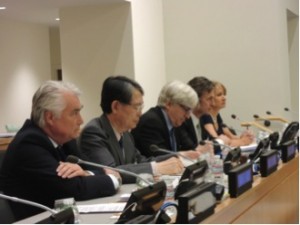 Expert panel discusses policy options in ratifying the Kampala amendments: At an event organized in celebration of International Justice Day, 17 July, experts discussed the policy dimension of the Kampala Amendments. Christian Wenaweser, Permanent Representative of Liechtenstein to the UN, emphasized that it was unlikely that the ICC’s focus on genocide, crimes against humanity and war crimes would change, even after the activation of the aggression amendments in 2017. Beth van Schaack, Professor at Santa Clara Law, sounded a note of caution, noting that a number of issues regarding the aggression amendments still needed to be resolved, and that States should be cautious in implementing the amendments. Focusing on Eastern Europe, Andrej Logar, Permanent Representative of Slovenia to the UN said States from the region were leaders in ratifying the Kampala Amendments. His own country had both ratified and implemented the amendments. The ICC would be ready to deal with the crime when it was activated, said Sang-Hyun Song, President of the Court, though adjustments to the rules and regulations of the Court, as well as in the budget, may become necessary.
Expert panel discusses policy options in ratifying the Kampala amendments: At an event organized in celebration of International Justice Day, 17 July, experts discussed the policy dimension of the Kampala Amendments. Christian Wenaweser, Permanent Representative of Liechtenstein to the UN, emphasized that it was unlikely that the ICC’s focus on genocide, crimes against humanity and war crimes would change, even after the activation of the aggression amendments in 2017. Beth van Schaack, Professor at Santa Clara Law, sounded a note of caution, noting that a number of issues regarding the aggression amendments still needed to be resolved, and that States should be cautious in implementing the amendments. Focusing on Eastern Europe, Andrej Logar, Permanent Representative of Slovenia to the UN said States from the region were leaders in ratifying the Kampala Amendments. His own country had both ratified and implemented the amendments. The ICC would be ready to deal with the crime when it was activated, said Sang-Hyun Song, President of the Court, though adjustments to the rules and regulations of the Court, as well as in the budget, may become necessary.
In the subsequent discussion, Spain and Poland announced that their national ratification processes were coming to an end, and that they hoped to deposit their instruments of ratification by the end of September.
Photo (from left to right): Andrej Logar (Permanent Representative of Slovenia to the UN), Sang-Hyun Song (President, ICC), David Tolbert (Moderator, President, ICTJ), Christian Wenaweser (Permanent Representative of Liechtenstein to the UN), Beth van Schaack (Professor, Santa Clara Law)
NEWS: European Parliament calls for Ratifications of the Kampala Amendments
 European Parliament calls for Ratifications of the Kampala Amendments: On 17 July, in a resolution supported across party lines, the European Parliament expressed its support for the Kampala Amendments on the Crime of Aggression. In plain language, it called on EU Member States to ratify the amendments and support their activation. The EU as a whole was encouraged to develop a common position on the Crime of Aggression and to promote the ratification of the Rome Statute as amended with its external partners.
European Parliament calls for Ratifications of the Kampala Amendments: On 17 July, in a resolution supported across party lines, the European Parliament expressed its support for the Kampala Amendments on the Crime of Aggression. In plain language, it called on EU Member States to ratify the amendments and support their activation. The EU as a whole was encouraged to develop a common position on the Crime of Aggression and to promote the ratification of the Rome Statute as amended with its external partners.
The resolution was initiated by the Green MEP and member of Parliamentarians for Global Action Barbara Lochbihler who said “EU governments can play a crucial role […] by ratifying the ‘Kampala Amendment.’” This sentiment was echoed by Liechtenstein’s Ambassador to the UN, Christian Wenaweser who noted that “this decision places the amendments in the context of the campaign for universality of the Rome Statute and is a significant contribution to the acceptance of the revised Rome Statute.”
- Text of the resolution
- Parliamentarians for Global Action Press Release
- The Greens / European Free Alliance Press Release
NEWS:Austria 15th State to ratify Kampala Amendments
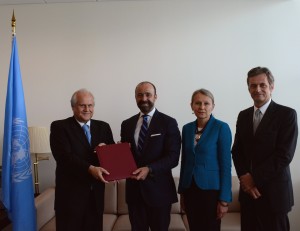 Austria 15th State to ratify Kampala Amendments: On 17 July, Martin Sajdik, Permanent Representative of Austria to the United Nations, deposited his country’s instrument of ratification of the Kampala Amendments. With this 15th ratification, our campaign has reached a halfway point towards the goal of achieving 30 ratifications by the end of 2015, and thus allowing for the activation of the amendments in early 2017. Austria has become the ninth Member State of the European Union to ratify the amendments.
Austria 15th State to ratify Kampala Amendments: On 17 July, Martin Sajdik, Permanent Representative of Austria to the United Nations, deposited his country’s instrument of ratification of the Kampala Amendments. With this 15th ratification, our campaign has reached a halfway point towards the goal of achieving 30 ratifications by the end of 2015, and thus allowing for the activation of the amendments in early 2017. Austria has become the ninth Member State of the European Union to ratify the amendments.
Please follow us on twitter @CrimeAggression for the latest news on this International Justice Day.
Photo: UN/Win Khine
NEWS: Upcoming Panel Discussion: “Into the homestretch – towards the activation of the Kampala Amendments on the Crime of Aggression“
U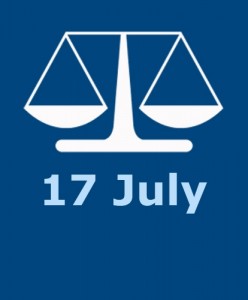 pcoming Panel Discussion: “Into the homestretch – towards the activation of the Kampala Amendments on the Crime of Aggression“: The Mission of Liechtenstein and the Global Institute for the Prevention of Aggression will be commemorating 17 July, International Criminal Justice Day, with a panel discussion on the crime of aggression at UN Headquarters in New York. The panel will feature Judge Sang-Hyun Song, President of the International Criminal Court, renowned international legal scholar Beth van Schaack, as well as the Permanent Representatives of Liechtenstein and Slovenia to the United Nations. It will be moderated by David Tolbert, President of the International Center for Transitional Justice. The panelists will explore the relevance of the amendments and the challenges ahead of their activation in 2017.
pcoming Panel Discussion: “Into the homestretch – towards the activation of the Kampala Amendments on the Crime of Aggression“: The Mission of Liechtenstein and the Global Institute for the Prevention of Aggression will be commemorating 17 July, International Criminal Justice Day, with a panel discussion on the crime of aggression at UN Headquarters in New York. The panel will feature Judge Sang-Hyun Song, President of the International Criminal Court, renowned international legal scholar Beth van Schaack, as well as the Permanent Representatives of Liechtenstein and Slovenia to the United Nations. It will be moderated by David Tolbert, President of the International Center for Transitional Justice. The panelists will explore the relevance of the amendments and the challenges ahead of their activation in 2017.
All are invited to attend. Please have a look at our upcoming events page for more information, including how to register.
NEWS: Foreign Ministers of Slovenia and Liechtenstein call for ratification of Kampala Amendments
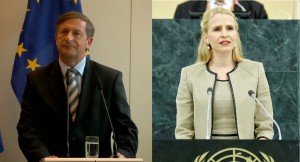 Foreign Ministers of Slovenia and Liechtenstein call for ratification of Kampala Amendments: The open letter was penned by Karl Erjavec, Deputy Prime Minister and Minister of Foreign Affairs of Slovenia and Aurelia Frick, Minister of Foreign Affairs of Liechtenstein on the occasion of the regional workshop for Eastern Europe. In their letter, the ministers take stock of the founding and operation of the International Criminal Court, concluding that “never before has international criminal justice been such an important factor in the international community’s response to violent conflict.” They then turn to the Kampala Amendments on the crime of aggression which will enable the ICC to help to enforce a key provision of the Charter of the United Nations. Activation of the amendments would be a triumph of principles over politics. “We invite all our fellow ICC States Parties to join us on this path and call upon States not Parties to the Rome Statute to embrace the ICC and, by so doing, join the fight against impunity,” the ministers conclude.
Foreign Ministers of Slovenia and Liechtenstein call for ratification of Kampala Amendments: The open letter was penned by Karl Erjavec, Deputy Prime Minister and Minister of Foreign Affairs of Slovenia and Aurelia Frick, Minister of Foreign Affairs of Liechtenstein on the occasion of the regional workshop for Eastern Europe. In their letter, the ministers take stock of the founding and operation of the International Criminal Court, concluding that “never before has international criminal justice been such an important factor in the international community’s response to violent conflict.” They then turn to the Kampala Amendments on the crime of aggression which will enable the ICC to help to enforce a key provision of the Charter of the United Nations. Activation of the amendments would be a triumph of principles over politics. “We invite all our fellow ICC States Parties to join us on this path and call upon States not Parties to the Rome Statute to embrace the ICC and, by so doing, join the fight against impunity,” the ministers conclude.
The full text of the open letter is available online.
Photo credit: Kris Kotarski/Wayamo Foundation and United Nations
NEWS: Successful conclusion of regional workshop for Eastern Europe
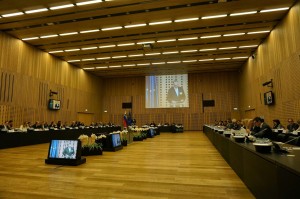 Successful conclusion of regional workshop for Eastern Europe: The two-day seminar brought together States from the Eastern European region to discuss the ratification and implementation of the Kampala amendments on the crime of aggression. There is no doubt that the region is on the leading edge of the fight against illegal war making: four States from the region have ratified the amendments (Croatia, Estonia, Slovakia, Slovenia), five more are expected to ratify before the end of the year (Albania, Czech Republic, Georgia, Macedonia, Poland), and the remaining nine are working on the ratification process. Speakers at the workshop included Karl Erjavec, Minister for Foreign Affairs of Slovenia and UN Secretary-General Ban Ki-moon, who contributed a video message, as well as the Presidents of the International Criminal Court and its Assembly of States Parties.
Successful conclusion of regional workshop for Eastern Europe: The two-day seminar brought together States from the Eastern European region to discuss the ratification and implementation of the Kampala amendments on the crime of aggression. There is no doubt that the region is on the leading edge of the fight against illegal war making: four States from the region have ratified the amendments (Croatia, Estonia, Slovakia, Slovenia), five more are expected to ratify before the end of the year (Albania, Czech Republic, Georgia, Macedonia, Poland), and the remaining nine are working on the ratification process. Speakers at the workshop included Karl Erjavec, Minister for Foreign Affairs of Slovenia and UN Secretary-General Ban Ki-moon, who contributed a video message, as well as the Presidents of the International Criminal Court and its Assembly of States Parties.
Statements:
UN Secretary-General’s message
Ben Ferencz’s message
President Song‘s statement.
UN Legal Counsel‘s statement.
Press Releases:
Press Release by the Ministry of Foreign Affairs of Slovenia
Joint Press Release
Photo: Kris Kotarski / Wayamo Foundation
NEWS: Prohibiting the illegal use of force – promoting of the Kampala Amendments in Eastern Europe:
 Prohibiting the illegal use of force – promoting of the Kampala Amendments in Eastern Europe: On 15 and 16 May, Slovenia, Liechtenstein and the Global Institute for the Prevention of Aggression will be hosting a workshop on the Kampala Amendments and the universality of the Rome Statute in Ljubljana, Slovenia. The high-level segment will feature ICC-President Judge Song, UN Under-Secretary-General for Legal Affairs Serpa Soares, President of the ICC-States Parties Intelmann and Slovenian Foreign Minister Erjavec, as well as video messages by UN Secretary-General Ban Ki-moon and Ben Ferencz. Four of the 18 Eastern European States Parties have ratified the amendments (most recently Slovakia on 18 April 2014), and several others will do so in the near future. The workshop aims to encourage even more States in the region to ratify and to provide concrete assistance for this process. Eastern European States which have not joined the Rome Statute yet are also invited.
Prohibiting the illegal use of force – promoting of the Kampala Amendments in Eastern Europe: On 15 and 16 May, Slovenia, Liechtenstein and the Global Institute for the Prevention of Aggression will be hosting a workshop on the Kampala Amendments and the universality of the Rome Statute in Ljubljana, Slovenia. The high-level segment will feature ICC-President Judge Song, UN Under-Secretary-General for Legal Affairs Serpa Soares, President of the ICC-States Parties Intelmann and Slovenian Foreign Minister Erjavec, as well as video messages by UN Secretary-General Ban Ki-moon and Ben Ferencz. Four of the 18 Eastern European States Parties have ratified the amendments (most recently Slovakia on 18 April 2014), and several others will do so in the near future. The workshop aims to encourage even more States in the region to ratify and to provide concrete assistance for this process. Eastern European States which have not joined the Rome Statute yet are also invited.
For more information, see upcoming events as well as the event’s programme.
Media representatives are invited to a press conference. Any enquiries about media coverage of the workshop should be sent to Bettina Ambach (Bettina@bettinaambach.de).
Photo © tourism-ljubljana
NEWS: Slovakia ratifies Kampala Amendments
 Slovakia ratifies Kampala Amendments: On 28 April 2014, State Secretary Peter Burian deposited Slovakia’s instrument of ratification of the Kampala Amendments at the United Nations. Slovakia is the 14th State to have ratified the Kampala Amendments on the Crime of Aggression, the fourth Eastern European State and the seventh NATO Member State to do so. The Ratification comes on the eve of the regional workshop on the Kampala Amendments for the Eastern European region, which will take place in Ljubljana, Slovenia on 15 & 16 May. See our upcoming events page for more information.
Slovakia ratifies Kampala Amendments: On 28 April 2014, State Secretary Peter Burian deposited Slovakia’s instrument of ratification of the Kampala Amendments at the United Nations. Slovakia is the 14th State to have ratified the Kampala Amendments on the Crime of Aggression, the fourth Eastern European State and the seventh NATO Member State to do so. The Ratification comes on the eve of the regional workshop on the Kampala Amendments for the Eastern European region, which will take place in Ljubljana, Slovenia on 15 & 16 May. See our upcoming events page for more information.
Photo © UN/Win Khine: UN Under-Secretary-General for Legal Affairs, Miguel de Serpa Soares (second from right) accepts Slovakia’s instrument of ratification from State Secretary Peter Burian (second from left). Ambassador Tiina Intelmann, President of the Assembly of States Parties to the Rome Statute (on the right) and Ambassador Christian Wenaweser of Liechtenstein (on the left) witness the event.
NEWS: Slovak Parliament approves ratification of Kampala Amendments
 Slovak Parliament approves ratification of Kampala Amendments: On 26 March 2013 the National Council of Slovakia agreed to the ratification of the Kampala Amendments to the Rome Statute. They must now be approved by the Slovak President before an instrument of ratification can be deposited. Prior to the near-unanimous approval by the plenary, the Amendments had been considered by the Foreign Affairs and the Constitutional and Legal Affairs Committees. Slovakia is on track to become the 14th State Party to the Kampala Amendments on the crime of aggression, and would be the fourth State in Eastern Europe to ratify.
Slovak Parliament approves ratification of Kampala Amendments: On 26 March 2013 the National Council of Slovakia agreed to the ratification of the Kampala Amendments to the Rome Statute. They must now be approved by the Slovak President before an instrument of ratification can be deposited. Prior to the near-unanimous approval by the plenary, the Amendments had been considered by the Foreign Affairs and the Constitutional and Legal Affairs Committees. Slovakia is on track to become the 14th State Party to the Kampala Amendments on the crime of aggression, and would be the fourth State in Eastern Europe to ratify.
Photo © AP
NEWS: New Zealand Justice Minister opens Pacific regional workshop
 New Zealand Justice Minister opens Pacific regional workshop: Hon. Judith Collins, MP, Minister of Justice of New Zealand, opened the Pacific regional workshop on the universality of the Rome Statute and the crime of aggression. She noted that “given the history of the Pacific region, the illegal use of force contrary to the United Nations Charter has particular resonance.”
New Zealand Justice Minister opens Pacific regional workshop: Hon. Judith Collins, MP, Minister of Justice of New Zealand, opened the Pacific regional workshop on the universality of the Rome Statute and the crime of aggression. She noted that “given the history of the Pacific region, the illegal use of force contrary to the United Nations Charter has particular resonance.”
Ban Ki-moon, Secretary-General of the United Nations sent a message to the workshop’s opening, in which he said that he looked forward to receiving more instruments of ratification of the Kampala amendments from the region. In his speech, the President of the ICC, Hon Judge Sang-Hyun Song outlined why States from the region should join the Rome Statute.
During the workshop, taking place on 6 and 7 March, participants from Pacific Island States and States from the surrounding Asian region will address topics like the achievements and challenges of the Court’s first 12 years and the road from Rome to Kampala, amongst others. See our past events page for more information.
Relevant documents:
- Minister of Justice’s press release and the full text of her speech.
- United Nations Secretary-General’s message.
- ICC President’s statement.
NEWS: New Zealand Workshop begins with Press Conference
 New Zealand Workshop begins with Press Conference: On the eve of the Workshop for the Universality of the Rome Statute of the International Criminal Court and the Kampala Amendments on the Crime of Aggression in the Pacific Region, New Zealand press were given an opportunity to ask questions relating to the ICC and to the crime of aggression. Hon Judge Sang-Hyun Song (President, ICC), Christian Wenaweser (Liechtenstein’s Ambassador to the UN) and Dr. Penelope Ridings (Legal Adviser to the Ministry of Foreign Affairs and Trade New Zealand) briefed the media on the workshop and the issues to be covered.
New Zealand Workshop begins with Press Conference: On the eve of the Workshop for the Universality of the Rome Statute of the International Criminal Court and the Kampala Amendments on the Crime of Aggression in the Pacific Region, New Zealand press were given an opportunity to ask questions relating to the ICC and to the crime of aggression. Hon Judge Sang-Hyun Song (President, ICC), Christian Wenaweser (Liechtenstein’s Ambassador to the UN) and Dr. Penelope Ridings (Legal Adviser to the Ministry of Foreign Affairs and Trade New Zealand) briefed the media on the workshop and the issues to be covered.
The Audio of Press Conference on ICC Workshop (32:27 minutes) is available to download.
Media from the Pacific region are invited to participate in a telephone press conference (7 March 2014 at 12.30 (NZDT)). Please see the press advisory for further details.
NEWS: Promoting universality of the Rome Statute and the Kampala Amendments in the Pacific Region
 Promoting universality of the Rome Statute and the Kampala Amendments in the Pacific Region: On 6 and 7 March, New Zealand, Liechtenstein and the Global Institute for the Prevention of Aggression will be hosting a workshop on the universality of the Rome Statute and the Kampala Amendments in the Pacific Region. At the present, only 8 of the 16 members of the Pacific Island Forum have ratified the Rome Statute. The aim of the workshop is the encourage ratification of the Rome Statute and the Kampala amendments and to inform States of the resources that States can draw upon to support them in their ratification processes. For more information, see upcoming events.
Promoting universality of the Rome Statute and the Kampala Amendments in the Pacific Region: On 6 and 7 March, New Zealand, Liechtenstein and the Global Institute for the Prevention of Aggression will be hosting a workshop on the universality of the Rome Statute and the Kampala Amendments in the Pacific Region. At the present, only 8 of the 16 members of the Pacific Island Forum have ratified the Rome Statute. The aim of the workshop is the encourage ratification of the Rome Statute and the Kampala amendments and to inform States of the resources that States can draw upon to support them in their ratification processes. For more information, see upcoming events.
Media representatives are invited to a press conference on 5 March. They are further invited to direct any enquiries to Bettina Ambach (Bettina@bettinaambach.de).
Picture Credit: Central Intelligence Agency
NEWS: Austrian Government approves Kampala Amendments
 Austrian government approves Kampala Amendments: On 29 January, the Council of Ministers of Austria approved the ratification of the Kampala Amendments (see the agenda of the Council of Ministers Session, in German). These were subsequently forwarded to parliament for adoption (see the ratification documents before parliament, in German). There are currently 13 States Parties to the Kampala Amendments on the Crime of Aggression. To date, seven Member States of the European Union have ratified the amendments.
Austrian government approves Kampala Amendments: On 29 January, the Council of Ministers of Austria approved the ratification of the Kampala Amendments (see the agenda of the Council of Ministers Session, in German). These were subsequently forwarded to parliament for adoption (see the ratification documents before parliament, in German). There are currently 13 States Parties to the Kampala Amendments on the Crime of Aggression. To date, seven Member States of the European Union have ratified the amendments.
NEWS: Government of Slovakia approves Kampala Amendments
 Government of Slovakia approves Kampala Amendments: On 15 January 2014, the Kampala Amendments to the Rome Statute were approved by the government of Slovakia. The amendments will now be examined by parliament, subject to final ratification by the president. Currently, 13 States Parties have ratified the Kampala Amendments on to the crime of aggression as well as those on article 8 (war crimes). There has been strong interest in the crime of aggression amendments in Eastern Europe, with three States having ratified so far.
Government of Slovakia approves Kampala Amendments: On 15 January 2014, the Kampala Amendments to the Rome Statute were approved by the government of Slovakia. The amendments will now be examined by parliament, subject to final ratification by the president. Currently, 13 States Parties have ratified the Kampala Amendments on to the crime of aggression as well as those on article 8 (war crimes). There has been strong interest in the crime of aggression amendments in Eastern Europe, with three States having ratified so far.
NEWS: Croatia ratifies crime of aggression amendments
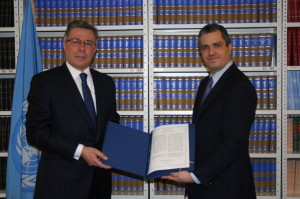 Croatia ratifies crime of aggression amendments: On 20 December, Croatia deposited its instrument of ratification of the Kampala amendments with the Office of Legal Affairs of the United Nations. Like 12 other States before it, Croatia chose to ratify both sets of Kampala amendments – pertaining to war crimes and the crime of aggression – simultaneously. It had already implemented the amendments into its domestic law earlier this year. Croatia is the 10th State to ratify the amendments in 2013, the third Eastern European State to do so, and will be the 13th State Party to the crime of aggression amendments. The Kampala amendments for the crime of aggression will, once activated, allow the International Criminal Court to prosecute individuals for the most severe form of the illegal use of force. They are complementary to the prohibition on the use of force enshrined in the UN Charter.
Croatia ratifies crime of aggression amendments: On 20 December, Croatia deposited its instrument of ratification of the Kampala amendments with the Office of Legal Affairs of the United Nations. Like 12 other States before it, Croatia chose to ratify both sets of Kampala amendments – pertaining to war crimes and the crime of aggression – simultaneously. It had already implemented the amendments into its domestic law earlier this year. Croatia is the 10th State to ratify the amendments in 2013, the third Eastern European State to do so, and will be the 13th State Party to the crime of aggression amendments. The Kampala amendments for the crime of aggression will, once activated, allow the International Criminal Court to prosecute individuals for the most severe form of the illegal use of force. They are complementary to the prohibition on the use of force enshrined in the UN Charter.
Photo © Mission of Croatia to the UN /Zoran Joković
NEWS: Belgium ratifies crime of aggression amendments
 Belgium ratifies crime of aggression amendments: On 26 November 2013, Belgium deposited its instrument of ratification of the Kampala amendments with the Office of Legal Affairs of the United Nations. Belgium will become the 12th State Party to the crime of aggression amendments. Belgium took a leading role in the Kampala Review conference, as the main sponsor of the amendments to article 8 of the Rome Statute, which area also known as the Belgian amendments. These further align provisions relating to weapons, the use of which constitute war crimes, between non-international and international armed conflict. Like 11 other States Parties before it, Belgium chose to ratify both sets of amendments at the same time. Upon activation of the aggression amendments in 2017, the ICC will be the first international court since the International Military Tribunals in Nuremberg and Tokyo to hold individuals responsible for the crime of aggression.
Belgium ratifies crime of aggression amendments: On 26 November 2013, Belgium deposited its instrument of ratification of the Kampala amendments with the Office of Legal Affairs of the United Nations. Belgium will become the 12th State Party to the crime of aggression amendments. Belgium took a leading role in the Kampala Review conference, as the main sponsor of the amendments to article 8 of the Rome Statute, which area also known as the Belgian amendments. These further align provisions relating to weapons, the use of which constitute war crimes, between non-international and international armed conflict. Like 11 other States Parties before it, Belgium chose to ratify both sets of amendments at the same time. Upon activation of the aggression amendments in 2017, the ICC will be the first international court since the International Military Tribunals in Nuremberg and Tokyo to hold individuals responsible for the crime of aggression.
NEWS: Support for crime of aggression at Assembly of ICC States Parties
 Support for crime of aggression at Assembly of ICC States Parties: At the annual meeting of the Assembly of States Parties to the Rome Statute of the International Court, many States Parties took the floor during the General Debate to speak about the Kampala Amendments. 12 States Parties made a positive mention of the crime of aggression amendments. Many, including Botswana and Germany, called for others to ratify, so as to ensure that the amendments could be activated in 2017. Others updated on their domestic ratification procedures. Croatia and Belgium announced that both Kampala amendments had received parliamentary approval, and that they hoped to deposit their instruments of ratification before the end of the year. Delegates will have a chance to benefit from the experience of the early ratifiers of the Kampala Amendments at a side event organised by the Global Institute for the Prevention of Aggression and Liechtenstein.
Support for crime of aggression at Assembly of ICC States Parties: At the annual meeting of the Assembly of States Parties to the Rome Statute of the International Court, many States Parties took the floor during the General Debate to speak about the Kampala Amendments. 12 States Parties made a positive mention of the crime of aggression amendments. Many, including Botswana and Germany, called for others to ratify, so as to ensure that the amendments could be activated in 2017. Others updated on their domestic ratification procedures. Croatia and Belgium announced that both Kampala amendments had received parliamentary approval, and that they hoped to deposit their instruments of ratification before the end of the year. Delegates will have a chance to benefit from the experience of the early ratifiers of the Kampala Amendments at a side event organised by the Global Institute for the Prevention of Aggression and Liechtenstein.
Photo © CICC/ Katharina Tjart
NEWS: UN Secretary-General calls on States to ratify Kampala Amendments
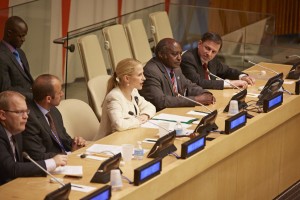 UN Secretary-General calls on States to ratify Kampala Amendments: In his message to a side-event organized by the Global Campaign on 27 September, UN Secretary-General Ban-Ki Moon called on States to follow the lead of those that had already ratified the amendments. He stated that “Kampala completed the work of Rome. Just as important, it also completed the work of San Francisco more than 65 years ago.” The message was delivered by the UN Legal Counsel, Mr. Miguel de Serpa Soares. On the podium, the Foreign Ministers of Botswana, Estonia and Liechtenstein, as well as the Vice Foreign Minister of Argentina echoed that message. 19 States took the floor in the ensuing debate to update on the status of ratification in their own country, to underscore the importance of the amendments, and to call upon others to ratify. For more information, please see the past events section on our website.
UN Secretary-General calls on States to ratify Kampala Amendments: In his message to a side-event organized by the Global Campaign on 27 September, UN Secretary-General Ban-Ki Moon called on States to follow the lead of those that had already ratified the amendments. He stated that “Kampala completed the work of Rome. Just as important, it also completed the work of San Francisco more than 65 years ago.” The message was delivered by the UN Legal Counsel, Mr. Miguel de Serpa Soares. On the podium, the Foreign Ministers of Botswana, Estonia and Liechtenstein, as well as the Vice Foreign Minister of Argentina echoed that message. 19 States took the floor in the ensuing debate to update on the status of ratification in their own country, to underscore the importance of the amendments, and to call upon others to ratify. For more information, please see the past events section on our website.
NEWS: Uruguay ratifies crime of aggression amendments
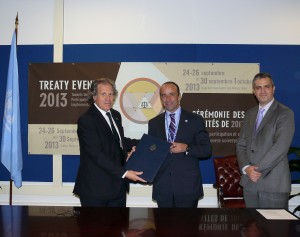 Uruguay ratifies crime of aggression amendments: On 26 September, Luis Almagro, Minister of Foreign Affairs of Uruguay deposited his country’s instrument of ratification of the Kampala amendments with the Office of Legal Affairs of the United Nations. Uruguay thus becomes the first Latin American State Party to ratify the amendment and the 11th overall to do so. Further ratifications from the region are expected in the coming months. In total, four States made use of the opportunity afforded by the UN Treaty Event to deposit their instruments of ratification at the ministerial level.
Uruguay ratifies crime of aggression amendments: On 26 September, Luis Almagro, Minister of Foreign Affairs of Uruguay deposited his country’s instrument of ratification of the Kampala amendments with the Office of Legal Affairs of the United Nations. Uruguay thus becomes the first Latin American State Party to ratify the amendment and the 11th overall to do so. Further ratifications from the region are expected in the coming months. In total, four States made use of the opportunity afforded by the UN Treaty Event to deposit their instruments of ratification at the ministerial level.
Photo © United Nations / Win Khine
NEWS: Andorra ratified crime of aggression amendments
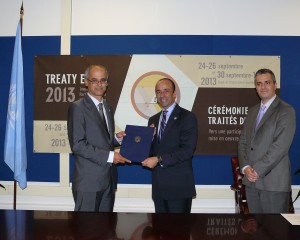 Andorra ratified crime of aggression amendments: On 26 September, Antoni Martí Petit, Head of Government of Andorra deposited his country’s instrument of ratification of the Kampala amendments at the United Nations treaty event. Andorra is the 10th State Party to ratify the amendments. Upon activation of the amendments in 2017, the ICC will be the first international court since the International Military Tribunals in Nuremberg and Tokyo to hold individuals responsible for the crime of aggression.
Andorra ratified crime of aggression amendments: On 26 September, Antoni Martí Petit, Head of Government of Andorra deposited his country’s instrument of ratification of the Kampala amendments at the United Nations treaty event. Andorra is the 10th State Party to ratify the amendments. Upon activation of the amendments in 2017, the ICC will be the first international court since the International Military Tribunals in Nuremberg and Tokyo to hold individuals responsible for the crime of aggression.
Photo © United Nations / Win Khine
NEWS: Slovenia ratifies crime of aggression amendments
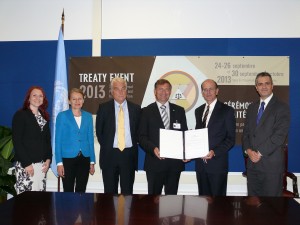 Slovenia ratifies crime of aggression amendments: On 25 September, Karl Erjavec, Minister of Foreign Affairs of Slovenia deposited his country’s instrument of ratification of the Kampala amendments with the Office of Legal Affairs of the United Nations. Slovenia has been a key partner of the global campaign for ratification of the amendments and is the 9th State Party to ratify the amendments. Upon activation of the amendments in 2017, the ICC will be the first international court since the International Military Tribunals in Nuremberg and Tokyo to hold individuals responsible for the crime of aggression.
Slovenia ratifies crime of aggression amendments: On 25 September, Karl Erjavec, Minister of Foreign Affairs of Slovenia deposited his country’s instrument of ratification of the Kampala amendments with the Office of Legal Affairs of the United Nations. Slovenia has been a key partner of the global campaign for ratification of the amendments and is the 9th State Party to ratify the amendments. Upon activation of the amendments in 2017, the ICC will be the first international court since the International Military Tribunals in Nuremberg and Tokyo to hold individuals responsible for the crime of aggression.
Photo © United Nations / Win Khine
NEWS: Cyprus ratifies crime of aggression amendments
 Cyprus ratifies crime of aggression amendments: Ioannis Kasoulides, foreign minister of Cyprus, deposited his country’s instrument of ratification of the Kampala amendments with the Office of Legal Affairs of the United Nations today. Cyprus is the 8th State Party to ratify the amendments. It is the 2nd State from Asia and the 4th Member of the European Union that has completed the process. Upon activation of the amendments in 2017, the ICC will be the first international court since the International Military Tribunals in Nuremberg and Tokyo to hold individuals responsible for the crime of aggression.
Cyprus ratifies crime of aggression amendments: Ioannis Kasoulides, foreign minister of Cyprus, deposited his country’s instrument of ratification of the Kampala amendments with the Office of Legal Affairs of the United Nations today. Cyprus is the 8th State Party to ratify the amendments. It is the 2nd State from Asia and the 4th Member of the European Union that has completed the process. Upon activation of the amendments in 2017, the ICC will be the first international court since the International Military Tribunals in Nuremberg and Tokyo to hold individuals responsible for the crime of aggression.
Photo © United Nations / Win Khine
NEWS: Slovenian National Assembly ratifies Kampala Amendments
 Slovenian National Assembly ratifies Kampala Amendments: All 83 deputies present voted in favour of ratification. Once the remaining formalities – including the gazetting of the Amendments and their signature by the President – are complete and the amendments are deposited with the Office of Legal Affairs of the United Nations, Slovenia will become the second Eastern European State Party to the amendments.
Slovenian National Assembly ratifies Kampala Amendments: All 83 deputies present voted in favour of ratification. Once the remaining formalities – including the gazetting of the Amendments and their signature by the President – are complete and the amendments are deposited with the Office of Legal Affairs of the United Nations, Slovenia will become the second Eastern European State Party to the amendments.
Photo © mapsofworld.com
NEWS: Swiss Government launches consultation procedure on ratification of Kampala Amendments
 Swiss Government launches consultation procedure on ratification of Kampala Amendments: The Swiss Government today launched a public consultation procedure, which is a necessary prerequisite for ratification of the Kampala Amendments. Switzerland took a key role in negotiations before and during the Review Conference in Kampala, including by submitting an important compromise proposal in Kampala, together with Argentina and Brazil (the famous “ABS proposal”). If approved, the ratification could take place in early 2015.
Swiss Government launches consultation procedure on ratification of Kampala Amendments: The Swiss Government today launched a public consultation procedure, which is a necessary prerequisite for ratification of the Kampala Amendments. Switzerland took a key role in negotiations before and during the Review Conference in Kampala, including by submitting an important compromise proposal in Kampala, together with Argentina and Brazil (the famous “ABS proposal”). If approved, the ratification could take place in early 2015.
See also the official press release as well as the explanatory report. The report is available in German, French and Italian and could be a useful tool for other States working on ratification.
News: Government of Slovenia recommends ratification to Parliament
 Government of Slovenia recommends ratification to Parliament: The Slovenian Government approved the Kampala amendments and sent the draft ratification bill to Parliament, which is expected to give its final approval in July (see the official press release in Slovenian). Already last year, Slovenia had incorporated the Kampala definition of the crime of aggression into its domestic criminal code.
Government of Slovenia recommends ratification to Parliament: The Slovenian Government approved the Kampala amendments and sent the draft ratification bill to Parliament, which is expected to give its final approval in July (see the official press release in Slovenian). Already last year, Slovenia had incorporated the Kampala definition of the crime of aggression into its domestic criminal code.
Photo © mapsofworld.com
News: Uruguay to become first Latin American State to ratify
 Uruguay to become first Latin American State to ratify: Today the Senate of Uruguay approved the Kampala Amendments. The instrument of ratification is expected to be deposited at the UN by mid-July. The Chamber of Deputies had already unanimously approved the ratification bill in April. Uruguay would thus be the first Latin American State to ratify the Kampala Amendments on the Crime of Aggression.
Uruguay to become first Latin American State to ratify: Today the Senate of Uruguay approved the Kampala Amendments. The instrument of ratification is expected to be deposited at the UN by mid-July. The Chamber of Deputies had already unanimously approved the ratification bill in April. Uruguay would thus be the first Latin American State to ratify the Kampala Amendments on the Crime of Aggression.
Dip. Felipe Michelini (Frente Amplio), Convenor of the Parliamentarians for Global Action’s International Law and Human Rights Programme stated in this context:
“The Kampala Amendments operationalise the aspirations to end aggression as provided by the Rome Statute. Sixty years after having ratified the London Agreements that provided the legal basis to the Nuremberg Tribunals, Uruguay continues its work in defense of human dignity through law, as law is what defines civilization and denies barbarie.”
Photo © Parliamentarians for Global Action
NEWS: Botswana – first African State to ratify Kampala amendments
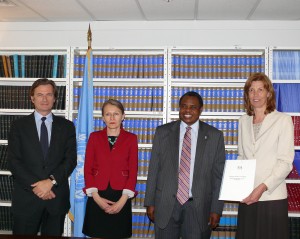 Botswana – first African State to ratify Kampala amendments: After the President of Botswana, Ian Khama, signed his country’s instrument of ratification at the opening of the workshop on the Kampala amendments for all African States Parties in April, the instrument has now been deposited by Ambassador Charles T. Ntwaagae with the Office of Legal Affairs of the United Nations. Botswana is the first African State Party and the seventh overall to ratify the amendments. Botswana’s Foreign Minister, P.T.C. Skelemani, has previously reminded African States that “the people of Africa aspire to live in a region free of the fear of aggression.” Botswana also promotes ratification in its region, which forms the largest constituency of the ICC. Ambassador Christian Wenaweser welcomes the continued leadership of Botswana on ICC issues and looks forward to continuing the close cooperation in the ratification campaign. After the ratification by Botswana, another 23 ratifications are needed to allow for the activation of the ICC’s jurisdiction over the crime of aggression in 2017.
Botswana – first African State to ratify Kampala amendments: After the President of Botswana, Ian Khama, signed his country’s instrument of ratification at the opening of the workshop on the Kampala amendments for all African States Parties in April, the instrument has now been deposited by Ambassador Charles T. Ntwaagae with the Office of Legal Affairs of the United Nations. Botswana is the first African State Party and the seventh overall to ratify the amendments. Botswana’s Foreign Minister, P.T.C. Skelemani, has previously reminded African States that “the people of Africa aspire to live in a region free of the fear of aggression.” Botswana also promotes ratification in its region, which forms the largest constituency of the ICC. Ambassador Christian Wenaweser welcomes the continued leadership of Botswana on ICC issues and looks forward to continuing the close cooperation in the ratification campaign. After the ratification by Botswana, another 23 ratifications are needed to allow for the activation of the ICC’s jurisdiction over the crime of aggression in 2017.
Photo © United Nations / Win Khine
NEWS: Germany ratifies crime of aggression amendments
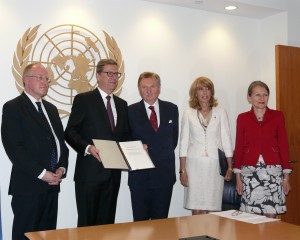 Germany ratifies crime of aggression amendments: On 3 June 2013, Guido Westerwelle, Minister of Foreign Affairs of Germany deposited his country’s instrument of ratification of the Kampala amendments with the Office of Legal Affairs of the United Nations. Germany, which had been instrumental for the inclusion of the Crime of Aggression in the Rome Statute, is the sixth State Party to ratify the amendments. Upon activation of the amendments in 2017, the ICC will be the first international court since the International Military Tribunals in Nuremberg and Tokyo to hold individuals responsible for the crime of aggression. It is by far the largest State to do so yet.
Germany ratifies crime of aggression amendments: On 3 June 2013, Guido Westerwelle, Minister of Foreign Affairs of Germany deposited his country’s instrument of ratification of the Kampala amendments with the Office of Legal Affairs of the United Nations. Germany, which had been instrumental for the inclusion of the Crime of Aggression in the Rome Statute, is the sixth State Party to ratify the amendments. Upon activation of the amendments in 2017, the ICC will be the first international court since the International Military Tribunals in Nuremberg and Tokyo to hold individuals responsible for the crime of aggression. It is by far the largest State to do so yet.
Photo © United Nations / Win Khine
NEWS: Forum of Small States Briefed about Aggression Amendments
 Forum of Small States Briefed about Aggression Amendments: In their presentation to the 110-member strong Forum of Small States (FOSS), Christian Wenaweser and Donald M. Ferencz underscored the special relevance of the Kampala Amendments on the Crime of Aggression for small States, which are more likely to be the victims of acts of aggression. All 5 States that have ratified the Kampala amendments on the Crime of Aggression to date are members of FOSS, a fact that does not surprise Ambassador Wenaweser, who recalled that it was small States who led the charge for ratifications of the Rome Statute.
Forum of Small States Briefed about Aggression Amendments: In their presentation to the 110-member strong Forum of Small States (FOSS), Christian Wenaweser and Donald M. Ferencz underscored the special relevance of the Kampala Amendments on the Crime of Aggression for small States, which are more likely to be the victims of acts of aggression. All 5 States that have ratified the Kampala amendments on the Crime of Aggression to date are members of FOSS, a fact that does not surprise Ambassador Wenaweser, who recalled that it was small States who led the charge for ratifications of the Rome Statute.
NEWS: Crime of Aggression amendments enter into force
 Crime of Aggression amendments enter into force: On 8 May 2013, the Kampala Amendments on the Crime of Aggression entered into force for the first State, Liechtenstein.
Crime of Aggression amendments enter into force: On 8 May 2013, the Kampala Amendments on the Crime of Aggression entered into force for the first State, Liechtenstein.
As they were adopted under article 121(5) of the Statute, the Crime of Aggression amendments enter into force for each ratifying State one year after the deposit of the instrument of ratification with the Secretary-General of the United Nations. Liechtenstein deposited its instrument of ratification on 8 May 2012, the 67th anniversary of the end of World War II in Europe.
Those interested in the legal fine print should make sure to distinguish entry into force and activation: The amendments have now entered into force for the first State Party. Next, the amendments need to be activated through the procedure contained in the amendments (which require 30 ratifications and a one-time activation decision by States Parties no earlier than 1 January 2017). It is thus not correct to state that the amendments will only enter into force in 2017! They have just entered into force, as can be seen on the SG’s depositary notification. But the Court can only exercise its jurisdiction over the crime of aggression once this jurisdiction is activated as described above.
For more details, have a look at our Handbook.
Photo: Liechtenstein’s Ambassador Christian Wenaweser presents a copy of the Travaux Preparatoires of the Kampala Amendments on the Crime of Aggression to Patricia O’Brien, Legal Counsel of the United Nations. © United Nations / Win Khine
News: UN Secretary-General promotes ratification of Kampala Amendments
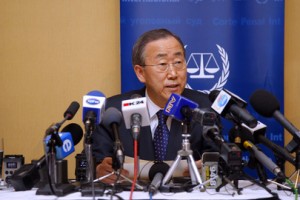 UN Secretary-General promotes ratification of Kampala Amendments: United Nations Secretary-General Ban Ki-moon sent a strong message of support to the Gaborone workshop on ratification and implementation of the Kampala Amendments to the Rome Statute of the ICC: “The achievement of Kampala has set the stage for a paradigm shift in international law and international relations”. He hoped that more States parties would ratify the amendment to facilitate their timely activation. He traced the history of the amendments through General Assembly Resolution 3314 to article 2(4) of the Charter, which prohibits the threat or use of force in international relations.
UN Secretary-General promotes ratification of Kampala Amendments: United Nations Secretary-General Ban Ki-moon sent a strong message of support to the Gaborone workshop on ratification and implementation of the Kampala Amendments to the Rome Statute of the ICC: “The achievement of Kampala has set the stage for a paradigm shift in international law and international relations”. He hoped that more States parties would ratify the amendment to facilitate their timely activation. He traced the history of the amendments through General Assembly Resolution 3314 to article 2(4) of the Charter, which prohibits the threat or use of force in international relations.
According to the Secretary-General, the United Nations supports efforts to promote ratification of the Kampala Amendments as well as their implementation, which would institutionalize the achievements of the Nuremberg and Tokyo Tribunals.
Here is the full text of the message, which was delivered by Zachary Muburi-Muita, Head of the UN Office to the African Union.
Photo: Secretary-General Ban Ki-moon briefs press while participating in the Kampala Review Conference of the International Criminal Court in 2010. © UN Photo/Evan Schneider
NEWS: Botswana set to become 6th State Party to Aggression amendments
B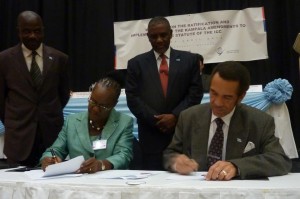 otswana set to become 6th State Party to Aggression amendments: At the opening of a workshop on the Crime of Aggression in Gaborone, Ian Khama, President of the Republic of Botswana, signed the instrument of ratification for the Kampala Amendments. President Khama said “this is a symbol of our commitment to the implementation of the Rome Statute, and I hope that it will encourage other countries to do the same.” It is expected that it will be deposited with the Secretary-General United Nations in New York next week, making Botswana the 6th State Party to the amendments on the Crime of Aggression.
otswana set to become 6th State Party to Aggression amendments: At the opening of a workshop on the Crime of Aggression in Gaborone, Ian Khama, President of the Republic of Botswana, signed the instrument of ratification for the Kampala Amendments. President Khama said “this is a symbol of our commitment to the implementation of the Rome Statute, and I hope that it will encourage other countries to do the same.” It is expected that it will be deposited with the Secretary-General United Nations in New York next week, making Botswana the 6th State Party to the amendments on the Crime of Aggression.
NEWS: Workshop for African States Parties in Botswana – 15 & 16 April 2013
 Workshop for African States Parties in Botswana – 15 & 16 April 2013
Workshop for African States Parties in Botswana – 15 & 16 April 2013
On the invitation of Botswana, Liechtenstein and the Global Institute for the Prevention of Aggression, Representatives from 26 African States Parties met in Gaborone, Botswana to discuss the ratification and implementation of the Kampala Amendments. The results of the workshop have been captured in a joint communiqué.
More details are available in the summary report of the workshop, available in English and French.
Statements were made by several high-level attendees including
- Ian Khama, President of Botswana
- Ban Ki-moon, Secretary General of the United Nations, message delivered by Zachary Muburi-Muita, head of the UN Office to the African Union
- Aurelia Frick, Minister of Foreign Affairs of Liechtenstein
- Dikgakgamatso Ndelu Seretse, Minister of Defence, Justice and Security of Botswana
- Andries Nel, Deputy Minister of Justice and Constitutional Development of South Africa
- Christian Wenaweser, Permanent Representative of Liechtenstein to the UN
Germany: Denkschrift / Explanatory Memorandum (in English and German)
Denkschrift
zum Gesetz zu den Änderungen vom 10. und 11. Juni 2010 des Römischen
Statuts des Internationalen Strafgerichtshofs vom 17. Juli 1998
Explanatory Memorandum
to the Act regarding the Amendments of 10 and 11 June 2010
to the Rome Statute of the International Criminal Court of 17 July 1998
[…]
NEWS: Prince Zeid and Donald Ferencz speak on Aggression at Brandeis University
Prince Zeid and Donald Ferencz speak on Aggression at Brandeis University: On 30 January 2013, Prince Zeid Ra’ad Zeid al Hussein, Permanent Representative of Jordan to the United Nations, and Donald M. Ferencz, Convenor of the Global Institute on the Prevention of Aggression, spoke at Brandeis University on the Crime of Aggression. The video of their talk has been posted on Youtube and is available below:
More information is available on the website of the International Center for Ethics, Justice and Public Life at Brandeis University.
NEWS: Estonia ratifies crime of aggression amendments
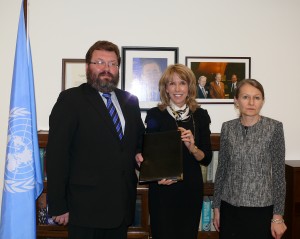 Estonia ratifies crime of aggression amendments: On 27 March 2013, Estonia deposited its instrument of ratification of the Kampala amendments with the Office of Legal Affairs of the United Nations. It becomes the fifth State Party to the Rome Statute, and the first Eastern European State, to do so. 25 additional ratifications are required for activation of the Court’s jurisdiction over the crime of aggression.
Estonia ratifies crime of aggression amendments: On 27 March 2013, Estonia deposited its instrument of ratification of the Kampala amendments with the Office of Legal Affairs of the United Nations. It becomes the fifth State Party to the Rome Statute, and the first Eastern European State, to do so. 25 additional ratifications are required for activation of the Court’s jurisdiction over the crime of aggression.
A press release is available on the website of the Estonian Foreign Ministry.
Photo: © Win Khine/United Nations
Costa Rica Technical Analysis of the Kampala Amendments
INFORME JURIDICO
“APROBACIÓN DE LAS ENMIENDAS AL ESTATUTO DE ROMA
DE LA CORTE PENAL INTERNACIONAL RELATIVAS
AL CRIMEN DE AGRESIÓN Y AL ARTÍCULO 8”
EXPEDIENTE Nº 18.514
I.- RESUMEN DEL PROYECTO
El proyecto de ley propone la “Aprobación de las Enmiendas al Estatuto de Roma de la Corte Penal Internacional relativas al Crimen de Agresión y al Artículo 8”.
Estas enmiendas son producto de la primera Conferencia de Revisión del Estatuto de Roma, la cual se llevó a cabo en Kampala, Uganda, del 31 de mayo al 11 de junio de 2010. Las mismas se adoptaron por consenso y versan sobre el Artículo 8 “Crímenes de Guerra”, incorporan la definición del “Crimen de Agresión” y las condiciones conforme a las cuales la Corte ejercerá competencia sobre este último.
Tal y como lo señala la Exposición de Motivos, las enmiendas perfeccionan y completan el Estatuto de Roma, de manera que la Corte Penal Internacional podrá enjuiciar a los autores del delito de agresión en función de una sólida base jurídica creada por la voluntad común de los estados.
Finalmente, el Poder Ejecutivo expresa que las presentes enmiendas son conformes con nuestra política exterior en materia de protección de Derechos Humanos y respeto al Estado de Derecho, ejes básicos por los que Costa Rica es reconocida a nivel internacional, así como con nuestro ya tradicional liderazgo en temas que buscan el fortalecimiento de la Corte Penal Internacional.
[…]
Costa Rica Bill on ratification of the Kampala Amendments
PROYECTO DE LEY
“APROBACIÓN DE LAS ENMIENDAS AL ESTATUTO DE ROMA
DE LA CORTE PENAL INTERNACIONAL RELATIVAS AL
CRIMEN DE AGRESIÓN Y AL ARTÍCULO 8”
Expediente N.º 18.514
ASAMBLEA LEGISLATIVA:
El Estatuto de Roma fue adoptado el 17 de julio de 1998, por la Conferencia de Plenipotenciarios que al efecto convocó la Organización de las Naciones Unidas (ONU).
Costa Rica realizó el correspondiente depósito del instrumento de ratificación ante el Secretario General de las Naciones Unidas el 7 de junio del 2001.
Dicho Estatuto estableció la Corte Penal Internacional, órgano jurisdiccional penal autónomo permanente y de carácter internacional, destinado a hacer efectivas las responsabilidades penales individuales de los autores de determinados y graves delitos internacionales, impidiendo la impunidad cuando los Estados no hayan cumplido con su deber de perseguir y castigar a los autores de dichos crímenes. La Corte también constituye un instrumento importante para la atención de las víctimas de estos delitos.
[…]
Workshop on the Ratification and Implementation of the Aggression Amendments, Programme (2012)
Workshop on the Ratification and Implementation of the Rome Statute Amendments on the Crime of Aggression
Monday, 25 June 2012
Programme
(Lester Pollack Colloquium at New York University, 245 Sullivan Street, Manhattan, NY 10012)
[…]
Communiqué: Sierra Leone Workshop on Implementation of the Rome Statute and the Amendments on the Crime of Aggression (2012)
The Sierra Leone Institute of International Law with support from Commonwealth Secretariat at the conclusion of its three day workshop on the topic: Promoting the implementation of the 1998 Rome Statute of the International Criminal court and the Kampala Amendments on the Crime of Aggression, held at 57 John Street, Freetown from the 12 to July 2012 with stake holders made teh following recommendations for the consideration and action of Government, Civil Society, Media and the Sierra Leone Bar Association:
[…]
Opening remarks of the Foreign Minister of Liechtenstein at a Ministerial Panel on Aggression (2012)
Excellencies, distinguished delegates, Ladies and Gentlemen,
I am proud to open this panel today, which is dedicated to “Preventing the illegal use of force through judicial accountability – the role of the ICC and States Parties after the adoption of the Kampala amendments on the crime of aggression”. For Liechtenstein, this brings together two of the top priorities in our multilateral work: First, the United Nations, the very purpose of which is to promote international peace and security. Its Charter contains the most important rule of international law: the prohibition of the illegal use of force. Second, the rule of law, the theme of the high-level meeting today, and in particular the role of the International Criminal Court in this respect. While aggression is prohibited under the UN Charter and thus has been illegal under international law for decades, we have so far not been able to use individual criminal justice to enforce the prohibition of the illegal use of force. In Nuremberg, some 65 years ago, twelve leading Nazi officers were convicted of “crimes against peace”. Since then, no other international criminal tribunal has had the competence to hold individuals accountable for the crime of aggression. We did not even have an internationally accepted definition of the crime of aggression. Instead, we had more wars, more aggression, and impunity.
[…]
Luxembourg Press Release on Ratification of the Kampala Amendments (2013)
Today at the UN Headquarters in New York, the Deputy Prime Minister and Minister of Foreign Affairs of Luxembourg, H.E. Mr Jean Asselborn deposited the instruments of ratification of the amendments to the Statute of the International Criminal Court adopted by the Kampala Review Conference on 10 and 11 June 2010 with the Legal Counsel of the United Nations and Under-Secretary-General for Legal Affairs, Ms Patricia O’Brien.
[…]
ICC-ASP/7/20/Add.1 Annex II Report of the Special Working Group on the Crime of Aggression (2009)
I. Introduction
1. The Special Working Group on the Crime of Aggression of the Assembly of States Parties to the Rome Statute of the International Criminal Court held six meetings on 9, 10, 11 and 13 February 2009. Ambassador Christian Wenaweser (Liechtenstein) served as Chair of the Special Working Group.
2. The Secretariat of the Assembly of States Parties provided the substantive servicing for the Group.
3. The discussions in the Group were held on the basis of three papers submitted by the Chairman: a revised discussion paper (“2009 Chairman’s paper”); 1 a “Non-paper on other substantive issues regarding aggression to be addressed by the Review Conference”; 2 and an informal note on the work programme.3 At the first meeting of the Group, the Chairman introduced all three documents. He recalled that the Group was open to participation by all States on an equal footing, and encouraged delegations to comment in particular on issues that had not been thoroughly discussed in recent sessions. The Chairman further recalled that, in accordance with resolution ICC-ASP/7/Res.3, this was the final session of the Group, but not the final opportunity to discuss the crime of aggression. After the conclusion of the work of the Special Working Group, discussions would continue in the framework of the preparations of the Review Conference and possibly at the Review Conference itself.
[…]
ICC-ASP/7/20 Annex III Report of the Special Working Group on the Crime of Aggression (November 2008)
I. Introduction
1. The Special Working Group on the Crime of Aggression of the Assembly of States Parties to the Rome Statute of the International Criminal Court held five meetings on 17, 18, 19 and 20 November 2008. Ambassador Christian Wenaweser (Liechtenstein) served as Chair of the Special Working Group (hereinafter “the Group”).
2. The Secretariat of the Assembly of States Parties provided the substantive servicing for the Group.
3. The discussions in the Group were continued on the basis of the revised discussion paper proposed by the Chairman (2008 Chairman’s paper).1 Furthermore, the Chairman submitted an informal note on the work programme, outlining a suggested structure as well as questions for discussions.
4. At the first meeting of the Group, the Chairman introduced the informal note on the work programme. He recalled that the Group was open to participation by all States on an equal footing, and encouraged delegations to comment in particular on issues that have not been thoroughly discussed in recent sessions, as outlined in the note on the work programme.
[…]
ICC-ASP/6/20/Add.1 Annex II Report of the Special Working Group on the Crime of Aggression (June 2008)
I. Introduction
1. The Special Working Group on the Crime of Aggression of the Assembly of States Parties to the Rome Statute of the International Criminal Court held seven meetings on 2, 3, 4 and 6 June 2008. Ambassador Christian Wenaweser (Liechtenstein) served as Chair of the Special Working Group.
2. The Secretariat of the Assembly of States Parties provided the substantive servicing for the Group.
3. The discussions in the Special Working Group were held on the basis of the revised discussion paper proposed by the Chairman (“2008 Chairman’s paper”).1 The revised discussion paper was submitted following the discussions held by the Special Working Group during the sixth session of the Assembly of States Parties (30 November to 14 December 2007). It is based on the previous discussion paper (“2007 Chairman’s paper”)2 and reflects the progress made since.
4. At the first meeting of the Special Working Group, the Chairman introduced the 2008 Chairman’s paper. He recalled that the Group was open to participation by all States on an equal footing, and encouraged an interactive discussion. Delegations were especially encouraged to comment on issues that had not been thoroughly discussed in recent sessions. These included the procedure for entry into force of amendments on aggression; the suggested deletion of article 5, paragraph 2, of the Statute; the application of article 28 of the Statute to the crime of aggression; the suggested inclusion of the text of United Nations General Assembly resolution 3314 (XXIX) as an annex to the Rome Statute; and the Elements of Crimes. While the Chairman drew particular attention to these issues, delegations were invited to comment on all the substantive issues addressed in the 2008 Chairman’s paper.
5. Delegations welcomed the progress made by the Group since the sixth session of the Assembly of States Parties in 2007. The 2008 Chairman’s paper was considered a sound basis for further discussion.
[…]
ICC-ASP/5/35 Annex II Report of the Special Working Group on the Crime of Aggression (2007)
I. Introduction
1. The Special Working Group on the Crime of Aggression of the Assembly of States Parties to the Rome Statute of the International Criminal Court held six meetings on 29, 30, 31 January and 1 February 2007. Ambassador Christian Wenaweser (Liechtenstein) served as Chair of the Special Working Group.
2. The Secretariat of the Assembly of States Parties provided the substantive servicing for the Group.
3. The Special Working Group had before it a revised discussion paper1 prepared by the Chairman (hereinafter “Chairman’s paper”) as a reflection of the discussions held over the past years, including at the informal inter-sessional meetings of the Group held at the Liechtenstein Institute on Self-Determination at Princeton University.
4. At the first meeting of the Group, the Chairman introduced the revised discussion paper, replacing the 2002 Coordinator’s paper. He noted that the paper had been prepared in light of the progress made at Princeton, without excluding options reflecting views that may not necessarily have broad support. The Chairman also recalled that the Special Working Group had decided to conclude its work 12 months prior to the Review Conference. He indicated that the Group was entering a new phase in its work and that further discussions should be aimed at narrowing existing differences of opinion. Delegations were invited to present their views on the substantive parts of the revised discussion paper while leaving aside issues related to the elements of crime which were included for reference purposes only.
[…]
ICC-ASP/4/SWGCA/1 Report of the Special Working Group on the Crime of Aggression (2005)
I. Introduction
1. The Special Working Group on the Crime of Aggression of the Assembly of States Parties to the Rome Statute of the International Criminal Court held three meetings on 30 November and 1 December 2005. Ambassador Christian Wenaweser served as Chairperson of the Special Working Group.
2. The Secretariat of the Assembly of States Parties provided the substantive servicing for the Group.
3. The Special Working Group had before it the outcome of an informal intersessional meeting held in Princeton, New Jersey, United States, from 13 to 15 June 2005 contained indocument ICC-ASP/4/SWGCA/INF.1. At the first meeting of the Group, the Chairperson presented an overview of the report of the intersessional meeting. In doing so, he expressed his regret that the delegation of Cuba had again, despite representations both by himself and by the President of the Assembly, been denied a travel permit by the host State and had therefore been unable to attend the informal intersessional meeting in Princeton. The Chairperson pointed out that the intersessional had again been held in English only, as had the intersessional meetings held in Syracuse, Sicily, in preparation for the Rome Conference. He expressed his willingness to arrange for translation services, if delegations had a very strong preference in this respect, but also made it clear that such arrangements would lead to a huge increase in the total costs of the meetings and that it would be difficult to secure the relevant funding. He requested the Special Working Group to adopt the report and use it as the basis for future discussions on the crime of aggression. In view of the limited time allocated to the question of the crime of aggression during the fourth session of the Assembly of States Parties, he emphasized the need for further intersessional meetings in the future, complemented by a significant increase in meeting time in the framework of the Assembly of States Parties. The Chairperson expressed his understanding of the fact that the agenda of the Assembly was overloaded yet again. However, he also mentioned that the decision taken by the Assembly at its third session on meeting time allocated to the Special Working Group had not been implemented. The Chairperson also expressed the view that the Special Working Group on the Crime of Aggression needed to establish a “road map” clearly outlining the process that could enable the Special Working Group on the Crime of Aggression to conclude its work successfully at least 12 months before the convening of the Review Conference. It was essential to make a reliable decision on meeting time allocated to the Special Working Group on the Crime of Aggression between 2006 and 2008.
[…]
ICC-ASP/8/INF.2 Report on the Informal Intersessional Meeting at Princeton (2009)
I. Introduction
1. Pursuant to a recommendation by the Assembly of States Parties and at the invitation of the Government of Liechtenstein, an informal inter-sessional meeting on the Crime of Aggression was hosted by the Liechtenstein Institute on Self-Determination, Woodrow Wilson School, on the premises of the Princeton Club, New York, United States of America, from 8 to 10 June 2009. Invitations to participate in the meeting had been sent to all States, as well as to representatives of civil society. H.R.H. Prince Zeid Ra’ad Zeid Al-Hussein (Jordan) chaired the meeting.
2. The participants in the informal inter-sessional meeting expressed their appreciation to the Governments of Denmark, Finland, Germany, Liechtenstein, Mexico, the Netherlands, Sweden and Switzerland for the financial support they had provided for the meeting and to the Liechtenstein Institute on Self-Determination at Princeton University for hosting the event and the financial support.
3. The participants noted with appreciation that the meeting was held on the premises of the Princeton Club in New York, thereby enabling the presence of delegations that had in the past been denied permission to travel to Princeton to attend previous inter-sessional meetings of the Special Working Group on the Crime of Aggression (hereinafter “the Group”).
4. The present document does not necessarily represent the views of the governments that the participants represent. It seeks to reflect the opinions expressed on various issues pertaining to the crime of aggression on the basis of the proposals for a provision on aggression elaborated by the Group and adopted on 13 February 2009.1 It is hoped that the material in the present report will facilitate the future work of the Assembly of States Parties on the crime of aggression, in particular during the upcoming eighth session, to be held in The Hague from 18 to 26 November 2009.
5. The discussions were held on the basis of two papers submitted by the Chairman: a non-paper on the Elements of Crimes2, as well as a non-paper on the conditions for the exercise of jurisdiction.3 The Chairman introduced both non-papers and recalled the significant progress that had been made by the Group, culminating in the adoption of the Group’s final report in February 2009. He underlined that the future work on aggression should focus on the outstanding issues left over from the Group, as well as the Elements of Crimes. The Chairman furthermore noted that the participation of both States Parties and non-States Parties was essential, despite the fact that the Group no longer existed as such. The future format of the work on aggression would have to be decided by the Assembly of States Parties at its next session.
[…]
ICC-ASP/6/SWGCA/INF.1 Report on the Informal Intersessional Meeting at Princeton (2007)
I. Introduction
1. Pursuant to a recommendation by the Assembly of States Parties and at the invitation of the Government of Liechtenstein, an informal inter-sessional meeting of the Special Working Group on the Crime of Aggression was held at the Liechtenstein Institute on Self- Determination, Woodrow Wilson School, Princeton University, New Jersey, United States of America, from 11 to 14 June 2007. Invitations to participate in the meeting had been sent to all States, as well as to representatives of civil society. Ambassador Christian Wenaweser (Liechtenstein) chaired the meeting.
2. The participants in the informal inter-sessional meeting expressed their appreciation to the Governments of Finland, Germany, Liechtenstein, Mexico, the Netherlands, Norway, Sweden and Switzerland for the financial support they had provided for the meeting and to the Liechtenstein Institute on Self-Determination at Princeton University for hosting and giving financial support for the event.
3. The meeting noted with regret that the delegations of Cuba and the Islamic Republic of Iran had been denied permission to travel to Princeton to attend the meeting, in spite of efforts by the President of the Assembly and the Chair of the Special Working Group.
4. The present document does not necessarily represent the views of the governments that the participants represent. It seeks to reflect the opinions expressed on various issues pertaining to the crime of aggression and to set out the conclusions reached. It is understood that these issues will have to be reassessed in light of further work on the crime of aggression. It is hoped that the material in the present report will facilitate the work of the Special Working Group on the Crime of Aggression.
[…]
New Zealand ‘International Non-Aggression and Lawful Use of Force (Implementation of Amendment to Statute of Rome) Bill’ (2012)
General policy statement
The purpose of this Bill is to implement the Amendment to the Statute of Rome 1998, pertaining to the crime of aggression, as adopted in Resolution 6 of the ReviewConference of the States Parties in Kampala, 11 June 2010.
Implementation by New Zealand is to be achieved through this Bill in the following ways:
1 to ensure that the use of armed force by New Zealand is always in conformity with international law and in particular the UN Charter; and to protect New Zealand leaders from external pressure to commit the New Zealand Defence Force to any illegal action overseas:
2 to ensure that no leader of another State uses armed force against New Zealand with impunity.
To that end, this Bill—
(a) requires that New Zealand observe its binding obligation under the UN Charter not to commit an act of aggression:
(b) makes it a criminal offence in New Zealand law for any New Zealand leader to commit an act of aggression:
(c) requires a New Zealand leader to obtain the written advice of the Attorney-General before deciding to engage the armed forces of New Zealand in action involving the use of force:
(d) makes it a criminal offence in New Zealand law for any leader of any other State to commit aggression against New Zealand:
(e) recognises that NewZealand or any other State may engage in the use of armed force, under the UN Charter, in exercise of the inherent right of individual or collective self-defence or in any other manner properly authorised by the Security Council of the United Nations.
[…]
ICC-ASP/5/SWGCA/INF.1 Report on the Informal Intersessional Meeting at Princeton (2006)
I. Introduction
1. Pursuant to a recommendation by the Assembly of States Parties and at the invitation of the Government of Liechtenstein, an informal inter-sessional meeting of the Special Working Group on the Crime of Aggression was held at the Liechtenstein Institute on Self- Determination, Woodrow Wilson School, Princeton University, New Jersey, United States of America, from 8 to 11 June 2006. Invitations to participate in the meeting had been sent to all States, as well as to representatives of civil society. Ambassador Christian Wenaweser (Liechtenstein) chaired the meeting. The annotated agenda of the meeting is contained in annex III.
2. The participants in the informal inter-sessional meeting expressed their appreciation to the Governments of Canada, Finland, Liechtenstein, the Netherlands, Sweden and Switzerland for the financial support they had provided for the meeting and to the Liechtenstein Institute on Self-Determination at Princeton University for hosting and giving financial support for the event.
3. The participants observed a minute of silence in memory of Dr. Medard Rwelamira, the late Secretary of the Assembly of States Parties, who passed away on 3 April 2006. The Chairman paid tribute to the outstanding assistance provided to the Special Working Group by Dr. Rwelamira, who had been a dear colleague and close friend of many delegates.
4. The meeting noted with regret that the delegation of Cuba had, once more, been denied permission to travel to Princeton to attend the meeting, in spite of efforts by the President of the Assembly and the Chair of the Special Working Group.
5. The present document does not necessarily represent the views of the governments that the participants represent. It seeks to reflect the opinions expressed on various issues pertaining to the crime of aggression and to set out the conclusions reached. It is understood that these issues will have to be reassessed in light of further work on the crime of aggression. It is hoped that the material in the present document will facilitate the work of the Special Working Group on the Crime of Aggression.
[…]
ICC-ASP/4/32, Annex II.A Report on the Informal Intersessional Meeting at Princeton (2005)
I. Introduction
1. At the invitation of the Government of Liechtenstein and pursuant to a recommendation by the Assembly of States Parties, an informal inter-sessional meeting of the Special Working Group on the Crime of Aggression was held at the Liechtenstein Institute on Self-Determination, Woodrow Wilson School, Princeton University, New Jersey, United States, from 13 to 15 June 2005. Invitations to participate in the meeting had been sent to all States as well as to representatives of civil society. Ambassador Christian Wenaweser (Liechtenstein) chaired the meeting. The agenda of the meeting is contained in annex II.
2. The participants in the informal inter-sessional meeting expressed their appreciation to the Governments of Germany, Finland, Liechtenstein, the Netherlands and Switzerland for the financial support they had provided for the meeting and to the Liechtenstein Institute on Self-Determination at Princeton University for hosting the event.
3. The present document does not necessarily represent the views of the Governments that the participants represent. It seeks to reflect conclusions and opinions regarding different issues pertaining to the crime of aggression; and it is understood that these issues will have to be reassessed in light of further work on the crime of aggression. It is hoped that the material in the present document will facilitate the work of the Special Working Group on the Crime of Aggression.
[…]
ICC-ASP/3/SWGCA/INF.1 Report on the Informal Intersessional Meeting at Princeton (2004)
1. At the invitation of the Government of Liechtenstein, and after consultation within the framework of the Assembly of States Parties, an inter-sessional meeting of the Special Working Group on the Crime of Aggression was held at the Liechtenstein Institute on Self-Determination, Woodrow Wilson School, at Princeton University, New Jersey, United States, from 21 to 23 June 2004. Invitations to participate in the meeting had been sent to all States who have signed the Final Act of the Rome Conference as well as to some representatives of civil society. Ambassador Christian Wenaweser (Liechtenstein) chaired the meeting. A list of participants is included as annex II.
2. The agenda for the meeting was based on the preliminary list of possible issues relating to the crime of aggression contained in document PCNICC/2001/L.1/Rev.1. As a result of the discussions, this list was revised in order to reflect progress made since the preliminary list of issues had been drafted. The revised list of issues is included as annex I of the report.
3. The participants in the inter-sessional meeting expressed their appreciation to the Governments of Liechtenstein, the Netherlands and Switzerland, which had provided financial support for the meeting, as well as to the Liechtenstein Institute on Self-Determination at Princeton University for providing an opportunity for an informal exchange of views and dialogue among the participants and for its generous hospitality. The group expressed its hope that the Assembly of States Parties, if possible, may make provision for other such meetings, with the necessary arrangements in order to facilitate the debate in the different working languages of the Assembly.
4. The present document does not necessarily represent the views of the Governments of the participants. It seeks to reflect conclusions and opinions regarding different issues on the crime of aggression; it is understood that these issues would have to be reassessed in light of further work on the crime of aggression. It is hoped that the material in the present document would facilitate the work of the Special Working Group on the Crime of Aggression.
[…]
Resolution ICC-ASP/1/Res.1 Continuity of work in respect of the crime of aggression (2002)
The Assembly of States Parties,
Recalling paragraph 2 of article 5 of the Rome Statute,
Recalling also paragraph 7 of resolution F, adopted by the United Nations Diplomatic Conference of Plenipotentiaries on the Establishment of an International Criminal Court on 17 July 1998,
Desirous of continuing and completing the work on the crime of aggression,
1. Takes note with appreciation of the report of the Preparatory Commission for the International Criminal Court on the crime of aggression;1
2. Decides to establish a special working group on the crime of aggression, open on an equal footing to all States Members of the United Nations or members of specialized agencies or of the International Atomic Energy Agency, for the purpose of elaborating proposals for a provision on aggression in accordance with paragraph 2 of article 5 of the Statute and paragraph 7 of resolution F adopted by the United Nations Diplomatic Conference of Plenipotentiaries on the Establishment of an International Criminal Court on 17 July 1998;
3. Decides also that the special working group shall submit such proposals to the Assembly for its consideration at a Review Conference, with a view to arriving at an acceptable provision on the crime of aggression for inclusion in the Statute in accordance with the relevant provisions of the Statute;
4. Decides further that the special working group shall meet during the regular sessions of the Assembly or at any other time that the Assembly deems appropriate and feasible;
5. Requests the Bureau of the Assembly to prepare a proposal for the meetings of the special working group and to submit the proposal, with its budgetary implications, at the earliest possible session with a view to holding the first meeting of the special working group in 2003.
Draft Code of Crimes against the Peace and Security of Mankind (1996)
Text adopted by the International Law Commission at its forty-eighth session, in 1996, and submitted to the General Assembly as a part of the Commission’s report covering the work of that session (at para. 50). The report, which also contains commentaries on the draft articles, appears in Yearbook of the International Law Commission, 1996, vol. II (Part Two).
[…]
International Military Tribunal for the Far East: Judgement (1948)
MARSHAL OF THE COURT: The International Military Tribunal for the Far East is now in session.
THE PRESIDENT: All of the accused are present except HIRANUMA, SHIRATORI and UMEZU. The Sugamo prison surgeon certifies that they are ill and unable to attend the trial today. The certificates will be recorded and filed.
CLERK OF THE COURT: THE UNITED STATES OF AMERICA, THE REPUBLIC OF CHINA, THE UNITED KINGDOM OF GREAT BRITAIN AND NORTHERN IRELAND, THE UNION OF SOVIET SOCIALIST REPUBLICS, THE COMMONWEALTH OF AUSTRALIA, CANADA, THE REPUBLIC OF FRANCE, THE KINGDOM OF THE NETHERLANDS, NEW ZEALAND, INDIA, AND THE COMMONWEALTH OF THE PHILIPPINES.
AGAINST
ARAKI, Sadao, DOHIHARA, Kenji, HASHIMOTO, Kingoro, HATA, Shunroku, HIMANUMA, Kiichiro, HIROTA, Koki, HOSHINO, Kaoki, ITAGAKI, Seishiro, KAYA, Okinori, KIDO, Koichi, KIKURA, Heitaro, KOISO, Kuniaki, MATSUI, Iwane, MATSUOKA, Yosuke, MINAMI, Jiro, MUTO, Akira, MAGANO, Osami, OKA, Takasumi, OKAWA, Shumei, OSHIMA, Hiroshi, SATO, Kenryo, SHIGEMITSU Mamoru, SHIMADA, Shigetaro, SHIRATORI, Toshio, SUZUKI, Teiichi- TOGO. Shigenori, TOJO, Hideki, OMEZU, Yoshijiro JUDGMENT OF THE INTERNATIONAL MILITARY TRIBUNAL
{48,415}
FOR THE FAR EAST.
THE PRESIDENT: I will now read the Judgment of the International Military Tribunal for the Far East. The title and formal parts will not be read.
[…]
UN General Assembly Resolution 95 (I) (1946)
Affirmation of the Principles of International Law recognized by the Charter of the Nürnberg Tribunal
[…]
Final Report on the Nuernberg Trials under Control Council Law No. 10 (1949)
[…]
Primarily, this report undertakes to describe the creation, organization, and functioning of the Office, Chief of Counsel for War Crimes (OCCWC). The need for such an agency was envisaged by the Theater Judge Advocate (the late Brig. Gen. Edward C. Betts) and the Director of the Legal Division of OMGUS (then Mr. Charles Fahy) in October 1945. The OCCWC was officially established on 24 October 1946, shortly after rendition of the judgment in the first Nuernberg trial before the International Military Tribunal (IMT), and was formally deactivated on 20 June 1949. This report covers the entire period from October 1945to June 1949.
The basic policies which governed the operations of OCCWC were in part prescribed by higher authority-through OMGUS and the Department of the Army-and in part determined by me as Chief of Counsel for War Crimes. The evolution and execution of these policies are sketched herein. Throughout, principal attention has been devoted to the “executive” and “administrative” operations of the OCCWC, including such matters as the preparation of Military Government Ordinance No. 7 (under which the Nuernberg Military Tribunals were constituted), selection of defendants, methods of interrogation of witnesses and suspects, handling of linguistic problems, and cooperation with other governments in the field of war crimes.
These things may seem of minor importance and prove of little interest to those who are chiefly interested in the actual outcome of the trials, the legal reasoning of the judgments, the historical revelations of the documents and testimony, or the immediate and long-term significance of the trials in world affairs. I have touched on some of the legal and historical features of the trials toward the end of the report, and have dealt with them more fully in the April 1949 issue of International Conciliation (attached hereto as Appendix B). In any event, on such subjects there will be no lack of books and articles in the years to come; indeed the Nuernberg bibliography is already sufficiently impressive. Glamorless as this description of the Nuernberg “machinery” may be, it wants writing. There is more to a judicial process than the records and judgments in the decided cases. The Nuernberg trials were carried out under quadripartite authority, but in pursuit of objectives thought to be of benefit to all mankind. It is important, therefore, not only that the documents, testimony, and judgments be widely published, but also that a record be left telling how the individual defend- ants were selected, who prosecuted and who defended them, and how the charges were drawn, and describing the administrative paraphernalia of the Nuernberg process. This report is an attempt to supply that record, and no effort has been made to “jazz up” the account for the general reader.
[…]
Covenant of the League of Nations, excerpts related to aggression (1919)
ARTICLE 10.
The Members of the League undertake to respect and preserve as against external aggression the territorial integrity and existing political independence of all Members of the League. In case of any such aggression or in case of any threat or danger of such aggression the Council shall advise upon the means by which this obligation shall be fulfilled.
ARTICLE 11.
Any war or threat of war, whether immediately affecting any of the Members of the League or not, is hereby declared a matter of concern to the whole League, and the League shall take any action that may be deemed wise and effectual to safeguard the peace of nations. In case any such emergency should arise the Secretary General shall on the request of any Member of the League forthwith summon a meeting of the Council.
It is also declared to be the friendly right of each Member of the League to bring to the attention of the Assembly or of the Council any circumstance whatever affecting international relations which threatens to disturb international peace or the good understanding between nations upon which peace depends.
[…]
Excerpts from the Slovenian Criminal Code related to aggression
[…]
Aggression
Article 103
(1) An official or other person in a position effectively to exercise control over or to direct the political or military action of the state, who plans, prepares, initiates or executes an act of aggression which, by its character, gravity and scale, constitutes a manifest violation of the Charter of the United Nations, shall be sentenced to at least fifteen years in prison.
(2) An act of aggression means the use of armed force against the sovereignty, territorial integrity or political independence of another state, or in any other manner inconsistent with the Charter of the United Nations. Any of the following acts, regardless of a declaration of war, shall qualify as an act of aggression:
1) invasion of or an armed attack on the territory, sea, aircrafts, ports or vessels of another state, or any military occupation, temporary or permanent, or any annexation by the use of force of the territory of another state or part thereof;
2) bombardment of or the use of any weapons against the territory of another state;
3) blockade of the ports or coasts of another state;
4) the use of armed forces of one state which are within the territory of another state with the agreement of the receiving state, in contravention of the conditions provided for in the agreement or any extension of their presence in such territory beyond the termination of the agreement;
5) the action of the Republic of Slovenia in allowing its territory, which it has placed at the disposal of another state, to be used by that other state for perpetrating an act of aggression against a third state;
6) the sending of armed bands, groups, irregulars or mercenaries, which carry out acts of armed force of such gravity as to amount to the acts listed above.
[…]
Criminal Code of Luxembourg (including Crime of Aggression) (2012)
[…]
Art. 136quinquies. (L. 27 février 2012) (1) Est qualifié de crime d’agression la planification, la préparation, le lancement ou l’exécution par une personne effectivement en mesure de contrôler ou de diriger l’action politique ou militaire d’un Etat, d’un acte d’agression qui, par sa nature, sa gravité et son ampleur, constitue une violation manifeste de la Charte des Nations Unies.
Aux fins de l’alinéa 1er, on entend par «acte d’agression» l’emploi par un Etat de la force armée contre la souveraineté, l’intégrité territoriale ou l’indépendance politique d’un autre Etat, ou de toute autre manière incompatible avec la Charte des Nations Unies.
Il s’agit des actes suivants:
a) l’invasion ou l’attaque par les forces armées d’un Etat du territoire d’un autre Etat ou l’occupation militaire, même temporaire, résultant d’une telle invasion ou d’une telle attaque, ou l’annexion par la force de la totalité ou d’une partie du territoire d’un autre Etat;
b) le bombardement par les forces armées d’un Etat du territoire d’un autre Etat, ou l’utilisation d’une arme quelconque par un Etat contre le territoire d’un autre Etat;
c) le blocus des ports ou des côtes d’un Etat par les forces armées d’un autre Etat;
d) l’attaque par les forces armées d’un Etat des forces terrestres, maritimes ou aériennes, ou des flottes aériennes et maritimes d’un autre Etat;
e) l’emploi des forces armées d’un Etat qui se trouvent dans le territoire d’un autre Etat avec l’agrément de celui-ci en contravention avec les conditions fixées dans l’accord pertinent, ou la prolongation de la présence de ces forces sur ce territoire après l’échéance de l’accord pertinent;
f) le fait pour un Etat de permettre que son territoire, qu’il a mis à la disposition d’un autre Etat, serve à la commission par cet autre Etat d’un acte d’agression contre un Etat tiers;
g) l’envoi par un Etat ou au nom d’un Etat de bandes, groupes, troupes irrégulières ou mercenaires armés qui exécutent contre un autre Etat des actes assimilables à ceux de forces armées d’une gravité égale à celle des actes énumérés ci-dessus, ou qui apportent un concours substantiel à de tels actes.
(2) Les infractions énumérées au paragraphe (1) sont punies de la réclusion de dix à quinze ans.
Excerpts from the Criminal Code of Croatia related to aggression (1998)
Relevant national provisions in the original language as well as in English translation:
Criminal Code of the Republic of Croatia passed by Croatian Parliament at its session on September 19, 1997, entered into force on January 1, 1998
[…]
Implementnig Legislation Drafting Assistance by Parliamentarians for Global Action
Legislative sample for Members of Parliaments to “domesticate” the crime of aggression (adopted by the Kampala Review Conference of the Rome Statute of the ICC, 11 June 2010) based on the Commonwealth Model Law to Implement the Rome Statute of the ICC (PGA was invited by the CW Secretariat to produce research and input for the revision of the CW Model Law in 2011) and on provisions included in the draft legislation tabled by Dr. Kennedy Graham, MP (Member of PGA), in the New Zealand Parliament entitled the “International Non-Aggression and Lawful Use of Force Bill 2009”.
[…]
RC/Res.6 Crime of Aggression (in Russian) (2010)
The Russian language version of resolution RC/Res.6 on the Crime of Aggression
RC/Res.6 Crime of Aggression (Chinese version) (2010)
A chinese version of resolution RC/Res.6 on the Crime fo Aggression.
RC/Res.6 جريمة العدوان
Arabic version of resolution RC/Res.6 on the Crime of Aggression
RC/Res.6 El crimen de agresión (2010)
La Conferencia de Revisión,
Recordando el párrafo 1 del artículo 12 del Estatuto de Roma,
Recordando el párrafo 2 del artículo 5 del Estatuto de Roma,
Recordando también el párrafo 7 de la resolución F aprobada el 17 de julio de 1998 por la Conferencia Diplomática de Plenipotenciarios de las Naciones Unidas sobre el establecimiento de una Corte Penal Internacional,
Recordando asimismo la resolución ICC-ASP/1/Res.1 sobre la continuación del trabajo relativo al crimen de agresión y expresando su reconocimiento al Grupo de Trabajo Especial sobre el crimen de agresión por haber elaborado propuestas sobre una disposición relativa al crimen de agresión,
Tomando nota de la resolución ICC-ASP/8/Res.6, mediante la cual la Asamblea de los Estados Partes remitió propuestas a la Conferencia de Revisión sobre una disposición relativa al crimen de agresión para su examen,
Resuelta a activar la competencia de la Corte respecto del crimen de agresión a la mayor brevedad posible,
1. Decide aprobar, de conformidad con el párrafo 2 del artículo 5 del Estatuto de Roma de la Corte Penal Internacional (en adelante el “Estatuto”), las enmiendas del Estatuto que figuran en el anexo I de la presente resolución, que estarán sujetas a ratificación o aceptación y entrarán en vigor de conformidad con lo dispuesto en el párrafo 5 del artículo 121 del Estatuto; y señala que cualquier Estado Parte podrá depositar una declaración como establece el artículo 15 bis antes de la ratificación o aceptación;
2. Decide además aprobar las enmiendas a los elementos de los crímenes que figuran en el anexo II de la presente resolución;
3. Decide además aprobar los entendimientos respecto de la interpretación de las enmiendas mencionadas, contenidos en el anexo III de la presente resolución;
4 Decide asimismo revisar las enmiendas relativas al crimen de agresión siete años después del inicio del ejercicio de la competencia de la Corte;
5. Exhorta a todos los Estados Partes a que ratifiquen o acepten las enmiendas contenidas en el anexo I.
[…]
RC/Res.6 Le crime d’agression (2010)
La Conférence de révision,
Rappelant le paragraphe 1 de l’article 12 du Statut de Rome,
Rappelant le paragraphe 2 de l’article 5 du Statut de Rome,
Rappelant également le paragraphe 7 de la résolution F, adoptée le 17 juillet 1998 par la Conférence diplomatique de plénipotentiaires des Nations Unies sur la création d’une Cour criminelle internationale,
Rappelant en outre la résolution ICC-ASP/1/Res.1 relative à la poursuite des travaux concernant le crime d’agression et exprimant ses remerciements au Groupe de travail spécial sur le crime d’agression pour avoir élaboré des propositions concernant une disposition relative au crime d’agression,
Prenant note de la résolution ICC-ASP/8/Res.6, par laquelle l’Assemblée des États Parties a transmis à la Conférence de révision pour examen une disposition relative au crime d’agression,
Résolue à déclencher la compétence de la Cour à l’égard du crime d’agression aussitôt que possible,
1. Décide d’adopter, conformément à l’article 5, paragraphe 2, du Statut de Rome de la Cour pénale internationale (ci-après dénommé le «Statut») les amendements au Statut figurant à l’annexe I de la présente résolution, qui sont sujets à ratification ou à acceptation et entreront en vigueur conformément à l’article 121, paragraphe 5 ; et note que tout État Partie peut déposer une déclaration prévue à l’article 15 bis avant ratification ou acceptation ;
2. Décide également d’adopter les amendements aux Éléments des crimes figurant à l’annexe II à la présente résolution ;
3. Décide également d’adopter les éléments d’interprétation des amendements susmentionnés figurant à l’annexe III de la présente résolution ;
4. Décide en outre de réexaminer les amendements relatifs au crime d’agression sept ans après le commencement par la Cour de l’exercice de sa compétence ;
5. Demande à tous les États Partie de ratifier ou d’accepter les amendements figurant à l’annexe I.
[…]
RC/Res.6 The Crime of Aggression (2010)
The Review Conference,
Recalling paragraph 1 of article 12 of the Rome Statute,
Recalling paragraph 2 of article 5 of the Rome Statute,
Recalling also paragraph 7 of resolution F, adopted by the United Nations Diplomatic Conference of Plenipotentiaries on the Establishment of an International Criminal Court on 17 July 1998,
Recalling further resolution ICC-ASP/1/Res.1 on the continuity of work in respect of the crime of aggression, and expressing its appreciation to the Special Working Group on the Crime of Aggression for having elaborated proposals on a provision on the crime of aggression,
Taking note of resolution ICC-ASP/8/Res.6, by which the Assembly of States Parties forwarded proposals on a provision on the crime of aggression to the Review Conference for its consideration,
Resolved to activate the Court’s jurisdiction over the crime of aggression as early as possible,
1. Decides to adopt, in accordance with article 5, paragraph 2, of the Rome Statute of the International Criminal Court (hereinafter: “the Statute”) the amendments to the Statute contained in annex I of the present resolution, which are subject to ratification or acceptance and shall enter into force in accordance with article 121, paragraph 5; and notes that any State Party may lodge a declaration referred to in article 15 bis prior to ratification or acceptance;
2. Also decides to adopt the amendments to the Elements of Crimes contained in annex II of the present resolution;
3. Also decides to adopt the understandings regarding the interpretation of the abovementioned amendments contained in annex III of the present resolution;
4. Further decides to review the amendments on the crime of aggression seven years after the beginning of the Court’s exercise of jurisdiction;
5. Calls upon all States Parties to ratify or accept the amendments contained in annex I.
[…]
Ratification Bill Liechtenstein (2012)
Zusammenfassung
Das Römer Statut bildet die rechtliche Grundlage für den ständigen Internationalen Strafgerichtshof mit Sitz in den Haag und ist im Juli 2002 in Kraft getreten (LGBl. 2002 Nr. 90). Bislang war der Internationale Strafgerichtshof (IStGH) für die Beurteilung der besonders schweren Verbrechen des Völkermords, des Verbrechens gegen die Menschlichkeit sowie der Kriegsverbrechens zuständig.
An der ersten Überprüfungskonferenz des Römer Statuts des IStGH, die im Juni 2010 in Kampala (Uganda) unter liechtensteinischem Vorsitz stattfand, wurde beschlossen, den Zuständigkeitsbereich des Gerichtshofs auf das Verbrechen der Aggression auszuweiten. Der Kompromisslösung in Bezug auf das Verbrechen der Aggression, die als historisches Ergebnis der Konferenz zu werten ist, gingen jahrelange Verhandlungen im Rahmen der dafür eingerichteten Arbeitsgruppe zur Definition des Aggressionsverbrechens voraus. Gemäss dieses Kompromisses kann die Führungsriege eines Staates für das Auslösen von bewaffneter Gewalt gegen die Souveränität, territoriale Integrität oder politische Unabhängigkeit eines anderen Staates vor dem IStGH zur Verantwortung gezogen werden, sofern die Gewaltanwendung die Charta der Vereinten Nationen eindeutig verletzt.
Ausserdem wurde an der Überprüfungskonferenz beschlossen, die Verwendung bestimmter Waffengattungen, deren Einsatz in internationalen Konflikten strafbar ist, auch in nicht internationalen Konflikten unter Strafe zu stellen. Für die Vertragsstaaten des IStGH entstand dadurch die Verpflichtung, die Änderungen des Römer Statuts betreffend das Verbrechen der Aggression (Art. 8 bis, Art. 15 bis, Art. 15 ter des Statuts) sowie betreffend die verbotenen Waffengattungen (Art. 8 des Statuts) umzusetzen.
Mit Beschluss vom 18. August 2010 entschied die Regierung, diese Änderungen des Römer Statuts baldmöglichst zu ratifizieren, da eine frühzeitige Ratifikation durch Liechtenstein nicht nur symbolische Bedeutung, sondern auch eine wichtige Signalwirkung für das Verständnis und die Akzeptanz des in Kampala beschlossenen Kompromisses hat.
Gleichzeitig wird die Kompromisslösung mit jeder Ratifikation der Änderungen des Römer Statuts bestätigt und andere Staaten werden zur Ratifikation animiert. Für die Aktivierung der Gerichtsbarkeit des IStGH zum Verbrechen der Aggression sind insgesamt 30 Ratifikationen notwendig. Aufgrund der liechtensteinischen Führungsrolle an der Überprüfungskonferenz sowie während den Verhandlungen zum Verbrechen der Aggression setzt eine rasche Ratifikation der Änderungen des Römer Statuts das liechtensteinische Engagement im Bereich des Völkerrechts und der Förderung der Rechtsstaatlichkeit auf internationaler Ebene fort.
Die innerstaatliche Umsetzung der Änderungen des Römer Statuts bedarf einer gesetzlichen Grundlage, die in einem separaten Bericht und Antrag dem Landtag unterbreitet wird. Dabei handelt es sich einerseits um eine allenfalls notwendige Anpassung des Gesetzes betreffend die Zusammenarbeit mit dem Internationalen Strafgerichtshof und anderen Internationalen Gerichten (ZIGG). Diese Anpassung nach der Ratifikation der Statuts-Änderungen betreffend das Verbrechen der Aggression vorgenommen werden, da die Kooperationspflicht mit dem IStGH zum Verbrechen der Aggression frühestens 2017 aktiviert wird. Andererseits geht es um die Frage der Anpassung des Strafgesetzbuches (StGB) in Bezug auf das Verbrechen der Aggression sowie auf die Ausweitung des Verbots bestimmter Waffengattungen des ICC-Statuts. Diese Fragen werden im Zusammenhang mit der geplanten und bereits in Koordination mit den österreichischen Behörden vorzunehmenden Anpassung des Strafgesetzbuches zu Kriegsverbrechen, Verbrechen gegen die Menschlichkeit und Folter geklärt.
Es entstehen weder räumliche, organisatorische, personelle noch direkte finanzielle Auswirkungen.
[…]
Ratification Bill Germany (2012)
Gesetzentwurf der Bundesregierung
Entwurf eines Gesetzes zu den Änderungen vom 10. und 11. Juni 2010 des Römischen Statuts des Internationalen Strafgerichtshofs vom 17. Juli 1998
A. Problem und Ziel
Die auf der Überprüfungskonferenz in Kampala von den Vertragsstaaten des Römischen Statuts angenommenen Änderungen des Römischen Statuts des Internationalen Strafgerichtshofs (BGBl. 2000 II S. 1393, 1394) schließen mit der Normierung des Aggressionstat – bestandes eine wesentliche Lücke der völkerrechtlichen Strafbarkeit. Durch die Änderung des Artikels 8 Absatz 2 Buchstabe e des Römischen Statuts in Bezug auf Kriegsverbrechen wird außerdem der Einsatz bestimmter Waffen und Geschosse, der bereits im Fall ihrer Verwendung in internationalen bewaffneten Konflikten ein Kriegsverbrechen darstellt, im Einklang mit dem Völkergewohnheitsrecht und dem deutschen Völkerstrafgesetzbuch auch im nichtinternationalen bewaffneten Konflikt unter Strafe gestellt.
B. Lösung
Durch den vorliegenden Gesetzentwurf sollen die Voraussetzungen nach Artikel 59 Absatz 2 Satz 1 des Grundgesetzes für die Ratifikation der am 10. und 11. Juni 2010 verabschiedeten Änderungen des Römischen Statuts
C. Alternativen
Keine.
[…]
Depositary Notification: Adoption of the Amendments on the Crime of Aggression (2010)
The Secretary-General of the United Nations, acting in his capacity as depositary, communicates the following:
On 11 June 2010, at the Review Conference of the Rome Statute, held in Kampala, Uganda, from 31 May to 11 June 2010, the Parties adopted, in accordance with article 121, paragraph 3, of the Rome Statute of the International Criminal Court, amendments on the crime of aggression to the Rome Statute by Resolution RC/Res.6.
In accordance with article 123, paragraph 3, of the Rome Statute, the provisions of article 121, paragraphs 3 to 7, apply to the adoption and entry into force of any amendments to the Statute considered at the Review Conference.
Article 121, paragraphs 3, 4, 5, 6 and 7 provide as follows:
“3. The adoption of an amendment at a meeting of the Assembly of States Parties or at a Review Conference on which consensus cannot be reached shall require a two-thirds majority of States Parties.
“4. Except as provided in paragraph 5, an amendment shall enter into force for all States Parties one year after instruments of ratification or acceptance have been deposited with the Secretary-General of the United Nations by seven-eighths of them.
“5. Any amendment to articles 5, 6, 7 and 8 of this Statute shall enter into force for those States Parties which have accepted the amendment one year after the deposit of their instruments of ratification or acceptance. In respect of a State Party which has not accepted the amendment, the Court shall not exercise its jurisdiction regarding a crime covered by the amendment when committed by that State Party’s nationals or on its territory.
“6. If an amendment has been accepted by seven-eighths of States Parties in accordance with paragraph 4, any State Party which has not accepted the amendment may withdraw from this Statute with immediate effect, notwithstanding article 127, paragraph 1, but subject to article 127, paragraph 2, by giving notice no later than one year after the entry into force of such amendment.
“7. The Secretary-General of the United Nations shall circulate to all States Parties any amendment adopted at a meeting of the Assembly of States Parties or at a Review Conference.”
In operative paragraph 1 of resolution RC/Res.6, the Review Conference adopted, in accordance with article 5, paragraph 2, of the Rome Statute of the International Criminal Court, the amendments to the Statute contained in annex 1 to the resolution, “which are subject to ratification or acceptance and shall enter into force in accordance with article 121, paragraph 5”.
… A copy of the text of the amendments on the crime of aggression in the Arabic, Chinese, English, French, Russian and Spanish languages is transmitted herewith. 29 November 2010
[…]
Rome Statute of the International Criminal Court
PREAMBLE
The States Parties to this Statute,
Conscious that all peoples are united by common bonds, their cultures pieced together in a shared heritage, and concerned that this delicate mosaic may be shattered at any time,
Mindful that during this century millions of children, women and men have been victims of unimaginable atrocities that deeply shock the conscience of humanity,
Recognizing that such grave crimes threaten the peace, security and well-being of the world,
Affirming that the most serious crimes of concern to the international community as a whole must not go unpunished and that their effective prosecution must be ensured by taking measures at the national level and by enhancing international cooperation,
Determined to put an end to impunity for the perpetrators of these crimes and thus to contribute to the prevention of such crimes,
Recalling that it is the duty of every State to exercise its criminal jurisdiction over those responsible for international crimes,
Reaffirming the Purposes and Principles of the Charter of the United Nations, and in particular that all States shall refrain from the threat or use of force against the territorial integrity or political independence of any State, or in any other manner inconsistent with the Purposes of the United Nations,
Emphasizing in this connection that nothing in this Statute shall be taken as authorizing any State Party to intervene in an armed conflict or in the internal affairs of any State,
Determined to these ends and for the sake of present and future generations, to establish an independent permanent International Criminal Court in relationship with the United Nations system, with jurisdiction over the most serious crimes of concern to the international community as a whole,
Emphasizing that the International Criminal Court established under this Statute shall be complementary to national criminal jurisdictions,
Resolved to guarantee lasting respect for and the enforcement of international justice,
Have agreed as follows:
[…]
Principles of International Law recognized in the Charter of the Nürnberg Tribunal and in the Judgment of the Tribunal, with commentaries (1950)
95. Under General Assembly resolution 177 (II), paragraph (a), the International Law Commission was directed to ” formulate the principles of international law recognized in the Charter of the Nürnberg Tribunal and in the judgment of the Tribunal “.
96. In pursuance of this resolution of the General Assembly, the Commission undertook a preliminary consideration of the subject at its first session. In the course of this consideration the question arose as to whether or not the Commission should ascertain to what extent the principles contained in the Charter and judgment constituted principles of international law The conclusion was that since the Nürnberg principles had been affirmed by the General Assembly, the task entrusted to the Commission by paragraph (a) of resolution 177 (II) was not to express any appreciation of these principles as principles of international law but merely to formulate them. This conclusion was set forth in paragraph 26 of the report of the Commission on its first session, which report was approved by the General Assembly in 1949. Mr. Jean Spiropoulos was appointed special rapporteur to continue the work of the Commission on the subject and to present a report at its second session.
97. At the session under review, Mr. Spiropoulos presented his report (A/CN.4/22) which the Commission considered at its 44th to 49th and 54th meetings. On the basis of this report, the Commission adopted a formulation of the principles of international law which were recognized in the Charter of the Nürnberg Tribunal and in the judgment of the Tribunal. The formulation by the Commission, together with comments thereon, is set out below.
[…]
International Military Tribunal (Nuremberg) Judgement (1946)
THE INTERNATIONAL MILITARY TRIBUNAL IN
SESSOIN AT NUREMBERG, GERMANY
Before:
THE RT. HON. SIR GEOFFREY LAWRENCE (member for the United Kingdom of Great Britain and Northern Ireland) President
THE HON. SIR WILLIAM NORMAN BIRKETT (alternate member for the United Kingdom of Great Britain and Northern Ireland)
MR. FRANCIS BIDDLE (member for the United States of America)
JUDGE JOHN J. PARKER (alternate member for the United States of America)
M. LE PROFESSEUR DONNEDIEU DE VABRES (member for the French Republic)
M. LE CONSEILER FLACO (alternate member for the French Republic)
MAJOR-GENERAL I. T. NIKITCHENKO (member for the Union of Soviet Socialist Republics)
LT.-COLONEL A. F. VOLCHKOV (alternate member for the Union of Soviet Socialist Republics)
{iv}
THE UNITED STATES OF AMERICA, THE FRENCH REPUBLIC, THE UNITED KINGDOM OF GREAT BRITAIN AND NORTHERN IRELAND, AND THE UNION OF SOVIET SOCIALIST REPUBLICS
Against:
Hermann Wilhelm Göring, Rudolf Hess, Joachim von Ribbentrop, Robert Ley, Wilhelm Keitel, Ernst Kaltenbrunner, Alfred Rosenberg, Hans Frank, Wilhelm Frick, Julius Streicher, Walter Funk, Hjalmar Schacht, Gustav Krupp von Bohlen und Halbach, Karl Dönitz, Erich Raeder, Baldur von Schirach, Fritz Sauckel, Alfred Jodl, Martin Bormann, Franz von Papen, Artur Seyss-Inquart, Albert Speer, Constantin von Neurath, and Hans Fritzsche, individually and as members of any of the following groups namely: Die Reichsregierung (Reich Cabinet); Das Korps der Politischen Leiter der Nationalsozialistischen Deutschen Arbeiterpartei (Leadership Corps of the Nazi Party); Die Schutzstaffeln der Nationalsozialistischen Deutschen Arbeiterpartei (commonly known as the “SS”) and including Der Sicherheitsdienst (commonly known as the “SD”); Die Geheime Staatspolizei (Secret State Police, commonly known as the “GESTAPO”); Die Sturmabteilungen der N.S.D.A.P. (commonly known as the “SA”) and the General Staff and High Command of the German Armed Forces.
Robert Ley committed suicide on 25th October, 1945.
Gustav Krupp von Bohlen und Halbach – Trial postponed by order of Tribunal.
[…]
Charter of the United Nations
WE THE PEOPLES OF THE UNITED NATIONS DETERMINED
• to save succeeding generations from the scourge of war, which twice in our lifetime has brought untold sorrow to mankind, and
• to reaffirm faith in fundamental human rights, in the dignity and worth of the human person, in the equal rights of men and women and of nations large and small, and
• to establish conditions under which justice and respect for the obligations arising from treaties and other sources of international law can be maintained, and
• to promote social progress and better standards of life in larger freedom,
AND FOR THESE ENDS
• to practice tolerance and live together in peace with one another as good neighbours, and
• to unite our strength to maintain international peace and security, and
• to ensure, by the acceptance of principles and the institution of methods, that armed force shall not be used, save in the common interest, and
• to employ international machinery for the promotion of the economic and social advancement of all peoples,
HAVE RESOLVED TO COMBINE OUR EFFORTS TO ACCOMPLISH THESE AIMS
Accordingly, our respective Governments, through representatives assembled in the city of San Francisco, who have exhibited their full powers found to be in good and due form, have agreed to the present Charter of the United Nations and do hereby establish an international organization to be known as the United Nations.
[…]
Speech by Liechtenstein Foreign Minister at Ministerial Panel on Aggression
NEW YORK, 24 SEPTEMBER 2012 CHECK AGAINST DELIVERY
OPENING REMARKS BY H.E. MS. AURELIA FRICK, FOREIGN MINISTER OF LIECHTENSTEIN SIDE-EVENT: PREVENTING THE ILLEGAL USE OF FORCE THROUGH JUDICIAL ACCOUNTABILITY – THE ROLE OF THE ICC AND STATES PARTIES AFTER THE ADOPTION OF THE KAMPALA AMENDMENTS ON THE CRIME OF AGGRESSION
Excellencies, distinguished delegates, Ladies and Gentlemen,
I am proud to open this panel today, which is dedicated to “Preventing the illegal use of force through judicial accountability – the role of the ICC and States Parties after the adoption of the Kampala amendments on the crime of aggression”. For Liechtenstein, this brings together two of the top priorities in our multilateral work: First, the United Nations, the very purpose of which is to promote international peace and security. Its Charter contains the most important rule of international law: the prohibition of the illegal use of force. Second, the rule of law, the theme of the high-level meeting today, and in particular the role of the International Criminal Court in this respect. While aggression is prohibited under the UN Charter and thus has been illegal under international law for decades, we have so far not been able to use individual criminal justice to enforce the prohibition of the illegal use of force. In Nuremberg, some 65 years ago, twelve leading Nazi officers were convicted of “crimes against peace”. Since then, no other international criminal tribunal has had the competence to hold individuals accountable for the crime of aggression. We did not even have an internationally accepted definition of the crime of aggression. Instead, we had more wars, more aggression, and impunity.
[…]
Ministeral Panel on Aggression at UN High Level Meeting on the Rule of Law: Concept Note
On the occasion of the High-level Meeting of the General Assembly on the Rule of Law, the Permanent Mission of Liechtenstein to the United Nations will hold a
Ministerial Panel
“Preventing the illegal use of force through judicial accountability”
The role of the ICC and its States Parties after the adoption of the Kampala Amendments on the Crime of Aggression
Monday, 24 September 2012, 3:00 – 4:00 p.m.
NLB Conference Room 3
Opening remarks:
H.E. Ms. Aurelia Frick, Minister of Foreign Affairs, Principality of Liechtenstein
Keynote address:
Mr. Benjamin Ferencz – Chief Prosecutor at the Nuremberg “Einsatzgruppen” Trial 1947/48
Ministerial Panel:
H.E. Mr. Phandu Skelemani, Minister of Foreign Affairs, Republic of Botswana
H.E. Mr. Winston Dookeran, Minister of Foreign Affairs, Republic of Trinidad and Tobago
H.E. Mr. Armand De Decker, Minister of State, Kingdom of Belgium
[…]
Ministeral Panel on Aggression at UN High Level Meeting on the Rule of Law: summary
Ministerial Panel: Preventing the illegal use of force through judicial accountability
The role of the ICC and its States Parties after the adoption of the Kampala Amendments on the Crime of Aggression
United Nations, New York, 24 September 2012
Meeting Summary
The discussions at the side-event to the General Assembly High-level meeting on the Rule of Law were highly positive. Following a keynote speech by Ben Ferencz, 15 States Parties from different regions expressed their strong commitment to ratify the Kampala amendments. Many of them echoed the concrete pledges they had made in this regard at the GA meeting. The UN Legal Counsel and the ASP President gave supportive statement. Three Non-States Parties also took the floor, of which only the United States expressed concerns.
[…]
¿Cuánto ha avanzado la justicia penal internacional? – Informe Final
A diez años de la entrada en vigor del Estatuto de Roma: ¿Cuánto ha avanzado la justicia penal internacional?
Informe Final
Lima, 17 y 18 de setiembre de 2012
Presentación
Los días lunes 17 y martes 18 de setiembre, entre las 3:00 p.m. y 7:00 p.m. en los anfiteatros Dammert y Zolezzi de la Facultad de Derecho de la PUCP se llevó a cabo la conferencia A diez años de la entrada en vigor del Estatuto de Roma: ¿Cuánto ha avanzado la justicia penal internacional?
Este evento fue coorganizado por la Coalición por la Corte Penal Internacional (CICC), el Comité Internacional de la Cruz Roja (CICR), el Instituto de Democracia y Derechos Humanos de la PUCP (IDEH-PUCP), la Maestría en Derechos Humanos de la PUCP y el Ministerio de Relaciones Exteriores del Perú.
Presentation by the Attorney General of Botswana on the promotion adn implementation of the Kampala Amendments
Presentation by
BY
DR ATHALIAH MOLOKOMME
ATTORNEY GENERAL OF THE REPUBLIC OF BOTSWANA
AT
A SIDE EVENT OF THE ASSEMBLY OF STATES PARTIES:
Promoting ratification and implementation of the Kampala Amendments to the Rome Statute (Crime of Aggression; Article 8)
Friday, 16 November 2012, 1.15 – 2.45 p.m., Room: Europe 1 & 2
Legal Workshop ASP 10 Programme
Legal Workshop for States Parties Interested in the Ratification and Implementation of the Kampala Amendments to the Rome Statute
Saturday, 17 November 2012,
World Forum Convention Centre, The Hague
Room Europe 1 & 2 – Registration required
Programme
[…]
General Assembly Resolution 3314
The General Assembly,
Having considered the report of the Special Committee on the Question of Defining Aggression, established pursuant to its resolution 2330 (XXII) of 18 December 1967, covering the work of its seventh session held from 11 March to 12 April 1974, including the draft Definition of Aggression adopted by the Special Committee by consensus and recommended for adoption by the General Assembly,(1)
Deeply convincedthat the adoption of the Definition of Aggression would contribute to the strengthening of international peace and security,
1. Approves the Definition of Aggression, the text of which is annexed to the present resolution;
2. Expresses its appreciation to the Special Committee on the Question of Defining Aggression for its work which resulted in the elaboration of the Definition of Aggression;
3. Calls upon all States to refrain from all acts of aggression and other uses of force contrary to the Charter of the United Nations and the Declaration on Principles of International Law concerning Friendly Relations and Co-operation among States in accordance with the Charter of the United Nations;(2)
4. Calls the attention of the Security Council to the Definition of Aggression, as set out below, and recommends that it should, as appropriate, take account of that Definition as guidance in determining, in accordance with the Charter, the existence of an act of aggression.
2319 plenary meeting 14 December 1974
[…]
Summary of the Ministerial Panel: Preventing the illegal use of force through judicial accountability
Ministerial Panel: Preventing the illegal use of force through judicial accountability
The role of the ICC and its States Parties after the adoption of the Kampala Amendments on the Crime of Aggression
United Nations, New York, 24 September 2012
Meeting Summary
The discussions at the side-event to the General Assembly High-level meeting on the Rule of Law were highly positive. Following a keynote speech by Ben Ferencz, 15 States Parties from different regions expressed their strong commitment to ratify the Kampala amendments. Many of them echoed the concrete pledges they had made in this regard at the GA meeting. The UN Legal Counsel and the ASP President gave supportive statement. Three Non-States Parties also took the floor, of which only the United States expressed concerns.
[…]
German Parliament: Second reading of Kampala Amendments
Anlage 6
Zu Protokoll gegebene Reden
zur Beratung:
– Entwurf eines Gesetzes zu den Änderungen vom 10. und 11. Juni 2010 des Römischen Statuts des Internationalen Strafgerichtshofs vom 17. Juli 1998
– Antrag: Universal Periodic Review – Menschenrechtslage in Deutschland auf dem Prüfstand des UN-Menschenrechtsrates
(Tagesordnungspunkte 16 a und b)
[…]
German Parliament: First reading of Kampala Amendments
Deutscher Bundestag
Stenografischer Bericht
198. Sitzung
Berlin, Donnerstag, den 18. Oktober 2012
[…]
Tagesordnungspunkt 16:
Erste Beratung des von der Bundesregierung eingebrachten Entwurfs eines Gesetzes zu den Änderungen vom 10. und 11. Juni 2010 des Römischen Statuts des Internationalen Strafgerichtshofs vom 17. Juli 1998
[…]
NEWS: Luxembourg fourth country to ratify aggression amendments
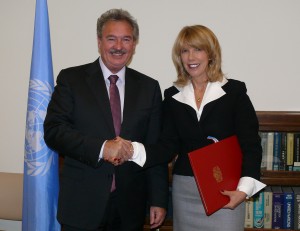 Luxembourg fourth country to ratify aggression amendments: On 15 January 2012, Jean Asselborn, Deputy Prime Minister & Minster of Foreign Affairs of Luxembourg, deposited the instruments of ratification with the Office of Legal Affairs of the United Nations. Luxembourg is the fourth country to have ratified the Kampala amendments on the crime of aggression and on war crimes (article 8), following Liechtenstein, Samoa and Trinidad and Tobago. It is however the first ICC State Party that has both ratified the amendments and implemented them into domestic legislation. Luxembourg’s criminal code and its code of criminal procedure were already revised in February 2012. Now, after four ratifications, 26 additional ratifications are needed before the jurisdiction of the International Criminal Court over the crime of aggression can be activated.
Luxembourg fourth country to ratify aggression amendments: On 15 January 2012, Jean Asselborn, Deputy Prime Minister & Minster of Foreign Affairs of Luxembourg, deposited the instruments of ratification with the Office of Legal Affairs of the United Nations. Luxembourg is the fourth country to have ratified the Kampala amendments on the crime of aggression and on war crimes (article 8), following Liechtenstein, Samoa and Trinidad and Tobago. It is however the first ICC State Party that has both ratified the amendments and implemented them into domestic legislation. Luxembourg’s criminal code and its code of criminal procedure were already revised in February 2012. Now, after four ratifications, 26 additional ratifications are needed before the jurisdiction of the International Criminal Court over the crime of aggression can be activated.
Please see the Luxembourg Ministry of Foreign Affairs’ press release (in English and French) for more information.
Photo: Deputy Prime Minister and Minister of Foreign Affairs of Luxembourg Jean Asselborn deposits instrument of ratification with United Nations Under-Secretary-General for Legal Affairs Patricia O’Brien. ©United Nations/Win Khine
NEWS: German Parliament (Bundestag) approves ratification of Kampala amendments
 German Parliament (Bundestag) approves ratification of Kampala amendments: The German Parliament’s lower house (Bundestag) unanimously approved the ratification of the Kampala amendments on the crime of aggression and on war crimes. The speakers in the debate stressed Germany’s historic legacy to prevent future crimes of aggression and thus favored a swift completion of the ratification process. One speaker highlighted the contribution of Liechtenstein and the Global Institute for the Prevention of Aggression. The ratification bill will now go to the upper house of Parliament (Bundesrat) and will then be signed by the President. The deposit of the ratification instrument at the United Nations is expected in early 2013. The full transcript of the reading in German is available here.
German Parliament (Bundestag) approves ratification of Kampala amendments: The German Parliament’s lower house (Bundestag) unanimously approved the ratification of the Kampala amendments on the crime of aggression and on war crimes. The speakers in the debate stressed Germany’s historic legacy to prevent future crimes of aggression and thus favored a swift completion of the ratification process. One speaker highlighted the contribution of Liechtenstein and the Global Institute for the Prevention of Aggression. The ratification bill will now go to the upper house of Parliament (Bundesrat) and will then be signed by the President. The deposit of the ratification instrument at the United Nations is expected in early 2013. The full transcript of the reading in German is available here.
Photo: © Bundestag/Lichtblick/Achim Melde
News: President of Senegal announces ratification
 President of Senegal announces ratification: At the opening of the 11th session of the ICC Assembly of States Parties in The Hague, the President of Senegal, Macky Sally, announced that his country will ratify the Kampala amendments on the crime of aggression. During the general debate, many other delegations stressed their commitment to ratify; these include Austria, Botswana, Chile, Croatia, Estonia, Germany, Luxembourg, Panama, Peru, Slovenia, Spain and Switzerland.
President of Senegal announces ratification: At the opening of the 11th session of the ICC Assembly of States Parties in The Hague, the President of Senegal, Macky Sally, announced that his country will ratify the Kampala amendments on the crime of aggression. During the general debate, many other delegations stressed their commitment to ratify; these include Austria, Botswana, Chile, Croatia, Estonia, Germany, Luxembourg, Panama, Peru, Slovenia, Spain and Switzerland.
Photo: President of Senegal, Macky Sally, speaking at the opening of the ASP in The Hague. ©ICC-ASP/Ikeda
Status of Ratification and Implementation of the Kampala Amendments on the Crime of Aggression
1 Information compiled from the questionnaire distributed by the Liechtenstein Mission, consultations with government officials, and from the mobilization of the members and the monitoring by the staff of Parliamentarians for Global Action (PGA). For queries, additions or corrections please contact joern.eiermann@nyc.llv.li.
I. Ratification
A. Ratifications registered with the Depositary of the Rome Statute (4 States Parties)
1. On 8 May 2012, Liechtenstein ratified, as the first country, the amendments on the crime of aggression together with the amendments on Article 8 (war crimes) adopted at the 2010 Review Conference of the Rome Statute of the ICC, held in Kampala, Uganda. The date chosen was highly symbolic, as it coincided with the commemoration of the end of World War II in Europe. The amendments will enter into force for Liechtenstein on 8 May 2013, while the Court’s jurisdiction over the crime of aggression can only be activated in 2017. In order to achieve this goal at least 30 States Parties will have ratify as early as possible, ideally by the end of 2015, and the Assembly of States Parties will have to decide to activate jurisdiction in 2017.
2. Since then, the following States have also ratified both Kampala amendments: Samoa (25 September 2012), Trinidad and Tobago (13 November 2012), Luxembourg (15 January 2013). Luxembourg is the first country having ratified and implemented the amendments.
B. Concrete progress
3. According to the information available, government or parliamentary officials in at least the following States Parties are currently actively working on the ratification of the amendments on the crime of aggression: Argentina, Australia, Austria, Belgium, Brazil, Botswana, Chile, Costa Rica, Croatia, Cyprus, Czech Republic, Dominican Republic, Ecuador, Estonia, Georgia, Germany, Greece, Italy, Lesotho, Malta, the Netherlands, Panama, Peru, Portugal, Romania, Senegal, Slovenia, Spain, Switzerland, and Uruguay. In Finland, Ghana, Guatemala, Japan, Latvia and Venezuela, the process is in its early stages.´
[…]
État de la ratification et de la mise en oeuvre des amendments de Kampala sur le crime d’agression
Estado de ratificación e implementación de las Enmiendas de Kampala sobre el Crimen de Agresión
International Criminal Justice Timeline
Download our more eleborate timeline
NEWS: 27 to go – Trinidad and Tobago ratifies crime of aggression amendments
 27 to go – Trinidad and Tobago ratifies crime of aggression amendments: On 13 November 2012, Trinidad and Tobago deposited its instrument of ratification of the Kampala amendments with the Office of Legal Affairs at the United Nations. Trinidad and Tobago is the third country that has ratified (after Liechtenstein and Samoa), 27 additional ratifications are still required for activation of the Court’s jurisdiction over the crime of aggression.
27 to go – Trinidad and Tobago ratifies crime of aggression amendments: On 13 November 2012, Trinidad and Tobago deposited its instrument of ratification of the Kampala amendments with the Office of Legal Affairs at the United Nations. Trinidad and Tobago is the third country that has ratified (after Liechtenstein and Samoa), 27 additional ratifications are still required for activation of the Court’s jurisdiction over the crime of aggression.
Photo: Ambassador Eden Charles and Ambassador Rodney Charles handing over the ratification instrument to Ms. Gabriele Goettsche-Wanli (Chief of the Treaty Section, OLA) ©United Nations
Handbook
Frequently Asked Questions
NEWS: Germany starts ratification process in parliament
Germany starts ratification process in parliament: All political parties of the German Bundestag welcomed the swift ratification of the Kampala amendments on the crime of aggression and on article 8 (war crimes) at their first reading on 18 October 2012. Spokespersons stressed that the amendments are a judicial milestone in international law and a historic opportunity, in particular important for Germany due to its history. Further information, please see the following news article in German and the official record of the reading.
NEWS: Huffington Post article about aggression
Huffington Post article about aggression: Sam Sasan Shoamanesh, Co-founder, Global Brief, and Head of the Counsel Assistance Unit of the ICC, writes that “It has cost humanity rivers of blood, destruction of Biblical proportions, untold suffering and irreparable losses of peoples — in whole or in part — over millennia to finally recognize in the 20th century that war of aggression constitutes in Robert H. Jackson’s eloquent words, the “supreme international crime differing only from other war crimes in that it contains within itself the accumulated evil of the whole.” Look up, what Shoamanesh writes about the Kampala review conference, the amendments and why the time to act is now.
News: Samoa ratifies crime of aggression amendments
 Samoa ratifies crime of aggression amendments: On 25 September 2012, Samoa deposited its instrument of ratification of the Kampala amendments with the Office of Legal Affairs at the United Nations. It is the second country to ratify them. 28 are still needed for activation of the Court’s jurisdiction over the crime of aggression. The Prime Minister assures that “Samoa is not a member of any military grouping and has no aspirations to become one. We do so because we place great faith in the rule of law and the vital protection that the law offers to all States, especially to the weak and small. From this perspective, we consider the International Criminal Court one of the most important developments in the affairs of the international community in the struggle against impunity ….”
Samoa ratifies crime of aggression amendments: On 25 September 2012, Samoa deposited its instrument of ratification of the Kampala amendments with the Office of Legal Affairs at the United Nations. It is the second country to ratify them. 28 are still needed for activation of the Court’s jurisdiction over the crime of aggression. The Prime Minister assures that “Samoa is not a member of any military grouping and has no aspirations to become one. We do so because we place great faith in the rule of law and the vital protection that the law offers to all States, especially to the weak and small. From this perspective, we consider the International Criminal Court one of the most important developments in the affairs of the international community in the struggle against impunity ….”
Photo: Prime Minister of Samoa, Tuilaepa Sa’ilele Malielegaoi, deposits ratification bill with United Nations Under-Secretary-General for Legal Affairs, Patricia O’Brien.
NEWS: 15 States report on progress in ratification process
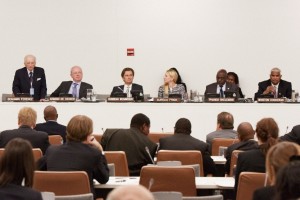 15 States report on progress in ratification process: At a side event to the high-level meeting on the rule of law on 24 September 2012, hosted by Liechtenstein Foreign Minister Aurelia Frick and featuring Nuremberg Prosecutor Ben Ferencz, 15 ICC States Parties reported about their progress in ratifying. See the meeting summary here.
15 States report on progress in ratification process: At a side event to the high-level meeting on the rule of law on 24 September 2012, hosted by Liechtenstein Foreign Minister Aurelia Frick and featuring Nuremberg Prosecutor Ben Ferencz, 15 ICC States Parties reported about their progress in ratifying. See the meeting summary here.

